
GIÁO HỘI HIỆN THẾ
2018
ĐỨC THÁNH CHA PHANXICÔ
TÔNG DU CHILE và PERU 15-22/1/2018
(Chuyến Tông Du thứ 22 và là chuyến thứ 6 về Mỹ Châu Latinh)
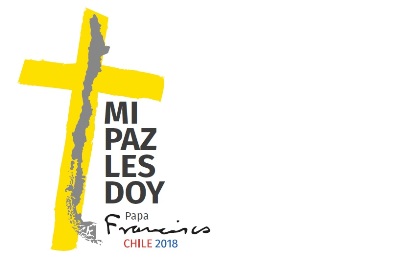 |
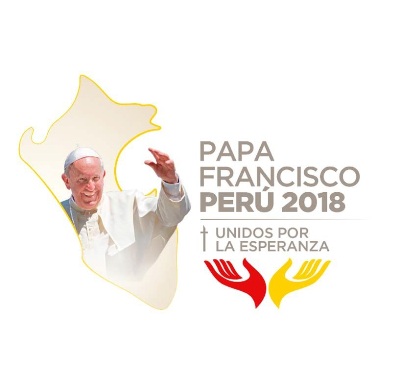 |
Peru sau Roma 6 tiếng và trước Los Angeles 3 tiếng
(Hai nước Chile và Peru đều ở bờ duyên hải phía Tây của Nam Mỹ Châu, Chile ở dưới Peru và sát với Á Căn Đình)
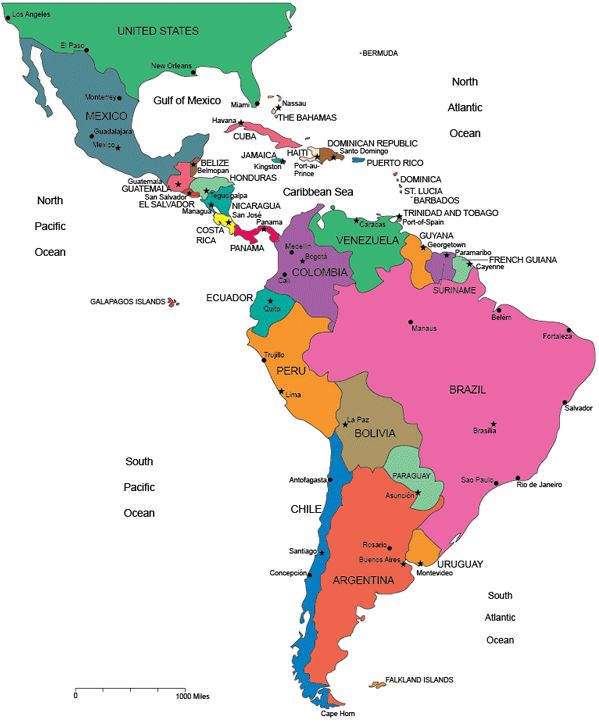
Bắt đầu từ chuyến Tông Du này, nhờ phương tiện truyền thông càng ngày càng hiện đại hóa,
Kitô hữu khắp nơi trên thế giới vẫn có thể theo dõi từng sinh hoạt mục vụ của Đức Thánh Cha đương kim của mình
chẳng những qua bài nói cùng một số hình ảnh tiêu biểu mà nhất là qua các đoạn hình quay (video) từ đầu đến cuối từng biến cố.
Ở đây chỉ xin chuyển dịch sang Việt ngữ một số đoạn chính yếu tiêu biểu mà thôi, ở dưới cuối của từng ngày.
Đaminh Maria Cao Tấn Tĩnh, BVL, tổng hợp và tuyển dịch
NGÀY 24/1 THỨ TƯ
(ĐTC Phanxicô tóm lược chuyến tông du trong buổi triều kiến chung Thứ Tư 24/1/2018)
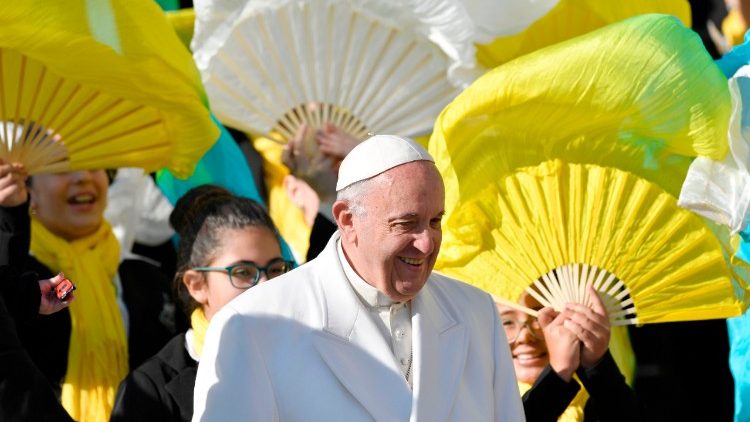
Dear brothers and sisters: In my recent Apostolic Journey to Chile and Peru,
I had the joy of encountering God’s pilgrim people and encouraging the
growth of social harmony in respect for the rich diversity of those nations.
In Chile, I stressed the importance of listening to the voices of all: the
poor, the young and the elderly, the immigrant and the voice of the earth
itself. I encouraged the Church in its path of purification and
renewal, and, appealing to the example of Saint Alberto Hurtado, I
encouraged educators to help the young to share in the building of a just
and inclusive society. In Peru, I expressed my confidence that the
nation’s environmental, spiritual and cultural riches can contribute to to
building unity and cooperation in meeting the grave challenges facing
society. In my meeting with the Amazonian peoples, I stressed the
importance of mutual respect and care for the natural environment. In
Trujillo, hard hit by natural disasters, I invited all to work together in
confronting the social problems of crime and the lack of education,
employment and housing. In Lima, I concluded my visit to these two
countries by appealing to the example of the saints and asking their
intercession as the Church pursues the path of conversion and mission, and
strives to be a messenger of unity, hope and peace for all peoples.
NGÀY 22/1 THỨ HAI
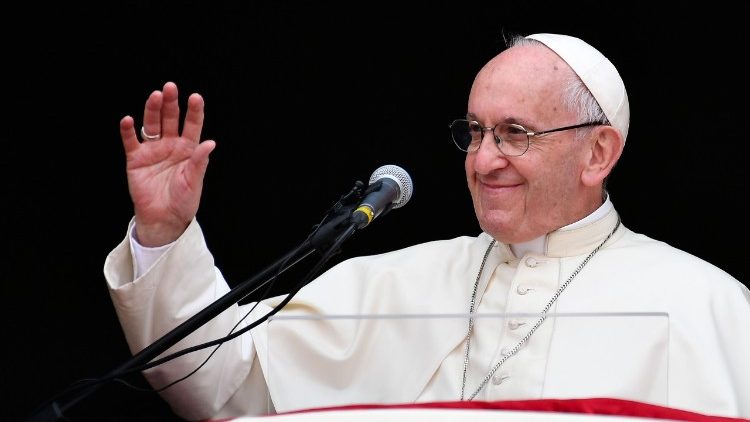
14:15 - ĐTC về tới Roma và đến Đền Thờ Đức Bà Cả ngay để tạ ơn Đức Mẹ
Phỏng Vấn Truyền Thông trên chuyến bay
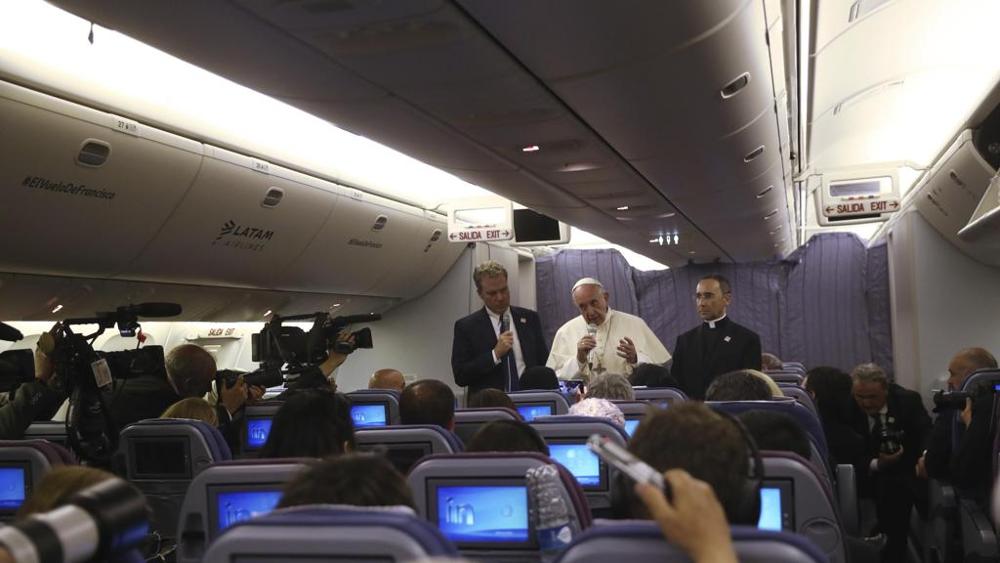
Vấn: Vào ngày đầu tiên ở Chí Lợi, Đức Thánh Cha đã tung ra một sứ điệp mạnh mẽ chống lại việc lạm dụng trẻ em. Thế nhưng sau đó Đức Thánh Cha đã phát biểu về Đức Giám Mục Barros, khi nói đến "vấn đề vu khống (calunmy)". Tại sao Đức Thánh Cha không tin tưởng các nạn nhân mà lại tin Barros chứ?
Đáp: Ở Chí Lợi, tôi đã nói 2 lần về vấn đề lạm dụng: một lần trước chính quyền và một lần với các vị linh mục ở vương cung thánh đường. Tôi vẫn tiếp tục chính sách bất dung nhượng (zero-tolerance) được khởi sự từ Đức Benedict XVI. Và trong 5 năm tôi đã không ký một yêu cầu xin ân xá nào. Nếu trường hợp thứ hai củng cố trường hợp thứ nhất thì chỉ còn cách xin Giáo Hoàng ân xá. Trong 5 năm, tôi đã nhận được 25 yêu cầu xin ân xá. Tôi chưa từng ký một cái nào. Về trường hợp của giám mục Barros: tôi đã nghiên cứu trường hợp này, đã điều tra nó. Thực sự là không có minh chứng lỗi phạm. Tôi xin được minh chứng rõ ràng để thay đổi chủ trương của tôi. Ở Iquique, khi họ hỏi tôi về giám mục Barros, tôi đã nói rằng: "ngày nào tôi có bằng chứng thì tôi mới nói". Tôi đã sai khi sử dụng chữ "proof" (bằng chứng), mà đáng lẽ tôi nên nói là "evidence" (minh chứng - chứng cớ rõ ràng). Tôi biết rằng nhiều người bị lạm dụng không thể nào trưng bằng chứng (proof). Họ không có hay không thể có, hay nếu họ có chăng nữa, họ cũng cảm thấy xấu hổ về chúng: thảm trạng của các nạn nhân bị lạm dụng thật là kinh khiếp. Tôi bất ngờ gặp một người nữ bị lạm dụng 40 năm trước, đã lập gia đình và sinh được 3 đứa con, một người nữ không rước lễ vì bà thấy nơi bàn tay của vị linh mục bàn tay của kẻ đã lạm dụng bà. Chữ "bằng chứng" (proof) không phải là chữ đúng nhất, tôi đáng lẽ phải nói là "minh chứng" (evidence) mới phải. Nơi trường hợp của giám mục Barros, tôi đã nghiên cứu đi nghiên cứu lại, vẫn không có minh chứng nào để lên án ngài. Mà nếu tôi cứ lên án ngài một cách thiếu minh chứng hay việc nắm chắc về luân lý thì tôi phạm một tộc ác phán đoán xấu mất rồi.
Vấn: Một trong những bức thư Đức Thánh Cha gửi cho các vị giám mục Chí Lợi đã được công khai hóa. Trong bức thư này có đề cập đến chuyện Barros có thể nghỉ 1 năm...
Đáp: Tôi cần phải giải thích bức thư ấy cho bạn, vì nó có tính cách khôn ngoan và nói về một trường hợp 10-12 tháng dài. Khi gương mù của Karadima bùng ra thì chúng ta mới thấy biết bao nhiêu là linh mục được giám hộ bởi vị này, đã bị vị này lạm dụng hay đã thực hiện việc lạm dụng. Có 3 vị giám mục ở Chí Lợi được Karadima gửi vào chủng viện. Một số trong Hội Đồng Giám Mục đã đề nghị rằng họ từ bỏ, lấy một năm nghỉ phép (a sabbatical year) để cho bão tố qua đi: họ là những vị giám mục tốt lành, tốt lành, như giám mục Barros là vị đã có 20 năm làm giám mục và sắp kết thúc trách vụ của mình như kiểu quân đội vậy. Đã bàn đến chuyện xin ngài từ nhiệm. Ngài đã đến Roma và tôi đã từ chối, vì làm như thế có nghĩa là thừa nhận một thứ đổ tội. Tôi đã không chấp nhận việc đổ tội này. Thế rồi, khi ngài được bổ nhiệm đến Osorno thì xẩy ra chuyện chống đối, tôi lại nhận đơn xin từ nhiệm của ngài lần thứ hai. Tôi cũng vẫn từ chối, huynh cứ tiếp tục! Giám mục Barros tiếp tục bị điều tra, nhưng chẳng có minh chứng nào hết. Tôi không thể lên án ngài, tôi không có minh chứng gì cả, và tôi tin rằng ngài vô tội.
Vấn: Thế còn phản ứng của thành phần nạn nhân về các phát biểu của Đức Thánh Cha thì sao?
Đáp: Tôi cần phải xin lỗi về những gì nạn nhân bị lạm dụng cảm thấy. Chữ "bằng chứng" đã khiến nhiều người trong họ bị tổn thương. Họ nói rằng: phải chăng tôi muốn có một thứ giấy chứng (a certification)? Tôi xin lỗi họ nếu tôi vô tình làm họ bị tổn thương, tôi không hề có ý làm vậy. Tôi cảm thấy rất đớn đau vì tôi đã gặp họ: ở Chí Lợi có 2 cuộc gặp gỡ đều được quần chúng biết đến, còn các cuộc gặp gỡ khác trong âm thầm kín đáo. Trong mỗi chuyến đi bao giờ cũng có dịp để gặp gỡ các nạn nhân, cuộc gặp ở Philadelphia đã trở thành công khai, còn có các lần khác nữa. Việc nghe thấy Giáo Hoàng nói với họ rằng: "trình cho tôi một chứng thư là một cái tát tai". Tôi nhận thức rằng lời tôi diễn tả không được chỉnh lắm, và tôi hiểu, như Thánh Phêrô đã viết một trong các bức thư của ngài, là ngọn lửa đã bùng lên. Đó là những gì tôi có thể thành thực mà nói.
Vấn: Chẳng lẽ chứng từ của các nạn nhân không phải là một minh chứng đối với Đức Thánh Cha hay sao?
Đáp: Chứng từ của các nạn nhân bao giờ cũng là minh chứng. Nơi trường hợp của giám mục Barros thì lại chẳng có minh chứng lạm dụng...
Vấn: Thế nhưng việc tố cáo ở đây không phải là chuyện lạm dụng mà là chuyện bao che cho những việc lạm dụng....
Đáp: Cũng chẳng có minh chứng gì về chuyện này nữa... Tôi sẵn sàng tiếp nhận chúng.
Vấn: Đức Thánh Cha phản ứng ra sao đối với lời phát biểu của ĐHY O'Malley về chữ "vu khống" của Đức Thánh Cha liên quan đến trường hợp Barros đã gây tổn thương cả thể cho các nạn nhân ra sao?
Đáp: ĐHY O'Malley đã nói rằng Đức Giáo Hoàng luôn áp dụng chính sách bất khoan dung... Thế rồi xẩy ra chuyện "việc sử dụng chữ nghĩa tệ hại", tôi đã nói đến "vấn đề vu khống", để nói về một ai đó cứ ngoan cố nói một điều gì đó mà chẳng có minh chứng gì hết. Nếu tôi nói bạn đã ăn trộm, mà bạn không ăn trộm, thì tôi đang phỉ báng bội nhọ bạn bởi tôi chẳng có minh chứng gì về nó. Đó là một diễn tả không may. Thế nhưng tôi chưa hề nghe thấy nơi bất cứ nạn nhân nào của Barros. Họ không ra mặt, họ không xuất hiện, họ không có minh chứng ở tòa. Tất cả đều cứ lửng lơ như vậy. Quả thực giám mục Barros là một trong nhóm giới trẻ của Karadima. Thế nhưng chúng ta cần phải rõ ràng: nếu bạn cố chấp tố cáo một ai đó mà không có minh chứng thì đó là chuyện vu khống. Tuy nhiên, nếu một ai đó đến cống hiến cho tôi minh chứng, tôi sẽ là người đầu tiên lắng nghe họ. Lời phát biểu của ĐHY O'Malley rất đúng, tôi xin cám ơn ngài. Ngài đã nói về nỗi đớn đau của chung các nạn nhân.
Vấn: Ủy Ban Vatican Về Việc Bảo Vệ Trẻ Em đã hết hạn. Như thế có nghĩa là ủy ban này không còn là một ưu tiên nữa có phải không?
Đáp: Tiểu ban này đã được chỉ định làm việc trong vòng 3 năm. Một khi nó hết hạn thì một tiểu ban mới sẽ được nghiên cứu. Việc canh tân vai trò làm phần tử và việc chỉ định các phần tử mới đã được giải quyết rồi. Danh sách cuối cùng đã được gửi đến trước khi bắt đầu chuyến tông du này, và giờ đây nó sẽ được tiến hành theo thủ tục bình thường của Giáo Triều Roma. Chúng tôi đang xem xét các tờ lý lịch nghiệp vụ (resume). Có một số điều ghi nhận cần phải được làm sáng tỏ. Thế nhưng tôi không nghĩ rằng chúng ta sẽ không làm điều này ... đó là những thời gian bình thường cần phải có thôi.
Vấn: Đức Thánh Cha đáp ứng ra sao đối với những ai cho rằng chuyến viếng thăm Chí Lợi của Đức Thánh Cha là một thất bại, đối với một ít người cũng như đối với sự kiện là Giáo Hội càng chia rẽ hơn trước?
Đáp: Đây là lần đầu tiên tôi nghe thấy điều ấy. Tôi cảm thấy vui về chuyến đi Chí Lợi này, tôi đã không mong rằng sẽ có nhiều người ở ngoài đường phố, và những con người ấy chẳng để ý gì tới chuyện tới này!
Vấn: Sau cuộc hôn nhân của người quản gia và bà chủ ở trên máy bay, Đức Thánh Cha sẽ nói sao với các vị linh mục ở giáo xứ khi có những cặp muốn thành hôn trên máy bay hay trên tầu?
Đáp: "Phải chăng bạn đang nghĩ đến các chuyến du thuyền kết hôn?" Một người trong quí vị đã bảo tôi rằng tôi có điên không mà làm những điều như thế. Đơn giản thôi. Người nam ấy (Carlo Ciuffardi, tên gọi này được vị chủ bút phổ biến bài phỏng vấn này ghi chú thêm) đã dự phần vào chuyến bay một ngày trước. Chị ta (Paula Podest, cũng vị chủ bút cho biết rõ) thì lại không. Anh ta đã nói chuyện với tôi. Tôi nhận thấy rằng anh ta đang thử tôi... đó là một cuộc nói chuyện tốt đẹp. Ngày hôm sau cả hai đều ở đó và khi chúng ta chụp hình thì họ đã nói với tôi rằng họ đã lấy nhau ở tòa đời, và 8 năm trước đáng lẽ họ đã lấy nhau ở giáo xứ rồi, nhưng nhà thờ bị sập bởi trận động đất xẩy ra ngay hôm trước lễ thành hôn. Thế là chẳng có hôn nhân hôn phối gì cả. Họ nói rằng chúng tôi sẽ thực hiện việc này ngày mai, ngày kia. Thế rồi đời sống trôi qua, một đứa con gái ra đời, rồi lại một đứa nữa. Tôi đặt vấn đề với họ và họ đã nói với tôi rằng họ đã hoàn thành khóa dự bị hôn nhân. Theo tôi thì họ đã sửa soạn đàng hoàng. Các bí tích là để cho con người, tất cả mọi điều kiện đã xong. Thế thì tại sao không làm những gì có thể làm ngay hôm nay đây chứ? Việc chờ đợi đến ngày mai có thể sẽ phải đợi đến 10 năm nữa. Cả hai đã dọn mình trước Chúa bằng bí tích thống hối. Họ đã nói với tôi rằng họ đã báo trước cho một số trong các bạn ý định của họ là "chúng tôi đến gặp Đức Giáo Hoàng để xin ngài làm phép hôn phối cho chúng tôi". Tôi không biết điều này có đúng hay chăng. Hãy nói với các vị linh mục giúp xứ rằng Đức Giáo Hoàng đã xin họ đàng hoàng, đó là một trường hợp bình thường thôi.
Vấn: Đức Thánh Cha cảm thấy thế nào từ chuyến đi này?
Đáp: Đó là cái cảm tưởng về một thành phần dân chúng đã trải qua và vẫn còn đang trải nghiệm nhiều khó khăn, nhưng lại có một đức tin gây ấn tượng nơi tôi. Một thành phần dân đã thể hiện niềm vui và đức tin của mình. Họ là một mảnh đất "insantata", thành phần dân chúng Mỹ Châu Latinh có các vị thánh hơn. Ở Peru tôi cảm giác thấy được niềm vui, đức tin, niềm hy vọng, nhất là tôi đã thấy được nhiều trẻ em! Cùng một hình ảnh tôi đã thấy ở Phi Luật Tân và Colombia: những người làm cha làm mẹ nâng cao con cái của mình lên... Điều này nói về tương lai, về niềm hy vọng. Xin hãy bảo toàn kho tàng này.
Đaminh Maria Cao Tấn Tĩnh, BVL, tuyển dịch
NGÀY 21/1 CHÚA NHẬT
(xin bấm vào các cái links mầu xanh để xem hình ảnh, hình quay / video và văn tự bài nói bằng tiếng Anh)
9:15 - Kinh Nguyện Giữa Ngày với Các Nữ Tu Chiêm Niệm ở Limaʼs Lord of the Miracles Shrine
Mid-Day Prayer with Contemplative Women Religious
10:30 - Cầu nguyện trước hài tích của các thánh người Peru ở Vương Cung Thánh Đường Lima
| Prayer before the relics of the Peruvian Saints |
10:50 - Gặp gỡ các vị giám mục Peru ở Nhà Tổng Giám Mục
Meeting with the Peruvian Bishops
12:00 - Nguyện Kinh Truyền Tin ở Quảng Trường “Plaza de Armas”
Angelus Prayer (được chuyển dịch sang Việt Ngữ)
12:30 - Bữa trưa với đoàn tháp tùng giáo hoàng ở Tòa Khâm Sứ
16:15 - Thánh Lễ ở Las Palmas Air Base
18:30 - Chào biệt Peru
18:45 - Bay về lại Roma
Kinh Nguyện Giữa Ngày với Các Nữ Tu Chiêm Niệm
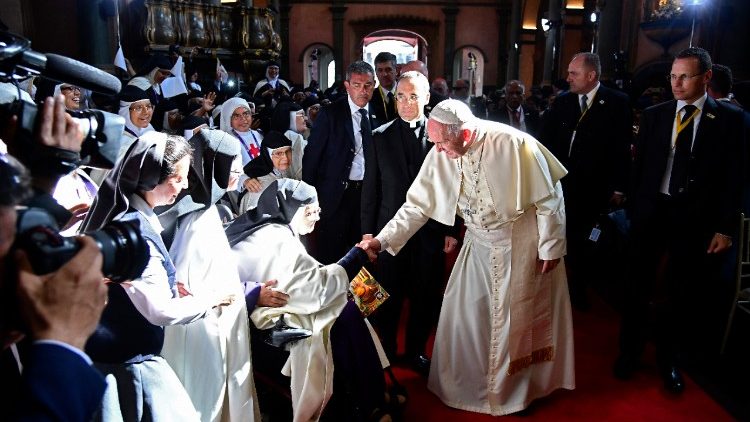
Dear Sisters from different monasteries of contemplative life:
How good it is to be here in this Shrine of the Lord of Miracles, visited so often by Peruvians, to ask his grace so that he will show us his closeness and mercy! He is “the light that guides, that illumines us with his divine love”. Seeing you here, I have a bad thought: that you took advantage of this visit to get out for some fresh air! [Applause] Mother Soledad, I thank you for your words of welcome, and I thank all of you, who “from the silence of the cloister walk ever by my side”. Also – this you will allow me to say as it touches my heart – from this place I send a greeting to my four Carmels in Buenos Aires. I want to also put them before the Lord of Miracles, because they accompanied me in my ministry in that Diocese, and I want them to be here to receive the Lord’s blessing. You are not jealous? [They reply: “No”]
We have listened to the words of Saint Paul and been reminded that we have received the Spirit of filial adoption that makes us children of God (cf. Rom 8:15-16). Those few words sum up the richness of every Christian vocation: the joy of knowing we are God’s children. This is the experience that nourishes our lives, that seeks always to be a pleasing response to God’s love. How important it is to renew this joy day by day! Above all, during those moments when joy seems to have gone or the soul is burdened under a cloud or there are things we don’t understand; from there ask the Lord again to renew the gift: “I am a daughter, a daughter of God”.
A privileged path that you have for renewing this conviction is the life of prayer, both communal and individual. Prayer is the heart of your consecrated life, your contemplative life, and the means of cultivating the experience of love that sustains our faith and, indeed as Mother Soledad rightly said, it is always a missionary prayer. It is not a prayer that bounces off the walls of the convent and comes back. No, it is a prayer that goes forth and up and up…
Missionary prayer makes us one with our brothers and sisters in whatever situations they find themselves, and asks that love and hope will never fail them. This is what Saint Thérèse of the Child Jesus said: “I understood that it is love alone which prompts the members of the Church to act and, if there is no love, neither would the Apostles proclaim the Gospel, nor would the martyrs spill their blood. I recognized clearly and I was certain that love subsumes in itself all vocations, that love is everything, encompassing all times and places, in a word, that love is eternal… in the heart of the Church, who is my Mother, I will be love”.[1] Oh that each of you could say this. If any of you are weary and the small flame of love seems to have been extinguished, ask him, ask him! To love is a gift of God.
To be love! This means being able to stand alongside the suffering of so many of our brothers and sisters, and to say with the Psalmist: “In my distress I called upon the Lord; the Lord answered me and set me free” (Ps 117:5). In this way, your cloistered life can attain a missionary and universal outreach and play “a fundamental role in the life of the Church. You pray and intercede for our many brothers and sisters who are prisoners, migrants, refugees and victims of persecution. Your prayers of intercession embrace the many families experiencing difficulties, the unemployed, the poor, the sick, and those struggling with addiction, to mention just a few of the more urgent situations. You are like those who brought the paralytic to the Lord for healing (cf. Mk 2: 1-12)”. They were not ashamed, they were “without shame”, and well said. There were not ashamed to make a hole in the roof to lower down the paralytic. Be “not ashamed” to bring before the power of God, through your prayers, the miseries of mankind. That is your prayer. “Through your prayer, night and day, you bring before God the lives of so many of our brothers and sisters who for various reasons cannot come to him to experience his healing mercy, even as he patiently waits for them. By your prayers, you can heal the wounds of many”.[2]
For this very reason, we can state that cloistered life neither closes nor shrinks our hearts, but rather widens them. Woe to the nun that has a closed heart. Please find the remedy – you cannot be a contemplative nun with a closed heart – so that you can breathe again, that you may once more have a great heart. Moreover, nuns with closed hearts are nuns who have lost fruitfulness and are not mothers. They complain about everything, I’d say they are bitter, always looking for “scrupulous details” to moan about. The holy Mother used to say: “Woe to the nun who says ‘they harmed me without reason’, ‘they have acted unjustly against me’”. In the convent there is no room for collectors of injustices rather there is room for those who open their hearts and know how to carry the cross that bears fruit, the cross of love, the cross which brings life. Love expands the heart and thus we can move forwards with the Lord because he makes it possible to feel in a new way the pain, the suffering, the frustration and the misfortune of so many of our brothers and sisters who are victims of today’s “throwaway culture”. May intercession for those in need be the hallmark of your prayer. With your arms outstretched, like Moses, with the heart open in this way, imploring. And whenever possible, help them not only by prayer, but also by concrete service. How many of your convents, without infringing the cloistered element, and respectful of silence, are able to do so much good during those moments in the visiting room.
The prayer of supplication that takes place in your monasteries is attuned to the Heart of Jesus, which pleads to the Father that we may all be one, so that the world will believe (cf. Jn 17:21). How much we need unity in the Church! May all be one. How much we need the baptized to be one, consecrated persons to be one, priests to be one, bishops to be one! Today and always! United in faith. United by hope. United by love. In the unity that wells up from our communion with Christ, who unites us to the Father in the Spirit, and, in the Eucharist, unites us with one another in that great mystery which is the Church. I ask you, please, to pray constantly for unity in this beloved Church in Peru because it is experiencing the temptation against unity. I entrust this unity to you, the unity of the Church, the unity of pastoral workers, of consecrated men and women, of the clergy and of bishops. The devil is a liar and, what is more, he is a gossip, he loves going from one place to the other, seeking to divide, and he wants members of a community to speak badly of each other. I have said this many times, and will repeat it here: Do you know what a gossiping nun is like? She is a terrorist, worse than those of Ayacucho years ago, worse, because gossip is like a bomb. The terrorist just like the devil goes in whispering and murmuring, throws the bomb, destroys and calmly walks off. No to terrorist nuns, no to gossip. You know the best remedy against gossip? Bite your tongue. The infirmary sister will have a lot of work because there will be swollen tongues but at least bombs will not be thrown. In other words, there must not be gossiping in the convent, because this is instigated by the devil, for he is a gossip by nature and a liar. And remember the terrorists of Ayacucho when you feel like passing on a piece of gossip.
Strive to grow in the fraternal life, so that every monastery can be a beacon of light in the midst of disunity and division. Help bear prophetic witness that this is possible. May all who draw near to you have a foretaste of the blessedness of the fraternal charity so essential to the consecrated life and so necessary in today’s world and in our communities.
When we live our vocation faithfully, our life becomes a proclamation of God’s love. I ask you never to stop giving that witness. In this Church of the Discalced Carmelite Nazarenes, I readily recall the words of the great spiritual teacher, Saint Teresa of Jesus: “If you lose your guide, who is the good Jesus, you will not get the journey right…”. Always behind him: and yet you might say to me, ‘but father sometimes Jesus ends up on Calvary’. Well, I answer, you go there too, for he waits for you there also because he loves you, “for the same Lord says he is the way; the Lord also says he is the light, and that no one can come to the Father except through him”.[3]
Dear sisters, know one thing, the Church does not tolerate you, she needs you. The Church needs you, with your lives of fidelity be beacons, and keep pointing to the One who is the way, and the truth and the life, to the one Lord who brings us fulfilment and grants us life in abundance.[4]
Pray for the Church, pray for priests and bishops, for consecrated men and women, for families, for those who suffer, for those who harm others and destroy the lives of many people, for those who exploit their brothers and sisters. And please, following the list of sinners, do not forget to pray for me.
[1]Autobiographical manuscripts: Letter to Sister Marie of the Sacred Heart (8 September 1896), Ms. B [3v.].
[2] Apostolic Constitution Vultum Dei Quaerere on women’s contemplative life (29 June 2016), 16.
[3]The Interior Castle, VI, ch. 7, no. 6.
[4] Cf. Apostolic Constitution Vultum Dei Quaerere on women’s contemplative life (29 June 2016), 6.
Cầu nguyện trước hài tích của các thánh người Peru
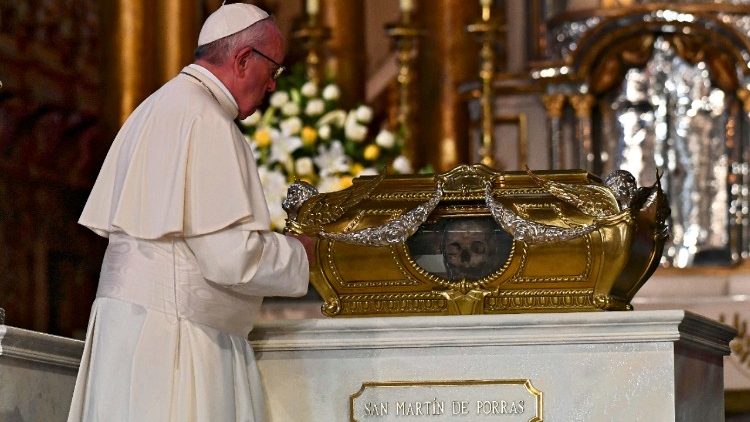
God our Father,
through Jesus Christ
you founded your Church
on the rock of the Apostles,
that, guided by the Holy Spirit,
she may be a sign and instrument
of your love and mercy in the world:
we thank you for the gifts you have
bestowed upon our Church in Lima.
We thank you in a special way
for the holiness that has flourished in our land.
Our Archdiocesan Church has been made fruitful
by the apostolic labours of Saint
Turibius of Mogrovejo,
enlarged by the prayer, penance and charity
of Saint Rose of Lima and Saint Martin de
Porres,
adorned by the missionary zeal of Saint
Francisco Solano
and the humble service of Saint Juan
Macías.
It has been blessed by the witness of Christian life and fidelity to the
Gospel
of many others of our brothers and sisters.
We give you thanks for all that you have accomplished in our history
and we ask you to keep us faithful to the heritage we have received.
Help us to be a Church that goes forth,
drawing near to all, especially the less fortunate.
Teach us to be missionary disciples
of Jesus Christ, the Lord of Miracles,
living in love, seeking unity
and practising mercy,
so that, protected by the intercession
of Our Lady of Evangelization,
we may live the joy of the Gospel
and proclaim it before the world.
http://www.vaticannews.va/en/pope/news/2018-01/peru-journey-prayer-before-relics.html
Gặp gỡ các vị giám mục Peru ở Nhà Tổng Giám Mục
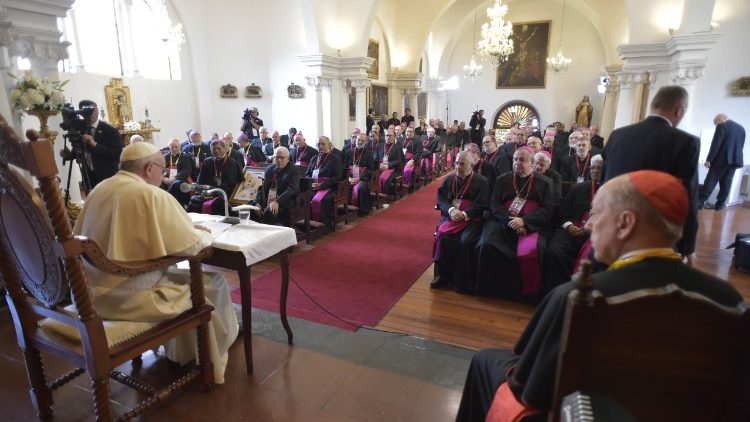
Dear Brother Bishops,
Thank you for the kind words addressed to me by the Cardinal Archbishop of Lima and the President of the Episcopal Conference in the name of all present. I have looked forward to being here with you. I recall with pleasure your visit ad limina last year.
These days I have spent among you have been very intense and gratifying. I have been able to learn about and experience the different realities that shape these lands and to share at first hand the faith of God’s holy and faithful people, which does us so much good. Thank you for the opportunity to “touch” the faith of the people that God has entrusted to you.
The theme of this Visit speaks to us of unity and hope. This is a demanding yet exciting programme, which makes us think us of the heroic accomplishments of Saint Turibius of Mogrovejo, archbishop of this see and patron of the Latin American episcopate, an example of a “builder of ecclesial unity”, as my predecessor, Saint John Paul II described him during his first Apostolic Visit to this land.[1]
It is significant that this holy bishop is frequently portrayed as a “new Moses”. As you know, the Vatican has a picture in which Saint Turibius appears crossing a great river whose waters open before him like the Red Sea, so that he could get to the other shore, where a numerous group of natives awaited him. Behind Saint Turibius is a great crowd, representing the faithful people who follow their shepherd in the task of evangelization.[2] This beautiful image can serve to anchor my reflection with you. Saint Turibius, the man who wanted to get to the other shore.
We see him from the time in which he accepted the mandate to come to these lands with the mission to be a father and a shepherd. He left the security of familiar surroundings in order to enter a completely new universe, unknown and filled with challenges. He journeyed towards a promised land guided by faith as “the assurance of things hoped for” (Heb 11:1). His faith and his trust in the Lord impelled him, then and for the rest of his life, to get to the other shore, where the Lord himself was waiting for him in the midst of a great crowd.
And please, do not forget to pray for me.
[1] Address to the Peruvian Bishops (2 February 1985), 3.
Nguyện Kinh Truyền Tin
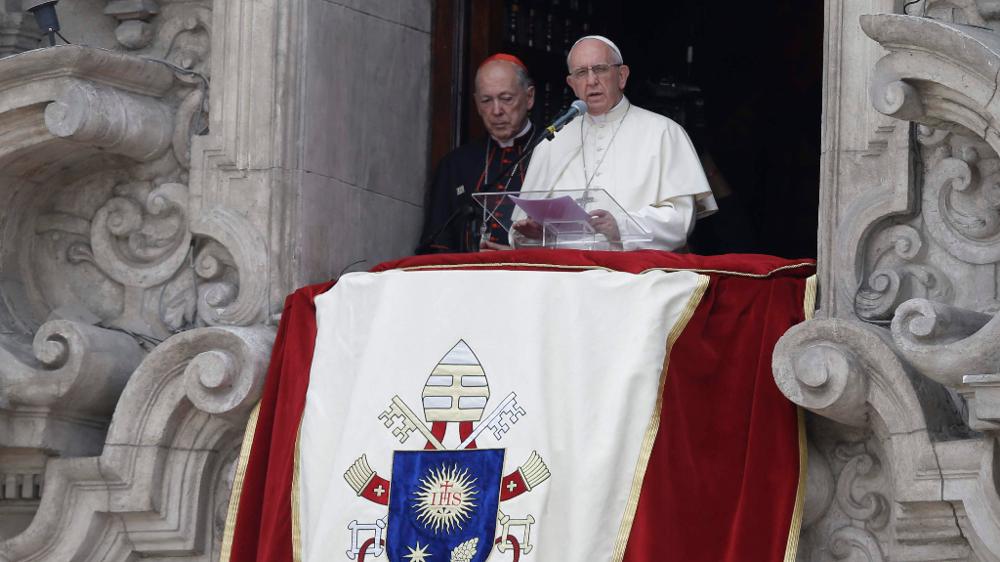
Giới trẻ thân mến, tôi hân hoan ở nơi đây với các bạn. Những cuộc gặp gỡ này rất quan trọng đối với tôi, nhất là trong năm sửa soạn Thượng Nghị Giám Mục Thế Giới về giới trẻ. Gương mặt của các bạn, các vấn nạn của các bạn và đời sống của các bạn là những gì quan trọng đối với Giáo Hội, và chúng ta cần giành cho nó tầm quan trọng xứng đáng. Chúng ta cũng cần đến lòng can đảm của nhiều giới trẻ của đất nước này, thành phần không sợ yêu thương và liều mạng vì Chúa Giêsu.
Các bạn thân mến, các bạn có bao nhiêu là mẫu gương! Tôi nghĩ đến Thánh Martin de Porres. Không gì có thể ngăn cản được con người trẻ này chiếm đạt được các giấc mơ của mình, không gì có thể ngăn cản được chàng sống cuộc đời cho người khác, không gì có thể ngăn cản được chàng yêu thương, và chàng đã làm như thế vì đã nhận ra rằng Chúa là Đấng đã yêu thương chàng trước. Chỉ vì chàng là một đứa con lai bố trắng mẹ đen (mulato). Chàng đã phải đối mặt với nhiều khốn khó. Trong con mắt của những kẻ khác, thậm chí là bạn hữu của mình, thì dường như chàng đã mất hết tất cả, thế nhưng chàng vẫn biết thực hiện một điều duy nhất, được cho là bí quyết của đời chàng, đó là chàng biết tin tưởng. Tin tưởng vào Chúa là Đấng đã yêu thương chàng. Các bạn có biết tại sao hay chăng? Vì Chúa đã tin tưởng vào chàng trước; như Ngài tin tưởng mỗi một người trong các bạn và sẽ không thôi tin tưởng các bạn. Chúa đã ký thác cho từng người chúng ta một điều gì đó và việc đáp ứng đó là lòng tin tưởng vào Ngài. Mỗi người trong các bạn hãy suy nghĩ trong lòng xem: "Chúa đã ủy thác cho tôi điều gì?" Nào hết mọi người hãy suy nghĩ xem: "Chúa đã ủy thác trong lòng của tôi điều gì?"
Các bạn có thể nói rằng điều này đôi khi rất khó. Tôi biết chứ. Trong những lúc ấy, chúng ta có thể nẩy lên những ý nghĩ tiêu cực, chúng ta có thể cảm thấy bị chới với trước những trạng huống khác nhau, và dường như chúng ta bị "tống ra khỏi giải vô địch thế giới", trong khi những trạng huống ấy phỗng tay trên chúng ta. Thế nhưng, không phải thế đâu, cho dù ở những lúc chúng ta bị quật ngã, hãy cứ tiếp tục tin tưởng.
Có những lúc các bạn cảm thấy bất lực trong việc chiếm đạt các ước muốn và mộng ước của mình. Tất cả chúng ta đều cảm thấy những trường hợp như thế. Vào những niềm tin của chúng ta dường như bị phai nhòa, thì hãy nhớ rằng Chúa Giêsu đang ở bên các bạn. Đừng bỏ cuộc! Đừng mất hy vọng! Hãy nhớ rằng các vị thánh từ trời đang đồng hành với chúng ta. Hãy đến với các vị, hãy cầu xin và đừng bao giờ thôi xin các vị chuyển cầu. Chẳng những các vị thánh trong quá khứ mà còn cả những vị hiện nay nữa: đất nước này có nhiều vị, vì nó là một đất nước của các thánh nhân. Peru là một đất nước của các thánh nhân. Hãy xin các vị trợ giúp và hãy tham vấn với những ai các bạn cảm thấy có thể cống hiến cho các bạn những lời khuyên tốt đẹp, vì gương mặt của họ tỏa rạng niềm vui và an bình. Hãy để họ đồng hành với các bạn khi các bạn hành trình trên con đường sống.
Thế nhưng vẫn còn một điều khác nữa, Chúa Giêsu muốn thấy các bạn năng động. Người muốn thấy các bạn đạt được các lý tưởng của các bạn và nhiệt tình theo đưổi những dẫn dắt của Người. Người sẽ đưa các bạn đi theo con đường các mối phúc đức, một con đường không dễ đi nhưng hào hứng, một con đường không thể hành trình một mình, nó cần phải hành trình như là một đội ngũ, trong đó mỗi phần tử góp phần những gì là tốt nhất của mình. Chúa Giêsu cậy dựa vào các bạn như trước đây đã lâu Người cậy dựa vào Thánh Rosa Lima, Thánh Turibius, Thánh Juan Macias, Thánh Phanxicô Solano và nhiều vị khác. Hôm nay đây, như các vị, Người hỏi các bạn rằng các bạn có sẵn sàng theo Người hay chăng? [Họ đáp: "Thưa có"]. Hôm nay, ngày mai, các bạn có sẵn lòng theo Người hay chăng? [Họ đáp: "Dạ có"]. Trong vòng 1 tuần thì sao? ["Thưa có"] Đừng quá tự tin. Nếu các bạn muốn theo Người thì hãy xin Người dọn lòng các bạn để sẵn sàng theo Người nhé. Rõ ràng chưa?
Các bạn thân mến, Chúa hy vọng nhìn tới các bạn. Người không bao giờ thất vọng nơi chúng ta. Đôi khi chúng ta cảm thấy thất vọng với một người bạn mà chúng ta cứ tưởng là tốt rồi sau đó chúng ta thấy được một điều gì đó không tốt cho lắm và chúng ta bị thất vọng để rồi loại trừ người đó đi. Chúa Giêsu không bao giờ thất vọng, không bao giờ. "Thưa cha, nếu cha biết những điều con làm, con nói thế này mà làm thế kia, đời sống của con không hoàn toàn sạch sẽ đâu". Có như vậy chăng nữa Chúa Giêsu vẫn chẳng thất vọng về các bạn đâu. Vậy giờ đây chúng ta hãy thinh lặng một chút. Mỗi người trong các bạn hãy nhìn vào cõi lòng của mình để xem đời sống của các bạn ra sao, các bạn sẽ thấy rằng có những lúc có được những cái tốt đẹp, và có những khi gặp những điều chẳng hay. Dù vậy chăng nữa Chúa Giêsu vẫn không thất vọng về các bạn. Các bạn hãy thân thưa cùng Người từ tận đáy lòng mình rằng: "Con xin cám ơn Chúa Giêsu, con xin cám ơn Chúa vì Chúa đã đến để đồng hành với con khi còn vẫn còn có những điều xấu xa tồi bại, con xin cám ơn Chúa Giêsu". Nào tất cả chúng ta hãy thưa cùng Người: "Chúng con cám ơn Chúa Giêsu" [họ tất cả đều lập lại như thế].
Tôi biết rằng tất cả chúng ta thích thấy những tấm hình được chỉnh trang bằng kỹ thuật số, thế nhưng chúng chỉ là những việc làm về các thứ hình ảnh; chúng ta không thể "chỉnh hình / vẽ vời" (photoshop) người khác, vẽ vời thế giới, hay vẽ vời chính bản thân mình. việc lọc lựa mầu sắc và làm cho sắn nét chỉ được thực hiện khéo léo nơi hình quay (video); chúng ta không bao giờ có thể áp dụng chúng vào bạn bè của chúng ta. Có những tấm hình rất đẹp, nhưng lại hoàn toàn giả tạo. Tôi cam đoan với các bạn rằng con tim không thể nào "chỉnh hình / vẽ vời" được, vì đó là nơi mới có được yêu thương và hạnh phúc và là nơi các bạn cho Người thấy các bạn là ai, cho Người thấy con tim của các bạn ra sao?
Chúa Giêsu không muốn các bạn có một con tim "son phấn" (a "cosmetic" heart). Người yêu thương các bạn đúng như các bạn là và Người mơ tưởng về từng người trong các bạn. Đừng quên rằng Người không thất vọng về chúng ta nhé. Thế nhưng nếu các bạn cảm thấy thất vọng thì tôi mời các bạn hãy nhìn vào Thánh Kinh và hãy nhớ đến thứ loại bạn hữu được Chúa Giêsu tuyển chọn.
Moisen, một con người không ăn nói cà lăm hay sao; Abraham, không phải là một lão thành là gì; Giêrêmia, còn quá trẻ đấy ư; Gia Kêu không phải là một người lùn à; các môn đệ không thiếp ngủ khi Chúa Giêsu bảo các vị phải cầu nguyện hay sao; Maria Mai Đệ Liên không phải là một tội nhân trước quần chúng hay sao; Phaolô không phải là tay bách hại Kitô hữu là gì; Phêrô là người đã chối bỏ Người, bấy giờ đã trở thành Giáo Hoàng rồi mà vẫn chối Chúa Giêsu... chúng ta có thể cứ thế mà liệt kê. Chúa Giêsu muốn chúng ta là mình, như Người đã muốn thấy nơi thành phần bạn hữu của Người, với những yếu hèn khiếm khuyết của họ, mong muốn chỉnh sửa họ, nhưng như họ là, đó là cách thức Chúa yêu thương các bạn. Đừng trang điểm gì hết, đừng bôi son chết phấn lên trái tim, nhưng hãy tỏ mình cho Chúa Giêsu như các bạn là để Người có thể giúp các bạn tiến lên trong đời sống.
Khi Chúa Giêsu nhìn vào chúng ta, Người không nghĩ chúng ta trọn hảo ra sao, mà là nhìn đến tất cả tình yêu chúng ta có được trong tâm can của chúng ta để hiến cho Người và theo Người. Đó là điều quan trọng đối với Người, đó là điều trọng đại nhất, "trong cõi lòng của mình tôi có bao nhiêu tình yêu thương?" Và câu trả lời tôi muốn nó cũng được hướng đến Người Mẹ của chúng ta: "Mẹ ơi, Đức Trinh Nữ yêu dấu của con ơi, xin hãy nhìn đến tình yêu con có trong lòng của con đây, ít ỏi? Hay nhiều? Con không biết có phải là tình yêu hay chăng nữa?"
Hãy tin rằng Mẹ sẽ đồng hành với các bạn ở mọi giây phút trong cuộc đời của các bạn, ở tất cả những ngã ba đường trong cuộc hành trình của các bạn, nhất là vào những lúc các bạn cần phải thực hiện những quyết định quan trọng. Đừng tỏ ra thất đảm, hãy tiến lên, cùng nhau, vì cuộc đời đáng sống bằng cái đầu ngẩng cao. Xin Thiên Chúa chúc lành cho các bạn.
Đaminh Maria Cao Tấn Tĩnh, BVL, chuyển dịch
Giảng Lễ
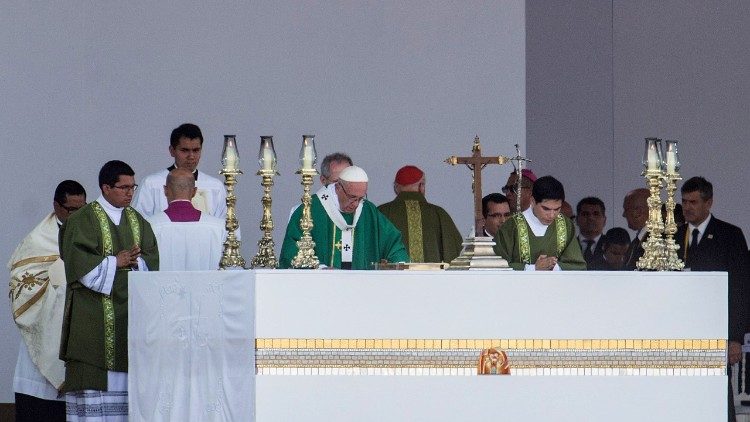
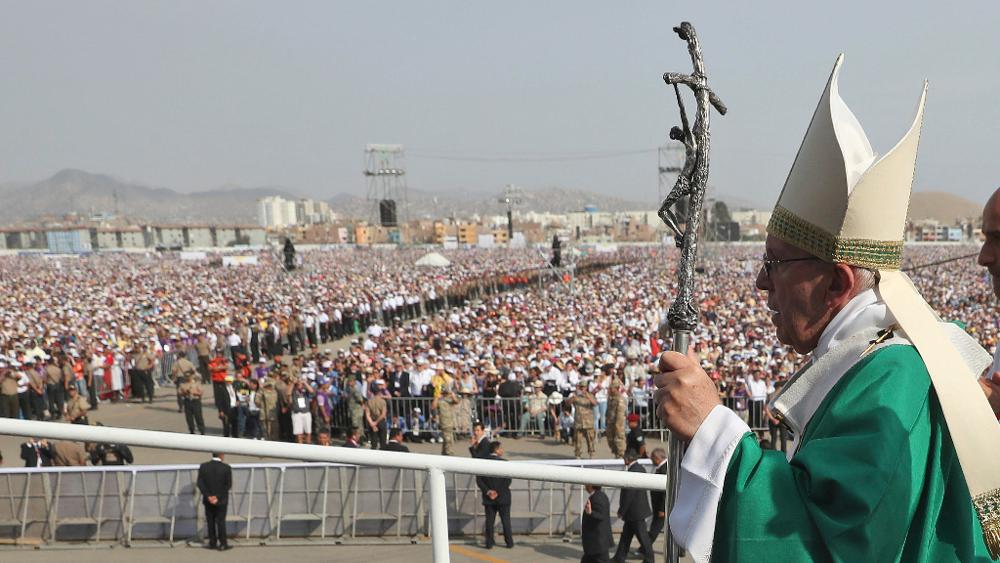
“Arise, go to Nineveh, that great city, and proclaim to it the message that I tell you” (Jon 3:2). With these words, the Lord spoke to Jonah and directed him to set out towards that great city, which was about to be destroyed for its many evils. In the Gospel, we also see Jesus setting out towards Galilee to preach the Good News (cf. Mk 1:14). Both readings reveal a God who turns his gaze towards cities past and present. The Lord sets out on a journey: to Nineveh, to Galilee, to Lima, to Trujillo and Puerto Maldonado… the Lord comes here. He sets out to enter into our individual, concrete histories. We celebrated this not long ago: he is Emmanuel, the God who wants to be with us always. Yes, here in Lima, or wherever you are living, in the routine of your daily life and work, in the education to hope that you impart to your children, amid your aspirations and anxieties; within the privacy of the home and the deafening noise of our streets. It is there, along the dusty paths of history, that the Lord comes to meet each of you.
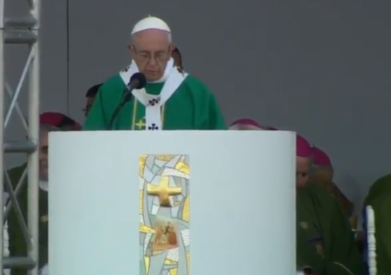 Sometimes
what happened to Jonah can happen to us. Our cities, with their daily
situations of pain and injustice, can leave us tempted to flee, to hide, to
run away. Jonah, and we have plenty of excuses to do so.
Looking at the city, we can start by saying that there are “citizens who
find adequate means to develop their personal and family life – and that
pleases us – yet the problem is the many “non-citizens”, “the half-citizens”
or “urban remnants”[1]. They are found along our roadsides, living on the
fringes of our cities, and lacking the conditions needed for a dignified
existence. It is painful to realize that among these “urban remnants”
all too often we see the faces of children and adolescents. We look at the
face of the future.
Sometimes
what happened to Jonah can happen to us. Our cities, with their daily
situations of pain and injustice, can leave us tempted to flee, to hide, to
run away. Jonah, and we have plenty of excuses to do so.
Looking at the city, we can start by saying that there are “citizens who
find adequate means to develop their personal and family life – and that
pleases us – yet the problem is the many “non-citizens”, “the half-citizens”
or “urban remnants”[1]. They are found along our roadsides, living on the
fringes of our cities, and lacking the conditions needed for a dignified
existence. It is painful to realize that among these “urban remnants”
all too often we see the faces of children and adolescents. We look at the
face of the future.
Seeing these things in our cities and our neighborhoods – which should be places of encounter, solidarity, and joy – we end up with what we might call the Jonah syndrome: we lose heart and want to flee (cf. Jon 1:3). We become indifferent, and as a result, anonymous and deaf to others, cold and hard of heart. When this happens, we wound the soul of our people. As Benedict XVI pointed out, “the true measure of humanity is essentially determined in relationship to suffering and to the sufferer… A society unable to accept its suffering members and incapable of helping to share their suffering and to bear it inwardly through ‘com-passion’ is a cruel and inhuman society”.[2]
After they arrested John, Jesus set out to Galilee to proclaim the Gospel of God. Unlike Jonah, Jesus reacted to the distressing and unjust news of John’s arrest by entering the city; he entered Galilee and from its small towns he began to sow the seeds of a great hope: that the Kingdom of God is at hand, that God is among us. The Gospel itself shows us the joy and the rippling effect that this brought about: it started with Simon and Andrew, then James and John (cf. Mk 1:14-20). It then passed through Saint Rose de Lima, Saint Turibius, Saint Martin de Porres, Saint Juan Macías, Saint Francisco Solano, down to us, proclaimed by that cloud of witnesses that have believed in him. It has come to us in order to act once more as a timely antidote to the globalization of indifference. In the face of that Love, one cannot remain indifferent.
Jesus invites his disciples to experience in the present a taste of eternity: the love of God and neighbor. He does this the only way he can, God’s way, by awakening tenderness and love of mercy, by awakening compassion and opening their eyes to see reality as God does. He invites them to generate new bonds, new covenants rich in eternal life.
Jesus walks through the city with his disciples and begins to see, to hear, to notice those who have given up in the face of indifference, laid low by the grave sin of corruption. He begins to bring to light many situations that had killed the hope of his people and to awaken a new hope. He calls his disciples and invites them to set out with him. He calls them to walk through to the city, but at a different pace; he teaches them to notice what they had previously overlooked, and he points out new and pressing needs. Repent, he tells them. The Kingdom of Heaven means finding in Jesus a God who gets involved with the lives of his people. He gets involved and involves others not to be afraid to make of our history a history of salvation (cf. Mk 1:15, 21).
Jesus continues to walk on our streets. He knocks today, as he did yesterday, on our doors and hearts, in order to rekindle the flame of hope and the aspiration that breakdown can be overcome by fraternity, injustice defeated by solidarity, violence silenced by the weapons of peace. Jesus continues to call us; he wants to anoint us with his Spirit so that we too can go out to anoint others with the oil capable of healing wounded hopes and renewing our way of seeing things.
Jesus continues to walk and to awaken hope, a hope that frees us from empty associations and impersonal analyses. He encourages us to enter like leaven into where we are, where we live, into every corner of our daily life. The kingdom of heaven is among you, he tells us. It is there wherever we strive to show a little tenderness and compassion, wherever we are unafraid to create spaces for the blind to see, the paralyzed to walk, lepers to be cleansed and the deaf to hear (cf. Lk 7:22), so that all those we had given up for lost can enjoy the resurrection. God will never tire of setting out to meet his children. How will we enkindle hope if prophets are lacking? How will we face the future if unity is lacking? How will Jesus reach all those corners if daring and courageous witnesses are lacking?
Today the Lord calls each of you to walk with him in the city, in your city. He invites you to become his missionary disciple so that you can become part of that great whisper that wants to keep echoing in the different corners of our lives: Rejoice, the Lord is with you!
[1] Apostolic Exhortation Evangelii Gaudium, 74.
Chào biệt Peru
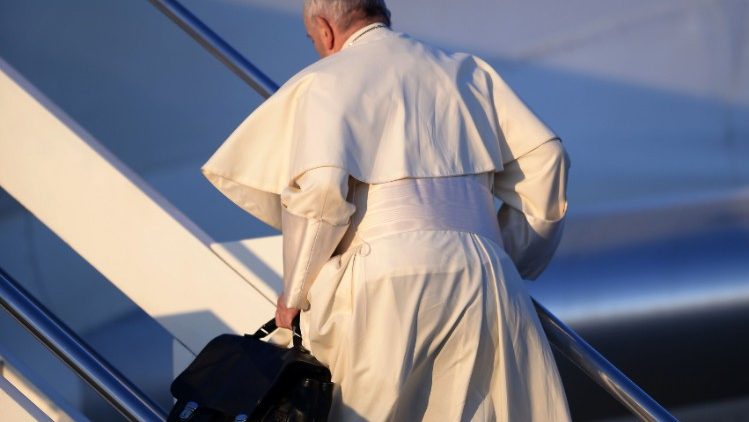
NGÀY 20/1 THỨ BẢY
(xin bấm vào các cái links mầu xanh để xem hình ảnh, hình quay / video và văn tự bài nói bằng tiếng Anh)
7:40 - Bay đến Trujillo (1 tiếng rưỡi)
10:00 - Thánh Lễ ở the waterfront esplanade of Huanchaco
12:15 - Đi xe băng qua khu vực "Buenos Aires" ở Lima
15:00 - Viếng thăm Vương Cung Thánh Đường
15:30 - Gặp linh mục, tu sĩ nam nữ và chủng sinh thuộc Giáo Tỉnh Bắc Peru ở Saints Carlos and Marcelo Seminary College
16:45 - Cử Hành Thánh Mẫu - Đức Bà Cửa Ngõ ở Quảng Trường "Plaza de Armas"
Marian Celebration – Our Lady of the Gate
18:15 - Bay về lại Lima (1 tiếng rưỡi)
Giảng Lễ
Những mảnh đất này có mùi vị của Phúc Âm. Hết mọi sự ở chung quanh chúng ta, trước một bức phông biển cả bao la, giúp chúng ta hiểu được cảm nghiệm của các tông đồ đối với Chúa Giêsu và là cái cảm nghiệm cả chúng ta nữa hôm nay được mời gọi để tái diễn. Tôi hân hoan biết rằng anh chị em đến từ các phần đất khác nhau ở miền bắc nước Peru để cử hành niềm vui Phúc Âm này.
Những người môn đệ ấy, giống như rất nhiều người trong anh chị em hôm nay đây, đã sống bằng nghề đánh cá. Họ ra thuyền, như một số anh chị em tiếp tục đi ra bằng caballitos de totora (những chiếc thuyền nan truyền thống), cũng cùng một lý do đó là để mưu sinh hằng ngày. Việc làm khó nhọc hằng ngày của chúng ta cũng chỉ vì muốn cố gắng nâng đỡ gia đình của chúng ta và cung cấp cho gia đình những gì sẽ giúp cho nó có thể xây dựng được một tương lai tốt đẹp hơn.
Cái "hồ cá vàng" (lake of golden fish) này, như anh chị em gọi nó, đã từng là nguồn sống và ân phúc cho nhiều thế hệ. Nó đã từng nuôi dưỡng những giấc mơ và những niềm hy vọng qua bao nhiêu năm trường.
Như các vị tông đồ, anh chị em biết được quyền lực của thiên nhiên, anh chị em đã cảm nghiệm thấy được cái mãnh lực của nó. Như các vị tông đồ đã phải chống chọi với bão tố biển khơi thế nào, anh chị em cũng đã phải đương đầu với cuộc tấn công của “Niño costero” (Niño duyên hải), một trận bão gây ra một hậu quả vẫn còn kéo dài tới ngày nay nơi rất nhiều gia đình, nhất là những gia đình chưa thể tái thiết nhà cửa của mình. Đó cũng là lý do tại sao tôi muốn đến đây để cầu nguyện với anh chị em.
Chúng ta cũng muốn mang đến cho cuộc cử hành Thánh Thể này giây phút khốn khó đang đặt vấn đề về niềm tin của chúng ta và thường khiến cho đức tin ấy bị chao đảo. Chúng ta muốn hiệp nhất chúng ta với Chúa Giêsu. Người biết nỗi đớn đau của chúng ta cũng như các thử thách của chúng ta; Người đã chịu những khổ đau cùng khốn nhất để hỗ trợ chúng ta qua các cơn gian nan thử thách của chúng ta. Chúa Giêsu tử giá muốn gần gũi với chúng ta trong hết mọi hoàn cảnh đau thương, để giúp chúng ta và nâng chúng ta lên. Vì Người đã đi vào lịch sử của chúng ta, Người muốn tham dự vào cuộc hành trình của chúng ta và chạm tới các thương tích của chúng ta. Thiên Chúa của chúng ta là một Vị Thiên Chúa không xa lạ với những gì chúng ta cảm thấy và khổ đau; ngược lại, giữa tình trạng đau đớn của chúng ta, Ngài giơ tay Ngài ra cho chúng ta.
Những thời điểm "bị chao đảo" này khiến chúng ta phải suy nghĩ và thách đố sức mạnh về tinh thần của chúng ta cũng như về các niềm xác tín sâu xa nhất của chúng ta. Chúng làm cho chúng ta nhận ra rằng quan trọng biết bao việc liên kết với nhau, đừng lẻ loi cô độc, và cần được đầy tràn mối hiệp nhất là hoa trái của Thánh Linh.
Cái gì đã xẩy ra cho các cô trinh nữ trong bài Phúc Âm chúng ta vừa nghe? Đột nhiên họ đã nghe thấy một tiếng la to làm họ tỉnh giấc và khiến họ cuống lên. Một số trong họ nhận ra rằng mình không còn đủ dầu để lên đường trong đêm tối, trong khi những cô khác đổ đầy dầu đèn và có thể thấy con đường dẫn đến cùng chàng rể. Vào một lúc nào đó, mỗi người trong họ mới cho thấy được những gì họ đã làm đầy cuộc sống của họ.
Đối với chúng ta cũng giống như vậy. Có những lúc chúng ta nhận ra những gì chúng ta đã đổ đầy vào đời sống của chúng ta. Quan trọng biết bao trong việc đổ đầy cuộc sống của chúng ta bằng thứ dầu giúp chúng ta thắp lên ngọn đèn của chúng ta trong những tình trạng tăm tối để thấy được con đường tiến tới.
Tôi biết rằng, vào lúc tối tăm, khi anh chị em cảm thấy mình đứng mũi chịu sào cơn bão tố Niño, nhưng mảnh đất này vẫn cứ tiến tới; những mảnh đất này có đủ dầu cần thiết để ra đi giúp đỡ lẫn nhau như những người anh chị em thật sự của nhau. Anh chị em đã có thứ dầu của tình đoàn kết và lòng quảng đại là những gì thôi thúc anh chị em tác hành, và anh chị em đã tiến lên gặp Chúa bằng muôn vàn những cử chỉ hỗ trợ cụ thể. Ở giữa bóng tối tăm, cùng với rất nhiều người khác, anh chị em giống như những ngọn nến soi đường dẫn lối bằng những bàn tay mở rộng, sẵn sàng giúp xoa dịu nỗi đớn đau và chia sẻ những gì anh chị em có với những người khác từ cảnh bần cùng của mình.
Trong trình thuật của bài Phúc Âm, chúng ta thấy những người trinh nữ không có dầu đã đi ra phố mà mua. Ở vào giây phút quan trọng của đời mình, họ đã nhận ra rằng cây đèn của họ hết dầu và họ thiếu những gì là thiết yếu để thấy được con đường của niềm vui chân thực. Họ tự ra đi, một thân một mình, và vì thế họ đã bị nhỡ bữa tiệc. Như anh chị em đã quá biết, có những điều không thể nào ứng biến kịp, lại càng không thể nào mua được nữa. Hồn sống của một cộng đồng được đo lường bằng cách nó biết hợp quần để đối đầu với những lúc khó khăn và nghịch cảnh, để giữ cho niềm hy vọng được tồn tại. Làm như thế, họ cống hiến chứng từ cả thể nhất cho Phúc Âm. Chúa bảo chúng ta rằng: "Cứ dấu này mà mọi người nhận biết các con là môn đệ Thày, đó là các con yêu thương nhau" (Gioan 13:35). Vì đức tin hướng chúng ta đến một tình yêu cụ thể, chứ không phải những ý nghĩ, mà là thực tiễn, thực hành, quảng đại và cảm thương, một tình yêu có thể kiến tạo và tái thiết niềm hy vọng khi tất cả dường như tan tành mây khói. Nhờ đó chúng ta tham phần vào công việc của Thiên Chúa, một công cuộc được tông đồ Gioan diễn tả khi cho chúng ta thấy một Vị Thiên Chúa lau khô những giọt nước mắt của con cái mình. Thiên Chúa thực hiện công cuộc thần linh này bằng một tình yêu dịu dàng như một người mẹ khi bà lau nước mắt cho con cái của bà. Thật là một câu hỏi đẹp Chua có thể đặt ra cho mỗi người chúng ta vào lúc cuối ngày: con đã lau khô bao nhiêu giọt nước mắt trong ngày hôm nay?
"Những thứ bão tố" khác có thể tấn công những miền duyên hải này, kèm theo những hậu quả tàn hại đến đời sống của con cái sống ở các mảnh đất đây. Cả những thứ bão tố này nữa khiến chúng ta tự vấn với tư cách là một cộng đồng và thử thách sức mạnh của tinh thần chúng ta. Trong số những thứ bạo lực có tổ chức, như "những thứ giao kèo sát hại", và tình trạng mất an ninh chúng gây ra. Hay tình trạng thiếu những cơ hội được giáo dục và công ăn việc làm, nhất là trong giới trẻ, khiến chúng không thể xây dựng một tương lai xứng đáng. Hoặc tình trạng thiếu an cư đối với rất nhiều gia đình buộc phải sống ở những vùng quá bấp bênh không có phương tiện an toàn. Hay nhiều tình trạng khác anh chị em cần phải trải qua, những trận động đất kinh hoàng, hủy hoại đi niềm tin tưởng lẫn nhau là những gì rất cần cho việc xây dựng một cơ cấu hỗ trợ và hy vọng; các trận động đất làm rung chuyển linh hồn và cần đến tất cả thứ dầu chúng ta có được, nếu chúng ta muốn chống chọi với chúng. Anh chị em có bao nhiêu dầu?
Chúng ta thường ngẫm nghĩ về cách làm thế nào để đối đầu với những thứ bão tố ấy, hay làm sao giúp cho con em của chúng ta vượt qua được những tình trạng này. Tôi muốn nói cùng anh chị em rằng không có một cách thức nào hơn đường lối của Phúc Âm: được gọi là Giêsu Kitô. Hãy làm cho đời sống của anh em tràn đầy Phúc Âm. Tôi xin phấn khích anh chị em hãy trở thành một cộng đồng được Chúa xức dầu bằng dầu Thần Linh. Ngài biến đổi, canh tân và kiên cường tất cả mọi sự. Nơi Chúa Giêsu, chúng ta có được sức mạnh của vị Thần Linh này để không đối xử một cách tự nhiên với những gì làm chúng ta bị tổn thương đau đớn, không biến chúng thành tự nhiên, không "bình thường hóa" những gì làm khô cạn tinh thần của chúng ta, tệ hơn nữa, cướp mất niềm hy vọng của chúng ta. Hỡi nhân dân Peru, trong giây phút lịch sử này, đừng có thứ quyền để mình bị cướp mất niềm hy vọng nhé! Nơi Chúa Giêsu, chúng ta có Vị Thần Linh giúp chúng ta liên kết để chúng ta có thể hỗ trợ nhau và đứng lên chống lại bất cứ những gì lấy đi tất cả cái quí báu nhất ở gia đình của chúng ta. Nơi Chúa Giêsu, Thiên Chúa làm cho chúng ta thành một cộng đồng tin tưởng, có thể tự tại; một cộng đồng hy vọng và vì thế tranh đấu để làm đảo lộn và biến đổi hết mọi nghịch cảnh bất hạnh; một cộng đồng yêu thương, vì nó không cho chúng ta khoanh tay đứng nhìn. Với Chúa Giêsu, hồn sống của phố thị Trujillo này có thể tiếp tục được gọi là "thành phố của mùa xuân vĩnh cửu", vì với Người, hết mọi sự đều là một cơ hội của niềm hy vọng.
Tôi biết được tình yêu của mảnh đất này đối với Vị Trinh Nữ, và tôi biết được lòng tôn sùng Đức Maria đang nâng đỡ anh chị em, luôn dẫn anh chị em đến với Chúa Giêsu, và cống hiến cho chúng ta một lời khuyên duy nhất được Mẹ luôn lập đi lập lại rằng: "Các con hãy làm bất cứ điều gì Người bảo" (Gioan 2:5). Chúng ta hãy xin Đức Mẹ bao phủ chúng ta trong tà áo của Mẹ và luôn đưa chúng ta đến với Con của Người. Thế nhưng, chúng ta làm như thế bằng cách cất tiếng hát theo bài ca dễ thương marinera của dân Andean: "Hỡi Đức Mẹ Cửa Ngõ, xin ban cho chúng con bình an và dồi dào tình yêu thương". Anh chị em có muốn hát bài này hay chăng? Nào chúng ta cùng nhau hát nhé? Ai sẽ bắt hát đây? "Hỡi Đức Mẹ Cửa Ngõ...". Không ai hát hết? Ngay cả ca đoàn nữa? Vậy chúng ta hãy đọc bài ca này, nếu chúng ta không hát được. Nào cùng nhau đọc: "Hỡi Đức Mẹ Cửa Ngõ, xin ban cho con ơn phúc của Mẹ. Hỡi Đức Mẹ Cửa Ngõ, xin ban cho chúng con bình an và dồi dào yêu thương". Nào một lần nữa! "Hỡi Đức Mẹ Cửa Ngõ, xin ban cho con ơn phúc của Mẹ. Hỡi Đức Mẹ Cửa Ngõ, xin ban cho chúng con bình an và dồi dào yêu thương".
Đaminh Maria Cao Tấn Tĩnh, BVL, tuyển dịch
Gặp linh mục, tu sĩ nam nữ và chủng sinh
Dear Brothers and Sisters:
Good afternoon!
I am grateful for the words of greeting that Archbishop José Antonio Eguren Anselmi of Piura addressed to me in the name of all those present.
Meeting with you, getting to know you, listening to you and sharing our love for the Lord and for the mission he has given us is very important. I know you have made great efforts to be here. Thank you!
This Seminary College that welcomes us was one of the first to be founded in Latin America for the formation of future generations of evangelizers. Being together in this place makes us realize that we are in one of those “cradles” that have produced countless missionaries. Nor can I forget that Saint Turibius of Mogrovejo, the patron of the Latin American bishops, died in this land, in the midst of his missionary activity. All these things invite us to look to our roots, to what enables us through time and history to grow and to bear fruit. Our vocations will always have that double dimension: roots in the earth and hearts in heaven. When one of these two is missing, something begins to go wrong and our life gradually withers (cf. Lk 13:6-9).
I like to point out that our faith, our vocation, is one of remembrance, that “Deuteronomic” dimension of life. One of remembrance, because it recognizes that neither life, nor faith, nor the Church began with the birth of any one of us. Remembrance looks to the past in order to discover the sap that nourished the hearts of disciples for centuries, and thus comes to recognize God’s presence in the life of his people. We remember the promise he made to our forebears and that, by his continuing presence in our midst, he is the cause of the joy that makes us sing: “The Lord has done great things for us; we are glad” (Ps 125:3).
I would like to share with you some of the virtues of this remembrance.
The Gospel that we have heard is usually read in a vocational key, and so we concentrate on the disciples’ encounter with Jesus. I would like to go back even earlier and take a look at John the Baptist. He was with two of his disciples, and seeing Jesus pass by, he told them: “Behold the Lamb of God” (Jn 1:36). On hearing this, they left John and followed Jesus (cf. v. 37). This is somewhat surprising since they had been with John, they knew that he was a good man, and that, as Jesus would say, of those born of woman none was greater than he (Mt 11:11), yet he was not the one who was to come. John was waiting for someone greater than himself. He clearly understood that he was not the Messiah, but simply the herald of his coming. John remembered; he was mindful of the promise and of his own place in history.
John embodies the awareness of a disciple conscious that he is not, and never will be, the Messiah, but only one called to point out the Lord’s presence in the life of his people. As consecrated men and women, we are not called to supplant the Lord by our own works, our missions, or our countless activities. All that we are asked to do is to work with the Lord, side by side, never forgetting that we do not replace him. This does not make us “slacken” in the work of evangelization; rather, it impels us to work all the harder, ever mindful that we are disciples of the one Master. A disciple knows that he or she is there, now and always, to support the Master. That is the source of our joy.
It is good to know that we are not the Messiah! It frees us from thinking that we are overly important or too busy (in some places it is not uncommon to hear people say: “No, don’t go to that parish because the pastor is always busy!”). John the Baptist knew that his mission was to point the way, to make beginnings, to open up spaces, to proclaim that “another” was the bearer of God’s Spirit. To be a people of remembrance frees us from the temptation of thinking that we are messiahs.
We can fight this temptation in many ways, but also with laughter. Yes, learning to laugh at ourselves gives us the spiritual ability to stand before Lord with our limitations, our mistakes, and our sins, but also our successes, and the joy of knowing that he is at our side. A good spiritual test is to ask ourselves whether we can laugh at ourselves. Laughter saves us from the “self-absorbed Promethean neo-Pelagianism of those who ultimately trust only in their own powers and feel superior to others”.[1] Brothers and sisters, laugh in community, and not at the community or at others! Let us be on guard against people so important that they have forgotten to smile in their lives.
John the Evangelist mentions in his Gospel the time when his life changed: “it was about the tenth hour” (Jn 1:39). An encounter with Jesus changes our lives, it establishes a “before” and an “after”. It is always good to remember the hour, that special day when each of us we realized that the Lord expected something more of us. The memory of that hour in which we were touched by his gaze.
When we forget that hour, we forget our origins, our roots; and by losing these basic coordinates, we lose sight of the most precious part of our lives as consecrated persons: the Lord’s gaze. Perhaps you don’t like the place where the Lord found you, perhaps it wasn’t an ideal situation, or “it could have been better”. But it was there that he found you and healed your wounds. Each of us knows where and when: perhaps it was a time of complicated situations, of painful situations; yes, but it was there that the God of Life met you and made you a witness to his Life, a part of his mission and, in union with him, a caress of God for many people. We do well to remember that our vocations are a loving call to love in return and to serve. If the Lord fell in love with you and chose you, it was not because you were more numerous than the others, for you are the least of peoples, but out of pure love! (cf. Deut 7:7-8). His is a visceral love, a merciful love that impels us in the depths of our being to go out and serve others as Jesus did.
I would like to emphasize one aspect that I consider important. Many of us, when we entered the seminary or the house of formation, were shaped by the faith of our families and neighbors. This is how we took our first steps, frequently sustained by displays of popular piety, which in Peru have taken on the most exquisite forms and have deep roots in God’s simple and faithful people. Your people have demonstrated an immense love of Jesus Christ, the Virgin Mary, and your saints and blesseds, in so great a number of devotions that I dare not name them for fear of leaving some of them out. In their shrines, “many pilgrims make decisions that mark their lives. The walls [of those shrines] contain many stories that millions could tell of conversion, forgiveness, and gifts received”.[2] For many of you, the story of your vocation could also be written on those walls. I urge you not to forget, much less look down on, the solid and simple faith of your people. Welcome, accompany and stimulate their encounter with the Lord. Do not become “professionals of the sacred” by forgetting your people, from whose midst the Lord took you. Do not lose your remembrance and respect for those who taught you how to pray.
Remembering the moment of our call, rejoicing in the memory of Christ’s entrance into our lives, will help us to say that beautiful prayer of Saint Francisco Solano, the great preacher and friend of the poor: “My good Jesus, my redeemer, and my friend! What do I have, that you have not given me? What do I know, that you have not taught me?”
In this way, a religious, a priest, a consecrated woman or man is a person of remembrance, joy, and gratitude: three things we need to appropriate and keep as “weapons” against all vocational pretense. Grateful awareness enlarges the heart and inspires us to service. Without gratitude, we can be efficient dispensers of sacred things, but we will lack the anointing of the Spirit to become servants of our brothers and sisters, especially those most in need. The faithful People of God have a sense of smell that enables them to distinguish a functionary of the sacred from a grateful servant. They are able to distinguish someone who is mindful from someone who is not. The People of God are patient, but they also know who serves and heals their wounds with the balm of joy and gratitude.
Andrew was one of the disciples of John the Baptist who followed Jesus that day. After spending time with Jesus and seeing where he lived, he returned to the house of his brother Simon Peter and told him: “We have found the Messiah” (Jn 1:41). That was the greatest news he could give him, and it brought him to Jesus. Faith in Jesus is contagious; it cannot be restrained or kept within. Here we see how witness becomes fruitful: the newly called disciples go on to attract others by their testimony of faith, just as Jesus, in the Gospel passage, calls us through others. The mission springs spontaneously from the encounter with Christ. Andrew begins his apostolate with those closest to him, with his brother Simon, almost naturally, by radiating joy. Joy is the surest sign that we have “discovered” the Messiah. Joy is a constant in the hearts of the apostles, and we see it in the enthusiasm with which Andrew tells his brother: “We have found him!” For “the joy of the Gospel fills the hearts and the lives of all who encounter Jesus. Those who accept his offer of salvation are set free from sin, sorrow, inner emptiness and loneliness. With Christ, joy is constantly born anew”.[3]
This joy opens us up to others; it is a joy to be shared. In the fragmented world in which we live, a world that can make us withdrawn, we are challenged to become builders and prophets of community. For no one is saved alone. I would like to be clear about this. Fragmentation or isolation are not things that just happen “out there”, only a problem with the “world”. Brothers and sisters, divisions, wars, and isolation are found within our communities, and what harm they bring us! Jesus sends us out to build communion and unity, yet often it seems we go about this by displaying our disunity and, worse yet, trying to trip each other up. We are called to be builders of communion and unity, but this does not mean thinking everyone is the same or doing things always the same way. It means discerning what everyone has to offer, respecting their differences, and acknowledging the gift of charisms within the Church, knowing that while each of us contributes what he or she has, we also need one another. Only the Lord has the fullness of the gifts; only he is the Messiah. He wanted to distribute his gifts in such a way that we can give what is ours while being enriched by that of others. We must be on guard against the temptation of the “only child”, who wants everything for himself because there is no one to share it with. I ask those of you who are in positions of authority: please not to become self-referential. Try to care for your brothers and sisters; try to keep them happy, because happiness is contagious. Do not fall into the trap of an authority that turns into authoritarianism by forgetting that its mission is primarily one of service.
Dear brothers and sisters, I thank you once more. May this “Deuteronomic” remembrance make us more joyful and grateful to be servants of unity in the midst of our people.
May the Lord bless you and may Our Lady protect you. Please do not forget to pray for me.
[1] Cf. Evangelii Gaudium, 94.[2] Cf. Fifth General Conference of the Latin American and Caribbean Bishops, Aparecida Document, 29 June 2007, 260.
[3] Evangelii Gaudium, 1.
Cử Hành Thánh Mẫu - Đức Bà Cửa Ngõ
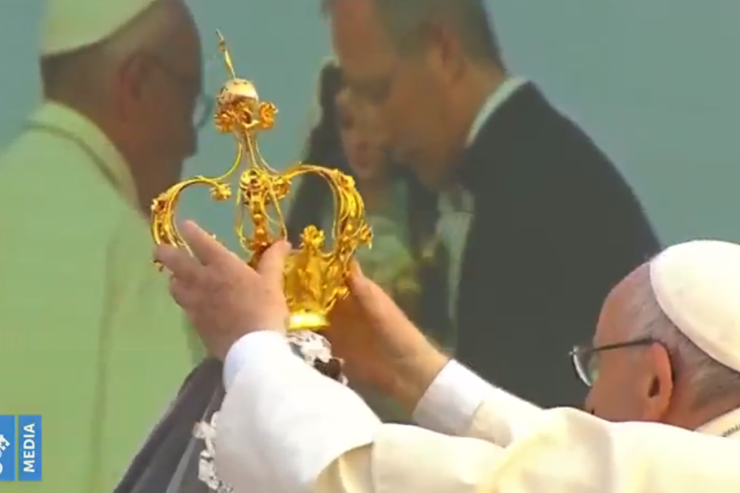
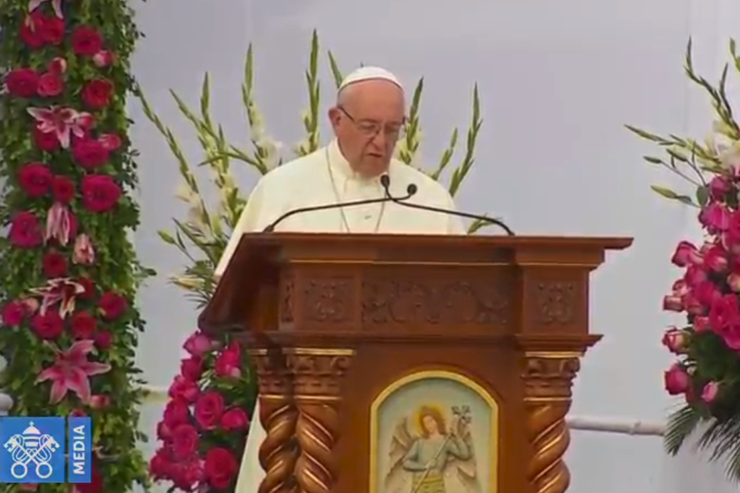
Dear Brothers and Sisters,
I thank Monsignor Héctor Miguel for his words of welcome in the name of the whole pilgrim people of God in these lands.
In this beautiful and historical square of Trujillo, that awakened dreams of freedom for all Peruvians, we are gathered today to meet our “Dear Mother of Otuzco”. I know that many of you have traveled a great distance to be present today, gathered beneath our Mother’s gaze. This square has thus become an open-air shrine where all of us want to let our Mother look upon us with her maternal and tender gaze. She is a mother who knows the heart of her Peruvian children from the north and from so many other places; she has seen your tears, your laughter, your desires. In this square, we want to cherish the memory of a people that knows that Mary is a Mother who does not abandon her children.
This “home” is decorated in a particularly festive way. We are surrounded by images from throughout this region. Together with the beloved Immaculate Virgin of the Gate of Otuzco, I greet and welcome the Most Holy Cross of Chalpón from Chiclayo, the Captive Lord from Ayabaca, Our Lady of Mercies from Paita, the Child Jesus of the Miracle from Eten, the Mother of Sorrows from Cajamarca, Our Lady of the Assumption from Cutervo, the Immaculate Conception of Chota, Our Lady of Alta Gracia from Huamachuco, Saint Turibius of Mogrovejo from Tayabamba (Huamachuco), Our Lady of the Assumption from Chachapoyas, Our Lady of the Assumption of Usquil, Our Lady of Succour from Huanchoco, and the relics of the Conventual Martyrs of Chimbote.
Every community, each tiny corner of this land, is accompanied by the face of a saint, and by love for Jesus Christ and for his Mother. If we consider that wherever there is a community, wherever there is life and hearts longing to find reasons to hope, to sing and to dance, to long for a decent life… there is the Lord, there we find his Mother, and there too the example of all those saints who help us to remain joyful in hope.
With you, I give thanks for the attentiveness of our God. He looks for the best way to draw near to each person so that he or she can receive him. That is the origin of his many and varied invocations and titles. Those titles express the desire of our God to be close to each heart, so that the language of God’s love is always spoken in dialect; there is no other way of doing it, and what is more, it inspires hope to see how the Mother takes on the features of her children, their way of dressing and their dialect, in order to make them share in her blessing. Mary will always be a mestiza Mother, because in her heart all races find a place, for love seeks out every possible way to love and to be loved. All these images remind us of the tender love with which God wants to be close to every village and every family, to you and me, to everyone.
I know of the love that you have for the Immaculate Virgin of the Gate of Otuzco. Today, together with you, I wish to declare her: Our Lady of the Gate, “Mother of Mercy and Hope”. Our Lady, who in centuries past showed her love for the children of this land when placed above a gateway, she defended and protected them from the threats that afflicted them, awakening the love of all Peruvians even to our own day.
Mary continues to defend us and point out the gate that opens for us the way to authentic life, to the Life that does not pass away. She walks beside every one of her children, in order to lead them home. She accompanies us all the way to the Gate that gives Life, for Jesus does not want anyone to remain outside, in the cold. In this way, she accompanies “the yearning of so many people to turn back to the house of the Father, who awaits their return”[1], yet so often do not know how to do so. As Saint Bernard said: “You who feel far away from terra firma, dragged down by the waves of this world, in the midst of storms and tempests: look to the Star and call upon Mary”.[2] She shows us the way home. She brings us to Jesus, who is the Gate of Mercy.
In 2015, we had the joy of celebrating the Jubilee of Mercy. In the course of that year, I invited all the faithful to pass through the Door of Mercy, “through which anyone who enters will experience the love of God who consoles, pardons, and instils hope”.[3] I would like to repeat with you now that same hope: “How much I desire that the years to come will be steeped in mercy, so that we can go out to every man and woman, bringing the goodness and tenderness of God!”[4] How much I desire that this land, which clings to the Mother of Mercy and Hope, can abound in God’s goodness and tender love and bring it everywhere. For there is no better medicine, dear brothers and sisters, to cure many wounds than a heart that has known mercy, than a heart that is compassionate before sorrow and misfortune. A heart compassionate before people’s mistakes and their desire to change, without knowing where to start.
Compassion is active, for “we have learned that God bends down to us (cf. Hos 11:4), so that we may imitate him in bending down to our brothers and sisters”,[5] above all to those who suffer the most. And like Mary, in being attentive to those who lack the wine of gladness, as happened at the wedding feast of Cana.
Looking to Mary, I do not want to conclude without asking all of us to think of the mothers and grandmothers of this nation; they are a true driving force for the life and the families of Peru. What would Peru be like, without its mothers and grandmothers! What would our lives be like without them! Our love for Mary must help us to feel appreciation and gratitude for women, for our mothers and grandmothers, who are a bastion in the life in our cities. Almost always in silence, they carry life forward. It is the silence and strength of hope. Thank you for your witness. Appreciation and gratitude. But in thinking of our mothers and grandmothers, I want to invite you to combat a scourge that affects our American continent: the numerous cases where women are killed. And the many situations of violence that are kept quiet behind so many walls. I ask you to fight against this source of suffering by calling for legislation and a culture that repudiates every form of violence.
Brothers and sisters, Our Lady of the Gate, Mother of Mercy and Hope, shows us the way and points out the best defense against the evil of indifference and insensitivity. She brings us to her Son and encourages us to promote and spread a “culture of mercy based on the rediscovery of encounter with others, a culture in which no one looks at another with indifference or turns away from the suffering of our brothers and sisters”.[6] [1] Apostolic Letter Misericordia et Misera at the conclusion of the Extraordinary Jubilee of Mercy (20 November 2016), 16.
[2] Homily II super «Missus est», 17: PL 183, 70.
3] Bull of Indiction Misericordiae Vultus (11 April 2015), 3.
[4] Ibid., 5.[5] Apostolic Letter Misericordia et Misera at the conclusion of the Extraordinary Jubilee of Mercy (20 November 2016), 16.
[6] Ibid., 20.
NGÀY 19/1 THỨ SÁU
(xin bấm vào các cái links mầu xanh để xem hình ảnh, hình quay / video và văn tự bài nói bằng tiếng Anh)
8:30 - Bay từ Phi Trường Lima đến Puerto Maldonado (1 tiếng 45 phút)
10:30 - Gặp gỡ thổ dân miền Amazon ở "Coliseo Regional Madre de Dios"
Meeting with indigenous people of the Amazon region
11:30 - Gặp gỡ dân chúng ở Jorge-Basadre-Institute
12:15 - Thăm Nhà Trẻ "Hogar Principito"
Visit to "Hogar Principito" Childrenʼs Home
13:15 - Ăn trưa với những đại diện các sắc dân miền Amazonia ở Patoral Centre "Apaktone"
14:35 - Bay về lại Lima
16:20 - Viếng Nguyện Đường Airbase
16:45 - Gặp gỡ Quị Vị Chính Quyền, Xã Hội Dân Sự và Ngoại Giao Đoàn ở Government Palace's Honour Yark
Meeting with Authorities, the Civil Society and the Diplomatic Corps
17:15 - Thăm Tổng Thống Peru ở Ambassadors' Salon của Government Palace
17:55 - Gặp riêng các tu sĩ Dòng Tên ở Nhà Thờ "San Pedro"
Gặp gỡ thổ dân miền Amazon
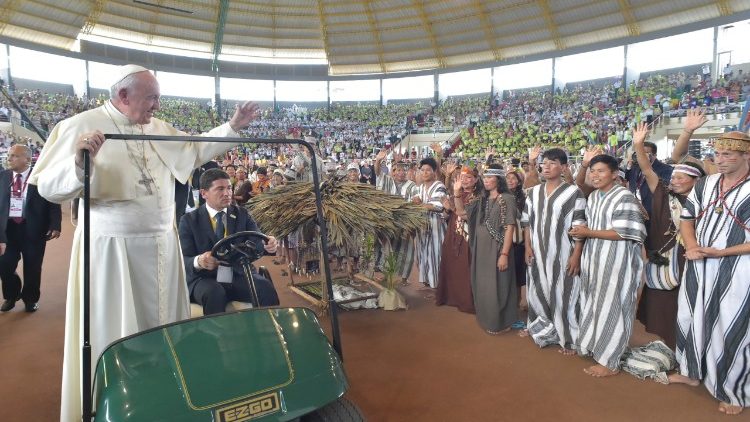
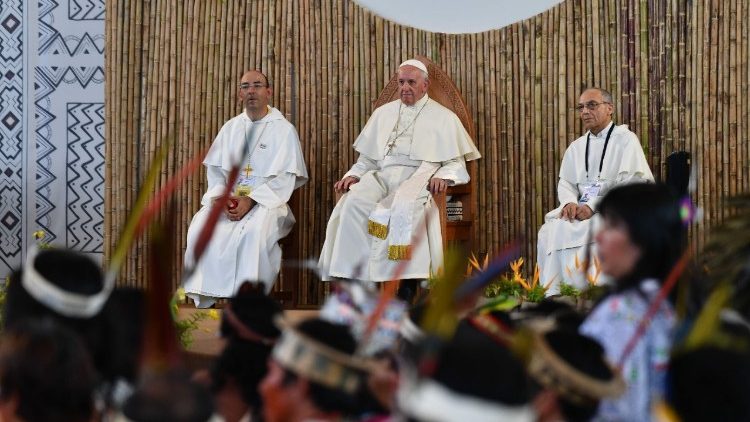
Tôi biết anh chị em thuộc các thổ dân Amazonian khác nhau: Harakbut, Esse-ejas, Matsiguenkas, Yines, Shipibos, Asháninkas. Yaneshas, Kakintes, Nahuas, Yaminahuas, Juni Kuin, Madijá, Manchineris, Kukamas, Kandozi, Quichuas, Huitotos, Shawis, Achuar, Boras, Awajún, Wampís, và còn nữa. Tôi cũng biết rằng trong chúng ta đây cũng có các dân tộc Andes đã đến với khu rừng rú này và đã trở thành dân Amazon. Tôi hết sức mong mỏi cuộc gặp gỡ này. Cám ơn anh chị em đang ở nơi đây, giúp tôi thấy được rõ hơn nữa nơi dung nhan của anh chị em cái phản ảnh của miền đất này. Đó là một dung nhan đa dạng, một dung nhan của những gì là vô vàn phong phú lớn lao với muôn vẻ về sinh vật, văn hóa và tinh thần. Những ai trong chúng ta không sống ở những vùng đất này cần đến sự khôn ngoan và kiến thức của anh chị em để giúp chúng tôi tiến vào, chứ không hủy hoại, các kho tàng được chất chứa ở miền đất này. Cũng như để nghe thấy cái âm vang của lời Chúa đã nói với Moisen: "Hãy cởi dép của ngươi ra, vì nơi ngươi đang đứng là nơi thánh" (Xuất Hành 3:5).
Xin cho tôi được lập lại một lần nữa: "Chúc tụng Chúa", lạy Chúa, vì công việc kỳ diệu tay Ngài làm nơi các dân tộc Amazonian và vì tất cả tính chất sinh vật đa dạng được chất chứa nơi những vùng đất này!
Bài ca chúc tụng này bị đứt đoạn khi chúng ta biết đến và thấy được các vết thương sâu hoắm gây ra cho Amazonia cũng như cho các dân tộc của nó. Tôi muốn đến viếng thăm anh chị em và lắng nghe anh chị em, nhờ đó chúng ta có thể cùng nhau đứng, trong cung lòng của Giáo Hội, và chia sẻ với các thách đố của anh chị em, cùng tái khắng định với anh chị em một giải pháp tận tình trong việc bênh vực sự sống, bênh vực trái đất này và bênh vực các nền văn hóa.
Các thổ dân Amazonian có lẽ chưa từng bị đe dọa ở nơi miền đất của mình đây như đang xẩy ra. Miền Amazonia này đang được các phe nhóm đối đầu nhau tranh cãi. Một đàng là chủ nghĩa tân khai thác cùng với áp lực của các thứ lợi lộc thương mại lớn lao đang muốn nhúng tay vào dầu hỏa, khí đốt, cây cối, vàng bạc của miền này cùng những hình thức kỹ nghệ nông nghiệp độc phẩm. Đàng khác, những mảnh đất đai của nó đang bị đe dọa bởi một số chính sách méo mó nhắm đến chỗ "bảo trì" thiên nhiên song lại bất chấp con người nam, nhất là bất chấp anh chị em, những người anh chị em Amazonians của tôi là thành phần cư ngụ ở đây. Chúng ta biết đến những phong trào, dưới cái mặt nạ bảo trì rừng rú, tích trữ nhiều khu rừng rộng lớn và thương thảo với nhau, dẫn tới tình trạng đàn áp các thổ dân; hậu quả là họ không thể đến với mảnh đất này và với các nguồn lợi thiên nhiên của nó. Các vấn đề này đã bóp nghẹt các sắc dân ở đây và gây ra việc di dân của giới trẻ vì thiếu các giải pháp ở địa phương. Chúng ta cần phải phá vỡ cái kiểu cách lịch sử ấy, coi Amazonia như là một nguồn cung cấp bất tận cho các xứ sở khác bất chấp dân cư của nó............
Việc bênh vực trái đất này không có một mục đích nào khác ngoài việc bênh vực sự sống. Chúng tôi biết đến nỗi khổ gây ra cho một số anh chị em bởi những thứ thán khí bị xả ra hết sức đe dọa đến cuộc sống của gia đình anh chị em và làm ô nhiễm môi trường thiên nhiên của anh chị em.
Theo chiều hướng này còn một thứ tấn công sự sống tàn hại khác nữa liên quan đến việc làm ô nhiễm môi trường, được thịnh hành bởi việc khai thác hầm mỏ bất hợp pháp. Tôi đang nói đến việc buôn người: nô lệ lao động và lạm dụng tình dục. Việc bạo động phạm đến vị thành niên và nữ giới đang vang lên tới tận trời cao....
Nền văn hóa của các dân tộc chúng ta là một dấu hiệu của sự sống. Amazonia không phải chỉ là một kho trữ đa sinh vật mà còn là một kho trữ văn hóa cần phải bảo trì trước những hình thức tân thực dân hóa. Gia đình là, và luôn là, cơ cấu xã hội đóng góp nhiều nhất vào việc giữ gìn cho các nền văn hóa của chúng ta tồn tại. Trong những giây phút khủng hoảng đã qua, trước các hình thức đế quốc khác nhau, các gia đình thuộc những dân tộc nguyên thủy đã từng là thành phần bênh vực sự sống hơn ai hết. Chúng ta cần phải đặc biệt lưu ý, kẻo chúng ta để cho mình bị rơi vào cạm bẫy của các hình thức ý hệ thực dân, nấp dưới cái mặt nạ tiến bộ, những thứ hình thức từ từ nhưng chắc chắn làm mất đi những căn tính về văn hóa và thiết lập một thứ đồng dạng, duy nhất... cùng với cách thức suy nghĩ yếu kém. Hãy lắng nghe những vị lão thành. Họ có được một sự khôn ngoan giúp họ giao tiếp với siêu việt thể và làm cho họ thấy những gì là thiết yếu trong đời sống. Chúng ta đừng quên rằng "việc biến mất một nền văn hóa có thể là những gì trầm trong như, thậm chí còn trầm trọng hơn, là việc biến mất một giống cây hay một loài thú" (Encyclical Letter Laudato Si’, 145). Đường lối duy nhất để các nền văn hóa khỏi bị biến mất đó là họ làm sao để tiếp tục tồn tại và liên tục chuyển động. Quan trọng biết bao những gì được Yésica và Hector đã nói với chúng ta: "Chúng tôi muốn cho con của chúng tôi học hỏi, thế nhưng chúng tôi không muốn học đường xóa bỏ đi các thứ truyền thống của chúng tôi, các thứ ngôn ngữ của chúng tôi; chúng tôi không muốn quên đi sự khôn ngoan của cha ông chúng tôi!".............
Biết bao nhiêu là vị thừa sai nam nữ đã hiến mình cho các dân tộc của anh chị em và đã bênh vực các nền văn hóa của anh chị em! Họ làm như thế theo động lực của Phúc Âm. Chính Chúa Kitô đã mặc lấy xác thịt ở nơi một nền văn hóa, nền văn hóa Do Thái, và từ nền văn hóa này, Người đã hiến mình cho chúng ta như một nguồn mạch của những gì là mới mẻ cho tất cả mọi dân tộc, ở chỗ, từng dân tộc, nơi cái căn tính sâu xa riêng tư nhất của mình, cảm thấy mình được vững chắc nơi Người. Đừng chiều theo những nỗ lực mất gốc đức tin Công giáo nơi dân tộc của anh chị em. Mỗi một nền văn hóa và mỗi một thế giới quan chấp nhận Phúc Âm đều làm phong phú Giáo Hội bằng việc cho thấy một khía cạnh mới nơi dung nhan của Chúa Kitô. Giáo Hội không xa lạ với các vấn đề của anh chị em và của cuộc đời anh chị em, Giáo Hội không muốn xa vời với lối sống và cơ cấu của anh chị em. Chúng tôi cần các thành phần thổ dân để hình thành nền văn hóa của các giáo hội địa phương nơi Amazonia này. Xin hãy giúp các vị giám mục của anh chị em, và những vị thừa sai nam nữ, để nên một với anh chị em, nhờ đó, bằng một cuộc trao đổi bao hàm, làm nên một Giáo Hội theo khuôn mặt dân Amazonian, một Giáo Hội có khuôn mặt thổ dân. Theo tinh thần này, tôi đã triệu tập một Hội Nghị Giám Mục về Amazonia vào năm 2019.....
Đaminh Maria Cao Tấn Tĩnh, BVL, tuyển dịch
Gặp gỡ dân chúng
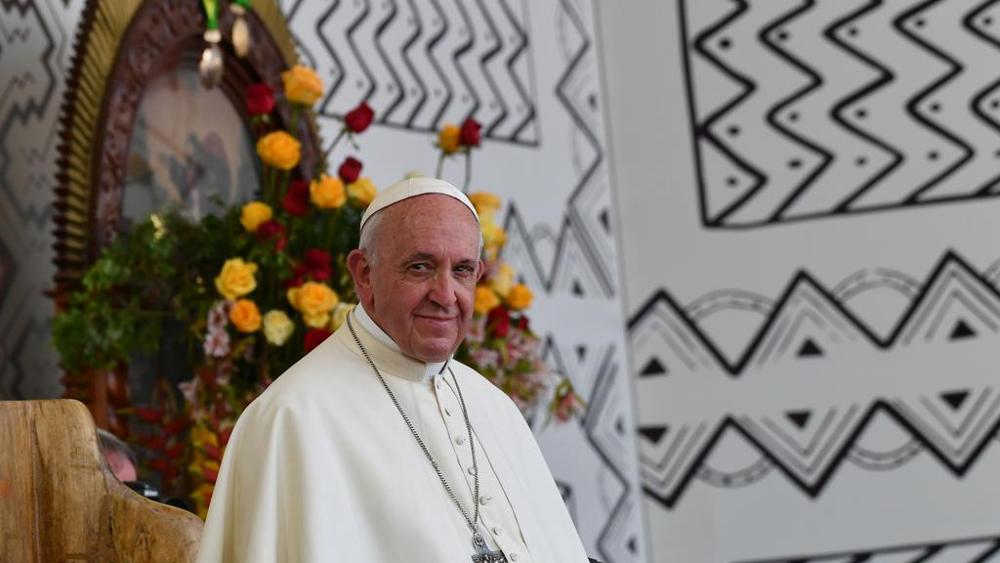
...Tôi cũng cám ơn Arturo và Margarita về việc chia sẻ kinh nghiệm của mình với chúng tôi. Họ nói rằng: "Đức Thánh Cha đang viếng thăm một miền đất hầu như bị lãnh quên, bị tổn thương và bị ra rìa... thế nhưng chúng con không phải là 'một miền đất không người'". Cám ơn các con đã nói thế: chúng con không phải là mảnh đất không người. Đó là điều cần phải được nhấn mạnh. Anh chị em không phải là một mảnh đất không người. Mảnh đất này có tên gọi đàng hoàng. Có bộ mặt. Có anh chị em.
Miền đất này có một tên gọi mỹ miều: Madre de Dios, Mẹ Thiên Chúa. Tại sao tôi lại không nói về Mẹ Maria, một người nữ trẻ trung sống ở một khu làng xa vắng, lẻ loi, cũng được nhiều người coi là "một mảnh đất không người". Ở đó Mẹ nhận được lời chào trọng đại nhất và một lời mời gọi không thể nào nào ngờ đó là làm Mẹ Thiên Chúa. Có những niềm vui mà chỉ có những ai nhỏ bé mới nghe thấy (xem Mathêu 11:25).
Anh chị em có được nơi Đức Maria chẳng những một mẫu gương để chiêm ngắm, mà còn cả một Người Mẹ nữa. Đâu có mẹ thì chúng ta không còn cảm thấy rùng mình khi thấy mình chẳng thuộc về ai, cảm thấy được vững tâm khi cái cảm quan thuộc về một gia đình, một dân tộc, một quê hương, thuộc về Thiên Chúa của chúng ta, bắt đầu bị phai nhòa đi. Anh chị em thân mến, đó là điều đầu tiên tôi muốn nói đến, và tôi muốn nói đến nó một cách cả tiếng và rõ ràng: Đây không phải là một mảnh đất của những kẻ mồ côi, mà là một mảnh đất có một Người Mẹ! Mà nếu đã có mẹ thì có con cái, có gia đình, có cộng đồng. Nơi nào có mẹ, có gia đình, có cộng đồng, thì các vấn đề có thể vẫn xẩy ra, nhưng chúng ta chắc chắn tìm thấy được sức mạnh để đương đầu với chúng một cách khác nhau.
Thật là đớn đau khi nghĩ rằng một ai đó muốn loại trừ đi niềm tin tưởng này và làm cho Madre de Dios thành một miền đất vô danh, không con cái, một mảnh đất cằn cỗi son sẻ. Một nơi chốn dễ bị thương mại hóa và khai thác. Đó là lý do tại sao chúng ta cần phải lập lại nơi gia đình và cộng đồng của chúng ta, cũng như nơi thâm cung của tâm can mỗi người chúng ta rằng: Đây không phải là một mảnh đất côi cút! Nó có một Người Mẹ! Đó là tin mừng được truyền từ đời nọ đến đời kia nhờ các nỗ lực của rất nhiều người chia sẻ tặng ân nhận thức này, nhận thức chúng ta là con cái của Thiên Chúa và là Đấng giúp chúng ta nhận biết nhau như anh chị em của mình.
Trong một số lần, tôi đã từng nói đến thứ văn hóa sa thải loại trừ. Một thứ văn hóa không thỏa mãn với việc loại trừ, như chúng ta đã quá quen thấy nó, mà còn tiến tới chỗ bịt miệng, khinh thường và lật đổ tất cả những gì không giúp cho lợi lộc của nó; như thể chủ trương lạnh lùng hưởng thụ nơi một số người đang hoàn toàn chẳng cần biết gì đến nỗi khổ đau tuyệt vọng của người khác. Nó là một thứ văn hóa vô danh, chẳng có liên hệ gì, chẳng có mặt mũi nào, một thứ văn hóa sa thải loại trừ. Nó là một thứ văn hóa vắng mẹ chỉ muốn hưởng thụ. Trái đất này được đối xử theo thứ lý lẽ này. Các khu rừng và suối nước bị khai thác một cách tàn ác, sau đó chúng trở thành trơ trụi, không còn sử dụng được nữa. Con người ta cũng bị đối xử như vậy: họ được sử dụng cho đến khi có người chán họ, để rồi loại trừ họ như "thứ đồ vô dụng". Đó là thứ văn hóa sa thải loại trừ, nó quăng bỏ trẻ em, ném bỏ người già. Khi tôi được chở đi quanh đám đông ở đây thì có một người nữ làm bà 97 tuổi. Chúng ta cần phải vứt bỏ người nữ làm bà (grandmother) này hay chăng? Anh chị em nghĩ sao? Không, vì bà là một người làm bà đầy khôn ngoan của dân tộc bà. Chúng ta hãy hoan hô người nữ làm bà 97 tuổi này!.....
Các thứ thần tượng sai lạc, các thứ ngẫu tượng tham lam, tiền bạc và quyền lực, là những gì làm băng hoại tất cả mọi sự. Chúng làm băng hoại dân chúng và các cơ cấu tổ chức, và chúng ta tiêu rụi rừng rú. Chúa Giêsu đã nói có những thứ quỉ cần phải cầu nguyện nhiều mới trừ được chúng. Đó là một thứ quỉ trong chúng....
Thưa anh chị em, ơn cứu độ không phải là một cái gì đó chung chung, trừu tượng. Cha của chúng ta nhìn vào con người thực hữu và vào lịch sử cụ thể. Hết mọi cộng đồng Kitô hữu cần phải phản ảnh ánh mắt ấy, phản ảnh sự hiện diện tạo nên những mối liên kết và làm phát sinh gia đình cùng cộng đồng này. Đó là cách hữu hình hóa nước trời, nơi các cộng đồng mà mọi người đều cảm thấy mình thuộc về tổng thể, nơi họ cảm thấy được kêu gọi tên của họ và được phấn khích trở thành những kiến thiết viên sự sống cho người khác......
Đaminh Maria Cao Tấn Tĩnh, BVL, tuyển dịch
Thăm Nhà Trẻ "Hogar el Principito" (“the Home of the Little Prince”)
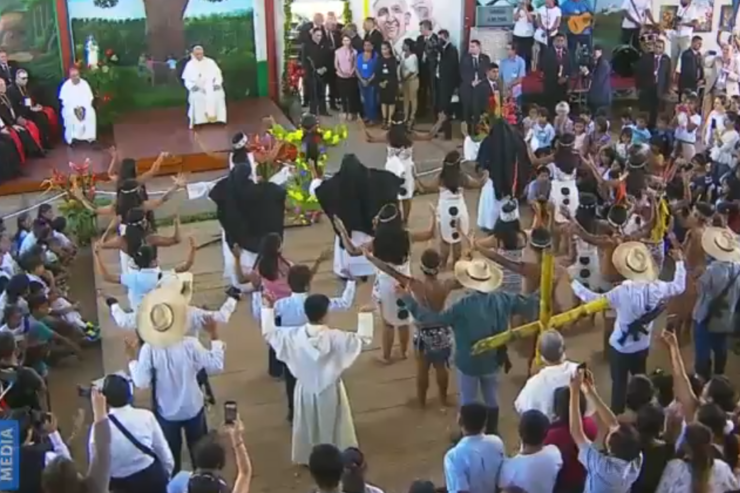
Dear Brothers and Sisters,
Dear Children,
Thank you very much for this lovely reception and for your words of welcome. Seeing you dance makes me very happy.
I could not leave Puerto Maldonado before coming to visit you. You wanted to come from various homes to meet here in the Little Prince Home. Thank you for the efforts you made to be here today.
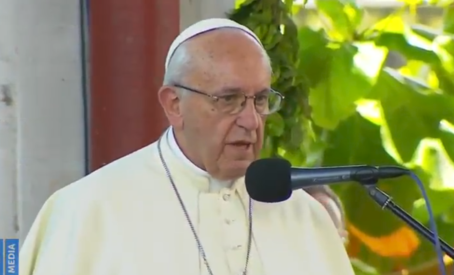 Not
long ago, we celebrated Christmas. Our hearts were touched by the image of
the Child Jesus. He is our treasure. You children are his reflection, and
you too are a treasure for all of us, the most precious treasure that we
have, and one that we are called to guard. Forgive us those times
when we adults have not cared for you, and when we did not give you the
importance you deserve. Your faces, your lives constantly demand a greater
commitment and effort on our part, lest we become blind or indifferent to
all those other children who suffer and are in need.
Without a doubt, you are the greatest treasure
that is ours to care for.
Not
long ago, we celebrated Christmas. Our hearts were touched by the image of
the Child Jesus. He is our treasure. You children are his reflection, and
you too are a treasure for all of us, the most precious treasure that we
have, and one that we are called to guard. Forgive us those times
when we adults have not cared for you, and when we did not give you the
importance you deserve. Your faces, your lives constantly demand a greater
commitment and effort on our part, lest we become blind or indifferent to
all those other children who suffer and are in need.
Without a doubt, you are the greatest treasure
that is ours to care for.
Dear children of the Little Prince Home and young people from the other homes, I know that sometimes, at night, some of you feel sad. I know that you miss your father and mother who are not here, and I know too that sometimes you feel very hurt. Dirsey, you were brave and you shared that with us. You told me; “I hope my message may be a light of hope”. But let me tell you something. Your life, your words, and the lives of all of you, are a light of hope. I want to thank you for your witness. Thank you for being a light of hope for all of us.
I am happy to see that you have a home where you are welcomed, and where, with affection and friendship, there are people who help you to see that God takes you by the hand and puts dreams in your heart.
What a wonderful witness, too, is offered by all of you young people who have travelled this road, who found love in this home and now are able to shape your own future! You demonstrate to all of us the enormous potential of each person. For these boys and girls, you are the best example to follow, a sign of hope that they will be able to do the same. We all need good role models: children need to look to the future and have positive role models. They need to think and say: “I want to be like him, like her”. Everything that you young people can do, like coming here to be with them, to play and spend time together, is important. Be for them, as the Little Prince says: the little stars that light up the night (cf. Antoine de Saint-Exupéry, XXIV; XXVI).
Some of you young people here come from native communities. Sadly, you have seen the destruction of the woodlands. Your elders taught you to discover them; there they found their food and the medicine that brought them healing. Today those woodlands have been laid waste by the intoxication of a misguided notion of progress. The rivers that hosted your games and provided you with food are now muddied, contaminated, dead. Young people, do not be resigned to what is happening! Do not renounce the legacy you have received from your elders, or your lives and dreams.
I would like to encourage you to study. Get an education, take advantage of the opportunities you have for schooling. The world needs you, young men and women of the first peoples, and it needs you as you are. Do not be content to be the last car on the train of society, letting yourselves be pulled along and eventually disconnected. We need you to be the engine, always pressing forward. Listen to your elders; value their traditions; do not curb your curiosity. Get in touch with your roots, but at the same time open your eyes to new things; bring the old and the new together in your own way. Share what you learn with the world, because the world needs you to be yourselves, who you really are, and not an imitation of someone else. We need you to be authentic, young men and women who are proud to belong to the Amazonian peoples and who can offer humanity an alternative for a true life. My friends, society often needs to correct its course and you, the young of the first peoples, can help greatly – of this I am sure – to meet this challenge, above all by teaching us a way of life based on protection and care, not on the destruction of everything that stands in the way of our greed.
I want to thank Father Xavier, the religious brothers and sisters, the lay missionaries who are doing such wonderful work, and all the benefactors who are part of this family. I also thank the volunteers whose gift of time is like a balm soothing every wound. Likewise, I thank all those who confirm these young people in their Amazonian identity and help them to forge a better future for their communities and for our entire world.
Children, let us ask God to give us his blessing.
May the Lord bless you and keep you. May he let his face shine upon you and show you his mercy. May he turn his countenance towards you and give you his peace. In the name of the Father, and of the Son, and of the Holy Spirit. Amen (cf. Num 6:24-26; Ps67; Blessing in Ordinary Time).
Let me ask you a favour. Please pray for me. And thank you for being the little stars that light up the night.
Gặp gỡ Quị Vị Chính Quyền, Xã Hội Dân Sự và Ngoại Giao Đoàn
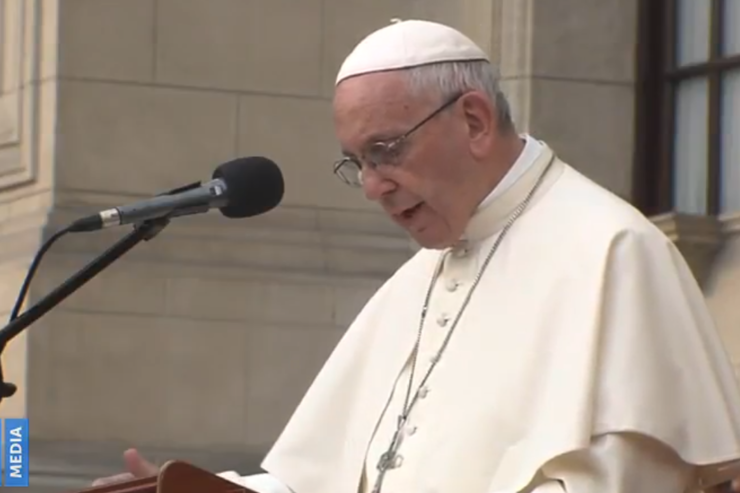
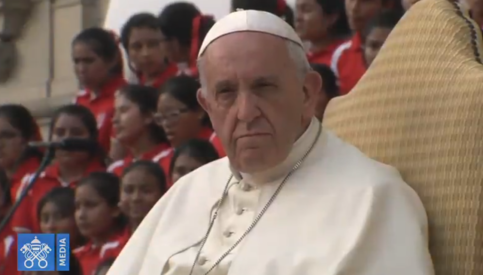 Mr
President,
Mr
President,
Members of the Government and the Diplomatic Corps,
Distinguished Authorities,
Representatives of Civil Society,
Ladies and Gentlemen, dear friends,
As I arrive at this historic edifice, I thank God for this opportunity to be
on Peruvian soil. I would like my words to be a message of greeting and
esteem for each of the sons and daughters of this people, that down the
years has preserved and enriched the wisdom handed down by its forebears and
represents, indeed, one of its greatest legacies.
I thank Mr. Pedro Pablo Kuczynsky, President of the Nation, for his
invitation to visit the country and for his words of welcome offered on your
behalf.
My visit to Peru has as its theme: “United by Hope”. If I may say so, seeing this land is itself a reason for hope. Part of your territory includes the Amazon, which I visited this morning. It is overall the largest tropical forest and the most extensive river system on the planet. This “lung”, as it has been called, is one of the world’s regions of great biodiversity, as it is home to a vast variety of species.
Yours too is a wealth and variety of cultures, which increasingly intermingle and which make up the soul of this people. It is a soul characterized by ancestral values such as hospitality, esteem for others, respect and gratitude for mother earth and creativity for new initiatives. It is marked likewise by a shared sense of responsibility for the development of all, joined to a solidarity that has often shown itself in your response to different disasters you have experienced.
In this regard, I would like to point to the young. They are the most vital gift that this society possesses. With their dynamism and enthusiasm, they promise, and encourage us to dream of, a hope-filled future, born of the encounter between your lofty ancestral wisdom and the new eyes that youth offers. I also take pleasure in a historical fact: that hope in this land has the face of holiness. Peru has given birth to saints that blazed paths of faith for the entire American continent. To name just one, Martin de Porres, a son of two cultures, showed the strength and richness that comes about when people focus on love. I could continue at length with this list of reasons, material and spiritual, for hope. Peru is a land of hope that invites and challenges its people to unity. This people has the duty to maintain unity, among other things, precisely to defend all these reasons for hope.
Yet over this hope, a shadow is growing, a threat looms. “Never has humanity had such power over itself, yet nothing ensures that it will be used wisely, particularly when we consider how it is currently being used” (Laudato Si’, 104). This is evident in the way that we are stripping the earth of its natural resources, without which no forms of life are possible. The loss of jungles and forests means not only the loss of species, which could also be extremely important resources for the future but also the loss of vital relationships that could end up altering the entire ecosystem (cf. ibid., 32).
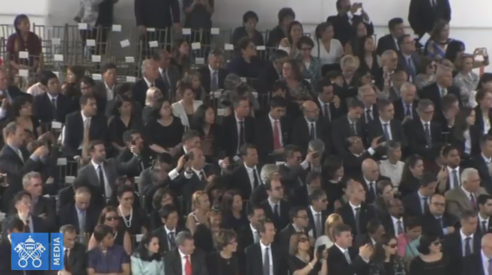 In
this context, being “united in defense of hope” means promoting and
developing an integral ecology as an alternative to “an outdated model of
development [that] continues to produce human, societal and environmental
decline” (Urbi et Orbi Message, Christmas 2017). This calls for listening to
local persons and peoples, recognizing and respecting them as valid dialogue
partners. They preserve a direct link to the land, they know its times and
ways, and so they know the catastrophic effects produced, in the name of
development, by many projects. The vital fabric that constitutes the nation
is thus being altered. The degradation
of the environment, sad to say, cannot be separated from the moral
degradation of our communities. We cannot think of these as two separate
realities.
In
this context, being “united in defense of hope” means promoting and
developing an integral ecology as an alternative to “an outdated model of
development [that] continues to produce human, societal and environmental
decline” (Urbi et Orbi Message, Christmas 2017). This calls for listening to
local persons and peoples, recognizing and respecting them as valid dialogue
partners. They preserve a direct link to the land, they know its times and
ways, and so they know the catastrophic effects produced, in the name of
development, by many projects. The vital fabric that constitutes the nation
is thus being altered. The degradation
of the environment, sad to say, cannot be separated from the moral
degradation of our communities. We cannot think of these as two separate
realities.
For example, black market mining has become a danger that is destroying people’s lives; forests and rivers are being destroyed, with all the richness they possess. This whole process of degradation brings with it and encourages organizations operating outside of legal structures; these debase so many of our brothers and sisters by subjecting them to human trafficking (a new form of slavery), irregular employment and crime… and to other evils that gravely affect their dignity and, at the same time, the dignity of the nation. Working together to defend hope demands that we remain very attentive to that other, often subtle form of environmental degradation that increasingly contaminates the whole system of life: corruption. How much evil is done to our Latin American people and the democracies of this continent by this social “virus”, a phenomenon that infects everything, with the greatest harm being done to the poor and mother earth. Everything being done to combat this social scourge deserves our utmost attention and help… This is a battle that involves all of us. Being “united in defense of hope” requires a greater culture of transparency among public entities, the private sector and civil society. No one can be excluded from this process. Corruption is preventable and calls for commitment on the part of all.
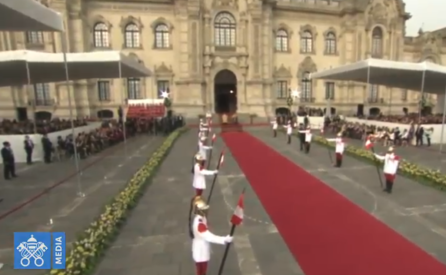 I
encourage and urge all those in positions of authority, in whatever sphere,
to insist on this path in order to bring your people and your land the
security born of feeling that Peru is a place of hope and opportunity for
all, and not just for a few. In this way, all Peruvians can feel that this
country is theirs, that here they can relate fraternally and equitably with
their neighbors, and help others in their need. A land where they can
realize their own future. And in this way to forge a Peru that makes room
for people of “all bloods” (José María Arguedas, Todas las sangres, Buenos
Aires, 1964), a land in which the “the promise of Peruvian life” (Jorge
Basadre, La promesa de lavida peruana, Lima, 1958) can be achieved.
I
encourage and urge all those in positions of authority, in whatever sphere,
to insist on this path in order to bring your people and your land the
security born of feeling that Peru is a place of hope and opportunity for
all, and not just for a few. In this way, all Peruvians can feel that this
country is theirs, that here they can relate fraternally and equitably with
their neighbors, and help others in their need. A land where they can
realize their own future. And in this way to forge a Peru that makes room
for people of “all bloods” (José María Arguedas, Todas las sangres, Buenos
Aires, 1964), a land in which the “the promise of Peruvian life” (Jorge
Basadre, La promesa de lavida peruana, Lima, 1958) can be achieved.
I wish to renew in your presence the commitment of the Catholic Church, which has accompanied the life of this nation, in this joint effort to continue working so that Peru will continue to be a land of hope. May Saint Rosa of Lima intercede for each of you and for this blessed nation.
Thank you once again.
https://zenit.org/articles/popes-address-to-peruvian-authorities-diplomatic-corps/
NGÀY 18/1 THỨ NĂM
(xin bấm vào các cái links mầu xanh để xem hình ảnh, hình quay / video và văn tự bài nói bằng tiếng Anh)
8:05 - Từ Santiago đến Iquique 2 tiếng 30 phút (ngày thứ ba trong chuyến tông du ở Chile, ĐTC lên miền bắc nước này)
11:30 - Dâng Thánh Lễ ở Lobito Campus
14:00 - Dùng trưa với Đoàn Tháp Tùng Giáo Hoàng ở “Casa de retiros del Santuario Nuestra Señora de Lourdes”
16:45 - Tạ Từ Chile
17:05 - Bay sang Lima Nước Peru
17:20 - Nghi Thức Nghênh Đón ở Phi Trường Lima Peru
Giảng Lễ
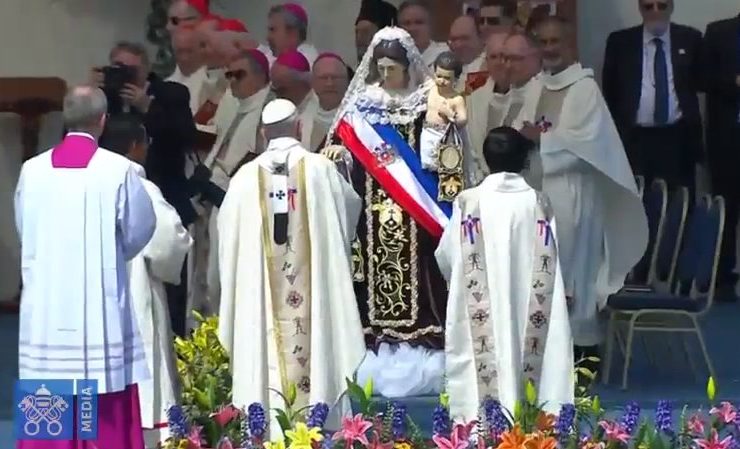
"Chúa Giêsu đã làm dấu chỉ đầu tiên này ở Cana Xứ Galilêa" (Gioan 2:11)
Đó là những lời cuối cùng của Bài Phúc Âm chúng ta vừa nghe, những lời diễn tả về việc công khai xuất hiện lần đầu tiên của Chúa Giêsu: ở một bữa tiệc, không hơn không kém. Không thể nào khác hơn, vì Phúc Âm là một lời mời gọi liên lỉ sống hân hoan. Ngay từ đầu vị thiên thần đã nói với Đức Maria rằng: "Hãy vui lên!" (Luca 1:28). Hãy vui lên khi thiên thần nói với các mục đồng; hãy vui lên khi thiên thần nói với Bà Isave, một người đàn bà lão thành và son sẻ...; hãy vui lên, Chúa Giêsu nói với người trộm, vì hôm nay anh sẽ được ở cùng Tôi trên thiên đàng (xem Luca 23:43).
Sứ điệp Phúc Âm là một nguồn mạch hân hoan: "Thày đã nói những điều ấy với các con để niềm vui của Thày ở nơi các con, và niềm vui của các con được trọn vẹn" (Gioan 15:11). Một niềm vui lây nhiễm, từ thế hệ này đến thế hệ kia, một niềm vui chúng ta đã được thừa hưởng.
Anh chị em miền bắc Chí Lợi thân mến, anh chị em biết điều ấy biết bao! Anh chị em biết sống đức tin của anh chị em và sống cuộc đời của mình bằng một tinh thần của ngày hội lễ vui tươi biết bao! Tôi đến đây như một khách hành hương để hợp với anh chị em trong việc cử hành cách thức sống đức tin đẹp đẽ này. Các ngày lễ quan thày của anh chị em, các điệu vũ tôn giáo của anh chị em - có những lúc kéo dài cả tuần lễ - âm nhạc của anh chị em, y phục của anh chị em, tất cả đều làm cho miền đất này trở thành một ngôi đền của lòng đạo hạnh phổ thông. Vì tiệc mừng không ở bên trong Thánh Đường, thế nhưng anh chị em biến cả đô thị thành một buổi tiệc mừng. Anh chị em biết cách cử hành, bằng cách ca hát và nhẩy múa "vai trò làm cha, việc quan phòng và sự hiện diện yêu thương liên lỉ" của Thiên Chúa, và điều này làm nẩy sinh "những thái độ nội tâm hiếm thấy ở cùng một mức độ tại một nơi nào khác, đó là lòng nhẫn nại, dấu thánh giá trong cuộc sống hằng ngày, tính vô tư, tỏ ra cởi mở với người khác, lòng mộ đạo" (PAUL VI, Apostolic Exhortation Evangelii Nuntiandi, 48). Những lời của tiên tri Isaia đã trở thành hiện thực: "Miền hoang vu sẽ trở thành cánh đồng mầu mỡ, và cánh đồng mầu mỡ này sẽ được cho là một khu rừng" (32:15). Mảnh đất này, được bao quanh bởi vùng sa mạc khô cằn nhất thế giới, có thể trang sức với những bộ y phục tiệc mừng.
Trong bầu khí lễ hội vui tươi này, bài Phúc Âm cho chúng ta thấy cách Đức Maria tác hành để làm sao cho niềm vui được tiếp tục. Mẹ đã lưu ý đến tất cả mọi sự xẩy ra chung quanh Mẹ; như một người mẹ tốt lành, Mẹ không ngồi yên một chỗ. Bởi vậy giữa lúc bữa tiệc đang diễn tiến với niềm vui chung, Mẹ lưu ý thấy rằng một điều gì đó sắp xẩy ra có thể "làm hỏng chuyện". Mẹ đã tiến đến với Con của Mẹ mà thưa cùng Người một cách vắn gọn rằng: "Họ hết rượu rồi" (Gioan 2:3).
Cùng một cách thức như thế, Mẹ Maria băng qua các tỉnh lỵ của chúng ta, các đường xá của chúng ta, các công trường của chúng ta, các nhà cửa của chúng ta và các bệnh viện của chúng ta. Mẹ Maria là Vị Trinh Nữ của La Tirana; Vị Trinh Nữ Ayquina ở Calama; Vị Trinh Nữ Đá Tảng ở Arica. Mẹ lưu ý tới tất cả những vấn đề đang làm nặng lòng của chúng ta, để thủ thỉ nói vào tai của Chúa Giêsu rằng: Con coi kìa, "họ hết rượu rồi".
Mẹ Maria không đứng yên một chỗ. Mẹ đến với những người phục tiệc mà nói cùng họ rằng: "Các anh hãy làm theo những gì Người bảo" (Gioan 2:5). Mẹ Maria, một người nữ ít lời nhưng lại là những lời rất chính xác, cũng đến với mỗi một người chúng ta mà nói một cách vắn gọn rằng: "Các con hãy làm bất cứ những gì Người bảo". Nhờ đó, Mẹ đã khơi động phép lạ đầu tiên của Chúa Giêsu, ở chỗ, làm cho thành phần bạn hữu của Người cảm thấy rằng cả họ nữa cũng là một phần của phép lạ này. Vì Chúa Kitô "đã đến với thế giới này không phải là để một mình thi hành công việc nào đó, mà là với tất cả chúng ta, để làm đầu của một đại thân thể, một thân thể mà chúng ta là những tế bào sống động, tự do và chủ động (SAINT ALBERTO HURTADO, Meditación Semana Santa para jóvenes [1946]).
Phép lạ được bắt đầu khi thành phần phục tiệc tiến đến với các chum đựng nước thanh tẩy. Cũng thế, mỗi người chúng ta có thể mở màn cho phép lạ; hơn thế nữa, mỗi người chúng ta được mời gọi trở thành một yếu tố của phép lạ xẩy ra cho người khác.
Thưa anh chị em, Iquique là một mảnh đất của những giấc mơ (tên của nó có nghĩa như thế theo ngôn ngữ Aymara). Nó là một mảnh đất đã từng cống hiến chỗ cư ngụ cho những con người nam nữ thuộc các dân tộc cùng văn hóa khác nhau, thành phần đã bỏ lại tất cả mọi sự mà ra đi. Ra đi với cõi lòng hằng ấp ủ niềm hy vọng có được một cuộc sống tốt đẹp hơn, thế nhưng, như chúng ta biết, bao giờ cũng đeo đẳng theo nỗi sợ hãi và bất định về tương lai. Iquique là một miền đất của những người di dân, một miền đất nhắc nhở chúng ta về tính chất cao cả của con người nam nữ, của toàn thể gia đình, thành phần đối diện với nghịch cảnh vẫn không chịu bỏ cuộc và lên đường tìm kiếm sự sống. Tìm kiếm sự sống. Họ - nhất là những ai phải lìa bỏ đất đai của mình vì khan hiếm nhu cầu sống - là hình ảnh của Thánh Gia, một gia đình đã phải băng qua sa mạc để tồn tại.
Mảnh đất này là một mảnh đất của các giấc mơ, thế nhưng chúng ta hãy hoạt động để bảo đảm nó cũng vẫn tiếp tục là một mảnh đất của tính hiếu khách. Một tính hiếu khách vui tươi, vì chúng ta đều biết rất rõ là không bao giờ có niềm vui Kitô giáo khi cửa đóng then cài; không thể có niềm vui Kitô giáo khi người khác cảm thấy bị coi là bất cần, khi không có chỗ cho họ ở giữa chúng ta (xem Luca 16:19-31).
Như Mẹ Maria ở Cana, chúng ta hãy cố gắng lưu ý hơn nữa đến các công trường và tỉnh lỵ của chúng ta, lưu ý tới những ai có cuộc sống bị "coi thường", những con người đã đánh mất - hay đã bị cướp mất - những lý do để vui mừng. Chúng ta đừng sợ lên tiếng nói: "Họ hết rượu rồi". Tiếng kêu của dân Chúa, tiếng kêu của người nghèo, là một loại kinh cầu; nó mở lòng chúng ta ra và dạy chúng ta chăm chú. Vậy chúng ta hãy chăm chú tới tất cả mọi trường hợp bất công cũng như với các hình thức khai thác mới liều mình làm cho rất nhiều anh chị em của chúng ta bị lỡ mất niềm vui của buổi tiệc mừng. Chúng ta hãy chú ý tới việc liên lỉ thiếu mất công ăn việc làm là tình trạng hủy hoại đời sống và gia đình. Chúng ta hãy chú ý tới những ai kiếm lợi từ tình trạng bất thường của nhiều người di dân không biết ngôn ngữ hay không có giấy tờ "hợp lệ". Chúng ta hãy chú ý tới việc thiếu nhà ở, đất đai và việc làm nơi rất nhiều gia đình. Và như Mẹ Maria, chúng ta hãy tin tưởng thân thưa: Họ hết rượu rồi.
Như thành phần phục tiệc, chúng ta hãy cống hiến những gì chúng ta có, dù ít chăng nữa. Như họ, chúng ta đừng sợ "chìa bàn tay ra". Chớ gì việc đoàn kết của chúng ta trong việc dấn thân cho công lý trở thành yếu tố cho một điệu vũ hay bài ca chúng ta có thể dâng lên Chúa của chúng ta. Chúng ta cũng tạo nên một cơ hội tốt nhất để học hỏi và lấy làm của mình những gì là giá trị, khôn ngoan và niềm tin được những người di dân mang theo họ. Đừng khép kín trước những "cái chum" đầy khôn ngoan và lịch sử được những con người tiếp tục đến với các mảnh đất này mang lại ấy. Chúng ta đừng làm cho mình bị mất đi tất cả những gì là tốt đẹp họ cần phải đóng góp.
Chúng ta hãy để cho Chúa Giêsu hoàn thành phép lạ bằng cách biến các cộng đồng của chúng ta và cõi lòng của chúng ta thành những dấu chỉ hiện diện sống động của Người, một phép lạ hân hoan và mừng rỡ vì chúng ta đã cảm nghiệm thấy rằng Thiên Chúa ở với chúng ta, vì chúng ta đã biết giành chỗ cho Người ở giữa chúng ta. Niềm vui và nỗi mừng có tính cách lây nhiễm này dẫn chúng ta đến chỗ không loại trừ một ai khỏi việc loan báo Tin Mừng này.
Xin Mẹ Maria, dưới những tước hiệu khác nhau của Mẹ ở mảnh đất được chúc phúc trên phía bắc đây, tiếp tục thủ thỉ nói vào tai của Chúa Giêsu Con của Mẹ rằng: "Họ hết rượu rồi", và chớ gì những lời của Mẹ tiếp tục tác dụng nơi chúng ta: "Các con hãy làm những gì Người bảo".
https://zenit.org/articles/popes-homily-during-mass-in-iquique-chile-full-text/
Đaminh Maria Cao Tấn Tĩnh, BVL, chuyển dịch
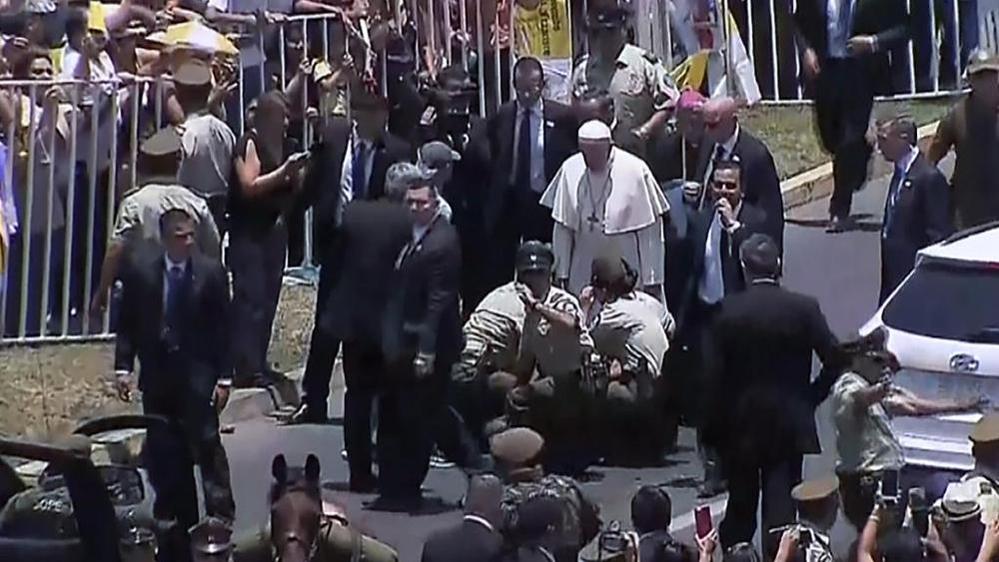
A police woman on horseback was overthrown right as the Popemobile was passing by. The Papal vehicle was able to steer quickly and avoid running over the woman. Francis made the car stop for he wanted to reach the woman lying on the ground and, together with the rescuers, make sure she was all right.
At the end of mass in the Campus Lobito of Iquique, the Pontiff boarded the Popemobile to reach the house of Señora de Lourdes in Iquique, about twenty kilometers away. Shortly before arriving, at the city entrance, the papal procession drove down a street with a wire mesh at the sides and many faithful behind it. To ensure the safety of the Pontiff, there were several police officers on horseback along the route.
Right when the papal car was passing through, the horse of a police woman, on the left side of the road, went suddenly wild and unsaddled the officer. The Popemobile quickly stirred to avoid running over the woman.
Francis then had the car stop, stepped out of it and walked back on foot to see what had happened and check on the woman’s condition while the rescue team arrived. He leaned over her and hugged her. The woman was wounded yet conscious and waiting for the ambulance to arrive. the Pontiff gave her words of consolation and thanked her for her service.
NGÀY 17/1 THỨ TƯ
(xin bấm vào các cái links mầu xanh để xem hình ảnh, hình quay / video và văn tự bài nói bằng tiếng Anh)
8:00 - Từ Santiago đến Temuco 2 tiếng 30 phút (ngày thứ hai trong chuyến tông du ở Chile, ĐTC xuống miền nam nước này)
10:30 - Dâng Thánh Lễ ở Phi Trường Maquehue
12:45 - Dùng trưa với cư dân Miền Araucania ở ngôi nhà "Madre de la Santa Cruz"
15:30 - Từ Temuco về lại Santiago 2 tiếng 30 phút
17:30 - Gặp giới trẻ ở Đền Thánh Maipu
| Meeting with the youth |
19:00 - Thăm Giáo Hoàng Học Viện Chí Lợi (nửa tiếng bằng xe)
| Visit to the Pontifical Catholic University of Chile |
Giảng Lễ

Mari, Mari (good morning)
“Küme tünngün ta niemün” [“Peace be with you!” (Lk 24:36)]
Tạ ơn Chúa đã cho tôi được đến thăm phần đất mỹ miều này của châu lục chúng ta đây, đó là Araucania. Nó là một mảnh đất được Đấng Hóa Công chúc phúc với những cánh đồng bao la phì nhiêu xanh tươi, với những khu rừng đầy những cây bách tán (araucarias) ấn tượng - cũng như với những núi lửa uy hùng phủ tuyết, những con sông và vùng hồ đầy sự sống. Cảnh sắc này nâng tâm hồn chúng ta lên với Thiên Chúa và dễ dàng thấy được bàn tay của Ngài nơi hết mọi tạo vật. Nhiều thế hệ nam nữ đã yêu thích mảnh đất này với tấm lòng tri ân tha thiết. Đến đây tôi muốn dừng lại một chút để ngỏ lời chào đặc biệt đến các phần tử thuộc dân tộc Mapuche, cũng như các thổ dân khác đang ở những vùng đất phía nam này, đó là anh chị em thổ dân Rapanui (ở Easter Island), thổ dân Aymara, thổ dân Quechua và Atacamenos cùng nhiều thổ dân khác.
Qua con mắt của thành phần du lịch thì mảnh đất này sẽ làm cho chúng ta cảm kích khi băng ngang qua nó, thế nhưng, nếu chúng ta áp tai của mình xuống đất, chúng ta sẽ nghe thấy nó hát lên rằng: "Arauco có một nỗi buồn bất khả câm nín, những bất công qua các thế kỷ mà mọi người đang thấy xẩy ra" (VIOLETA PARRA, Arauco tiena una pena.)
Trong bối cảnh tạ ơn cho mảnh đất này và cho dân chúng của nó, cũng như trong bối cảnh của nỗi sầu đau mà chúng ta cử hành Thánh Thể này. Chúng ta cử hành ở sân bay Maqueue này là nơi xẩy ra những vi phạm trầm trọng đến nhân quyền. Chúng ta dâng Thánh Lễ này cho tất cả những ai đã chịu khổ và chết đi, cũng như cho những ai hằng ngày mang gánh nặng của nhiều thứ bất công ấy. Hy tế của Chúa Giêsu trên cây thập tự giá mang lấy tất cả mọi tội lỗi và đớn đau của chư dân chúng ta hầu cứu chuộc họ.
Trong bài Phúc Âm chúng ta vừa nghe, Chúa Giêsu cầu cùng Cha "để họ tất cả được nên một" (Gioan 17:21). Ở vào giây phút quan trọng trong đời của mình, Người ngưng lại để cầu cho mối hiệp nhất. Trong cõi lòng của mình, Người biết rằng một trong những mối đe dọa lớn nhất đối với các môn đệ của Người cũng như đối với toàn thể nhân loại đó là sự chia rẽ và đối chọi, sự áp bức nhau. Biết bao nhiêu là nước mắt đã đổ ra! Hôm nay, chúng ta muốn liên kết với lời cầu nguyện này của Chúa Giêsu, cùng Người đi vào khu vườn sầu thương với các mối sầu thương của riêng chúng ta, để cùng với Chúa Giêsu xin Cha cho chúng ta cũng được nên một nữa. Chớ gì những đối chọi và chia rẽ không bao giờ làm chủ điều khiển chi phối chúng ta.
Mối hiệp nhật được Chúa Giêsu thỉnh nguyện này là một tặng ân cần phải liên lỉ kiên trì tìm kiếm, vì thiện ích của mảnh đất chúng ta cũng như vì con cái của nó. Chúng ta cần phải tỉnh táo đề phòng với các khuynh hướng có thể nẩy sinh gây "độc hại cho gốc rễ" của tặng ân Thiên Chúa muốn ban cho chúng ta này, Đấng mời gọi chúng ta hãy đóng vai trò chân chính trong lịch sử cho đặc ân này.
1- Những thứ đồng nghĩa sai lầm
Một trong những xu hướng chính chúng ta cần chống lại đó là xu hướng lẫn lộn giữa hiệp nhất (unity) và đồng dạng (unformity). Chúa Giêsu không xin Cha cho tất cả được bình đẳng, đồng nhất, vì mối hiệp nhất không nhắm đến việc trung lập hóa hay ngăn cấm khác biệt. Hiệp nhất không phải là một ngẫu tượng hay là kết quả của một thứ hội nhập cưỡng buộc; nó không phải là một thứ hòa hợp cần phải trả bằng một giá là một số người bị loại ra rìa. Sự phong phú của một mảnh đất thực sự xuất phát từ ước muốn của từng phần đất muốn chia sẻ cái khôn ngoan của nó cho những phần khác. Hiệp nhất không bao giờ là một thứ đồng dạng ngột ngạt bị kẻ có quyền lực áp đặt, hay là một phân lập không biết trân trọng sự thiện hảo của những gì khác. Mối hiệp nhất mà Chúa Giêsu tìm kiếm và cống hiến thì nhìn nhận những gì mà mỗi một dân tộc và mỗi một nền văn hóa được kêu gọi để đóng góp vào mảnh đất nhiều phúc lành này. Hiệp nhất là một thứ đa dạng được dung hòa, vì nó sẽ không để những gì xẩy ra sai phạm chung riêng nhân danh nó. Chúng ta cần đến những kho tàng mà mỗi dân tộc phải cống hiến, và chúng ta cần phải loại bỏ đi quan niệm về thứ nền văn hóa này cao hơn hay thấp hơn. Một "chamal / khu làng" đẹp cần phải có những chuyên viên thêu thùa biết nghệ thuật phối hợp các chất liệu cùng mầu sắc khác nhau, người bỏ giờ ra với từng yếu tố và từng giai đoạn của việc làm. Tiến trình này có thể được kỹ nghệ mô phỏng làm giả, thế nhưng ai cũng biết được thứ quần áo được may bằng máy móc. Nghệ thuật hiệp nhất cần đến những tiểu công nghệ viên thực sự, thành phần biết hòa hợp những gì là khác biệt khi "phác họa" cho các tỉnh lỵ, đường xá và công viên. Nó không phải là thứ "nghệ thuật bàn giấy - desk art", hay giấy tờ; nó là một thứ tiểu công nghệ cần chú tâm và kiến thức. Đó là nguồn mạch cho vẻ đẹp của nó, nhưng cũng là nguồn mạch cho những chống chọi của nó qua giòng thời gian và trước bất cứ bão tố nào xẩy ra cho nó.
Mối hiệp nhất mà dân chúng của chúng ta cần đến thì đòi hỏi chúng ta phải biết lắng nghe nhau, thế nhưng còn quan trọng hơn thế nữa, là chúng ta biết trân trọng nhau. "Đó không phải chỉ là chuyện được biết nhau hơn mà là hái được những gì Thần Linh gieo vãi nơi họ" (Apostolic Exhortation Evangelii Gaudium, 246.) Điều này dẫn chúng ta đến đường lối liên kết như phương tiện để thêu lên mối hiệp nhất, phương tiện để xây dựng lịch sử. Một mối liên kết khiến chúng ta phải nói lên rằng: Chúng ta cần nhau, và cần đến những cái khác biệt của chúng ta để mảnh đất này có thể giữ được dáng vẻ mỹ miều! Đó là thứ khí giới duy nhất chúng ta có được để chống lại "nạn phá rừng" của hy vọng. Đó là lý do tại sao chúng ta cầu nguyện rằng: Lạy Chúa, xin làm cho chúng con nên những tiểu nghệ viên hiệp nhất.
2- Khí giới hiệp nhất
Nếu hiệp nhất cần phải được xây dựng trên lòng quí trọng và tình liên kết thì chúng ta không thể chấp nhận bất cứ phương tiện nào khác để chiếm đạt nó. Có hai thứ bạo động thực sự đe dọa nó, hơn là đẩy mạnh việc gia tăng hiệp nhất và hòa giải. Trước hết, chúng ta cần phải coi chừng đưa ra những thứ hiệp định "lịch lãm / elegant" nhưng chẳng bao giờ mang ra áp dụng thực hành. Những lời lẽ duyên dáng, những dự án chi tiết - thực sự là cần - nhưng nếu không được áp dụng - kết cục sẽ đi đến chỗ "cùi chỏ xóa đi những gì tay viết". Đó là một thứ bạo động, vì nó làm hỏng mất niềm hy vọng.
Sau nữa, chúng ta cần phải nhấn mạnh rằng một thứ văn hóa tương kính không thể được xây dựng trên những hành động bạo lực và hủy hoại đi đến chỗ làm mất mạng sống của con người. Anh chị em không thể thủ thân bằng việc hủy hoại kẻ khác, vì điều này chỉ dẫn đến chỗ bạo lực hơn và chia rẽ hơn. Bạo lực nẩy sinh bạo lực, hủy hoại làm gia tăng tình trạng phân mảnh và phân cách. Bạo lực dần dần biến một nguyên lý chính đáng nhất thành dối trá (biệt chú của người dịch: ở đây có thể ĐTC muốn nói đến hiện tượng nhân danh Thiên Chúa để khủng bố, hay nói ngược lại là hiện tượng bạo lực khủng bố biến Thiên Chúa là nguyên lý chân thiện nhất của tất cả mọi sự thành một thứ nguyên lý dối trá sai lầm để biện minh cho hành động bạo lực khủng bố của thành phần cực đoan). Đó là lý do tại sao chúng ta "phủ nhận bạo lực hủy hoại" ở một trong hai hình thức này của nó.
Hai thứ giải pháp này giống như lam thạch của một núi lửa là những gì thiêu hủy tất cả mọi sự trong giòng chảy của nó, lưu lại sau đó chỉ toàn là cằn cỗi và hoang vu. Trái lại, chúng ta hãy tìm kiếm con đường chủ động bất bạo lực, "như một kiểu cách chính trị cho hòa bình" (Message for the 2017 World Day of Peace). Chúng ta hãy tìm kiếm, đừng bao giờ thôi kiếm tìm, đối thoại vì hiệp nhất. Đó là lý do tại sao chúng ta kêu lên rằng: Lạy Chúa, xin làm cho con trở thành những tiểu nghệ nhân cho mối hiệp nhất của Chúa.
Tất cả chúng ta, ở một mức độ nào đó, là con dân của trái đất này (xem Khởi Nguyên 2:7). Tất cả chúng ta đều được kêu gọi đến "một đời sống tốt đẹp" (Küme Mongen), như sự khôn ngoan của cổ nhân dân Mapuche nhắc nhở chúng ta. Chúng ta còn phải đi bao xa nữa, và chúng ta vẫn còn phải học hỏi bao nhiêu nữa! Küme Mongen, một niềm thao thức sâu xa chẳng những xuất phát từ tâm can của chúng ta, mà còn vang vọng như là một tiếng kêu la, như một bài ca, nơi tất cả thiên nhiên tạo vật. Bởi thế, anh chị em ơi, vì con cái của trái đất này, vì con cái của con cái chúng, chúng ta hãy cùng với Chúa Giêsu thân thưa cùng Chúa Cha rằng: xin cho cả chúng con cũng được nên một; xin hãy làm cho chúng con trở thành các tiểu nghệ viên hiệp nhất.
http://www.vaticannews.va/en/pope/news/2018-01/chile-journey-temuco-homily-full-text.html
Đaminh Maria Cao Tấn Tĩnh, BVL, chuyển dịch
Gặp Gỡ Giới Trẻ
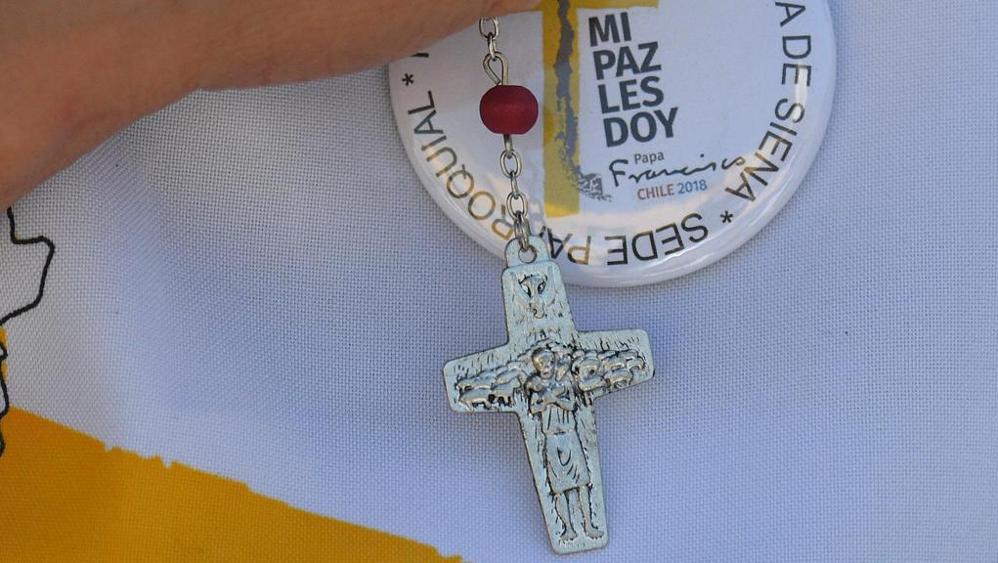
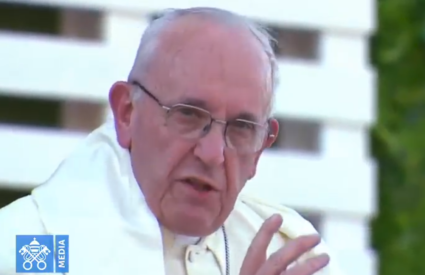 The
Holy Father’s Prepared Remarks
The
Holy Father’s Prepared Remarks
Ariel, I too am happy to be with you. Thank you for your words of welcome in the name of all present. I am the one who is grateful for being able to share this time with you. For me, it is very important for us to meet and walk with one another for a while. Let’s help each other to keep looking ahead!
I am happy that this meeting is taking place here in Maipú. In this land where the history of Chile began with a fraternal embrace, in this Shrine that rises at the crossroads of north and south, that joins the snow and the sea and is a home to both heaven and earth. A home for Chile, a home for you, dear young people, where Our Lady of Carmel waits for you and welcomes you with an open heart. Just as she accompanied the birth of this nation and has accompanied so many Chileans over the span of these two hundred years, so too she wants to keep accompanying the dreams that God places in your hearts: dreams of freedom, dreams of joy, dreams of a better future: the desire, as you said, Ariel, “to be protagonists of change”. To be protagonists. Our Lady of Mount Carmel accompanies you so that you can be protagonists for the Chile of which your hearts dream. I know that the hearts of young Chileans dream, and that they dream big dreams, for these lands have given rise to experiences that spread and multiplied across the different countries of our continent. Who inspired those dreams? It was young people like yourselves, who were inspired to experience the adventure of faith. For faith excites in young people feelings of adventure, an adventure that beckons them to traverse unbelievable landscapes, rough and tough terrain… but, then again, you like adventures and challenges! After all, you get bored when there are no challenges to excite you. We see this clearly, for example, whenever there is a natural disaster. You have an amazing ability to mobilize, which is a sure sign of the generosity of your hearts.
In my ministry as a bishop, I have come to see how many good ideas there are in young people, in their minds and hearts. Young people are restless; they are seekers and idealists. The problem we adults have is that often, like know-it-alls, we say: “They think that way because they are young; they still have to grow up”. As if growing up means accepting injustice, believing that nothing can be done, that this is the way things have always been.
Realizing how important young people and their experiences are, this year I wanted to call the Synod, and before it, the meeting of young people, so that you can feel – and really be – protagonists in the heart of the Church. To help keep the Church’s face young, not by applying cosmetics but by letting her be challenged deep down by her sons and daughters, to help her daily to be more faithful to the Gospel. How much the Church in Chile needs you to “shake the ground beneath our feet” and help us draw closer to Jesus! Your questions, your wanting to know, your desire to be generous, are all necessary for us to draw closer to Jesus. All of us are all invited, ever anew, to draw near to Jesus.
Let me share a story with you. Chatting one day with a young man, I asked him what sort of things made him unhappy. He said to me: “When my cell phone battery runs down or I lose my internet connection”. I asked him: “Why?” He answered: “Father, it’s simple; I miss out on everything that is going on, I am shut off from the world, stuck. In those moments, I jump up and run to find a charger or a Wi-Fi network and a password to reconnect”.
This made me think that the same thing can happen with our faith. After a while on the journey or after an initial spurt, there are moments when, without even realizing it, our “bandwidth” begins to fade and we lose our connection, our power; then we become unhappy and we lose our faith, we feel depressed and listless, and we start to view everything in a bad light. When we lack the “connection” that charges our dreams, our hearts begin to falter. When our batteries are dead, we feel the way the song describes it – “The background noise and the loneliness of the city cut us off from everything. The world turns backward, tries to overwhelm me and drown all my thoughts and ideas”.[1]
Without a connection, a connection to Jesus, we end up drowning our thoughts and ideas, our dreams and our faith, and so we get frustrated and annoyed. As protagonists, which we are and we want to be – we can get to the point of feeling that it makes no difference whether or not we do anything. We start feeling that we are “shut off from the world”, as that young person told me. It worries me that, once they have lost their “connection”, many people think they have nothing to offer; they feel lost. Never think that you have nothing to offer or that nobody cares about you.
Never! That thought, as Alberto Hurtado used to like to say, “is the voice of the devil”, who wants to make you feel you are worthless… and to keep things the way they are. All of us are necessary and important; all of us have something to offer.
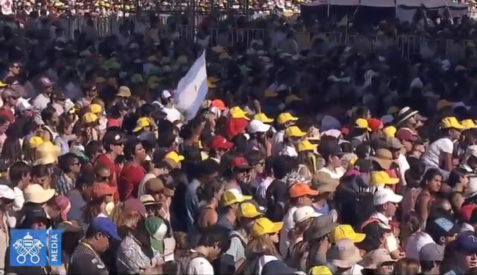 The
young people in the Gospel we heard today wanted that “connection” to help
them keep the flame alive in their hearts. They wanted to know how to charge
the power cells of their heart. Andrew and the other disciple – whose name
is not given, so we can imagine that each of us is that “other” disciple –
were looking for the password to connect with the one who is “the way, and
the truth and the life” (Jn 14:6). It was John the Baptist who showed them
the way. I believe that you too have a great saint who you can be your
guide, a saint who made his life into a song: “I am happy, Lord, I am
happy”. Alberto Hurtado had a golden rule, a rule for setting his heart
ablaze with the fire that keeps joy alive. For Jesus is that fire; everyone
who draws near to it is set ablaze.
The
young people in the Gospel we heard today wanted that “connection” to help
them keep the flame alive in their hearts. They wanted to know how to charge
the power cells of their heart. Andrew and the other disciple – whose name
is not given, so we can imagine that each of us is that “other” disciple –
were looking for the password to connect with the one who is “the way, and
the truth and the life” (Jn 14:6). It was John the Baptist who showed them
the way. I believe that you too have a great saint who you can be your
guide, a saint who made his life into a song: “I am happy, Lord, I am
happy”. Alberto Hurtado had a golden rule, a rule for setting his heart
ablaze with the fire that keeps joy alive. For Jesus is that fire; everyone
who draws near to it is set ablaze.
Hurtado’s password was quite simple – if your phones are turned on, I would like you to key this in. He asks: “What would Christ do in my place?” At school, at university, when outdoors, when at home, among friends, at work, when taunted: “What would Christ do in my place?” When you go dancing, when you are playing or watching sports: “What would Christ do in my place?”
He is the password, the power source that charges our hearts, ignites our faith and makes our eyes sparkle. That is what it means to be a protagonist of history. Our eyes sparkle, for we have discovered that Jesus is the source of life and joy. Protagonists of history, for we wish to pass on that sparkle to hearts that have grown so cold and gloomy that they have forgotten what it means to hope, to all those hearts that are “deadened” and wait for someone to come and challenge them with something worthwhile. Being protagonists means doing what Jesus did.
Wherever you are, with whomever you are with, and whenever you get together: “What would Jesus do?” The only way not to forget a password is by using it over and over. Day after day. The time will come when you know it by heart, and the day will come when, without realizing it, your heart will beat like Jesus’ heart.
It is not enough to hear a sermon or learn an answer from the catechism; we want to live the way Jesus lived. To do that, the young people in the Gospel asked: “Lord, where do you live?” (Jn 1:38). How do you live? We want to live like Jesus, with that “yes” that thrills our hearts.To put oneself on the line, to run risks. Dear friends, be courageous, go out straightaway to meet your friends, people you don’t know, or those having troubles.
Go out with the only promise we have: that wherever you are – in the desert, on the journey, amid the excitement, you will always be “connected”; there will always be a “power source”. We will never be alone. We will always enjoy the company of Jesus, his Mother, and a community. Certainly, a community is not perfect, but that does not mean that it does not have much to love and to give to others.
Dear friends, dear young people: “Be young Samaritans, who never walk past someone lying on the roadside. Be young Simons of Cyrene who helps Christ carry his cross and help alleviate the sufferings of your brothers and sisters. Be like Zacchaeus, who turns his heart from materialism to solidarity. Be like young Mary Magdalene, passionately seeking love, who finds in Jesus alone the answers she needs. Have the heart of Peter, so that you can abandon your nets beside the lake. Have the love of John, so that you can rest all your concerns in him. Have the openness of Mary, so that you can sing for joy and do God’s will.[2]
Dear friends, I would have liked to stay longer. Thank you for this meeting
and for your joyfulness. I ask you one favor: please remember to pray for
me.
__________________
[1] LA LEY, Aquí. [2] CARD. RAÚL SILVA HENRÍQUEZ, Mensaje a los jóvenes (7
October 1979). [00058-EN.01]
https://zenit.org/articles/popes-simple-test-for-youth-what-would-jesus-do/
Tại Giáo Hoàng Học Viện Chí Lợi
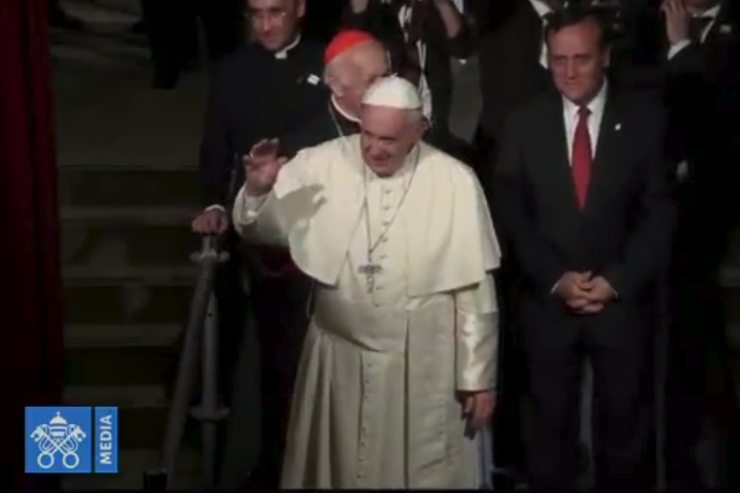
The Holy Father’s Prepared Remarks
Grand Chancellor, Cardinal Ricardo Ezzati,
My Brothers Bishops,
President Dr. Ignacio Sánchez,
Distinguished University Authorities,
Dear Professors and Administrators,
Dear Students,
I am happy to be here with you at this House of Studies, which in its 130 years of life has rendered a priceless service to the country. I thank the President for his words of welcome on behalf of all present.
The history of this university is in some sense woven into the history of Chile. Thousands of men and women who were educated here have made significant contributions to the development of the nation. I would like especially to mention Saint Albert Hurtado, who began his studies here a century ago. His life is a clear testimony to how intelligence, academic excellence, and professionalism, when joined to faith, justice and charity, far from weakening, attain a prophetic power capable of opening horizons and pointing the way, especially for those on the margins of society.
In this regard, I would like to take up your words, dear President, when you said: “We have important challenges for our country that have to do with peaceful coexistence as a nation and the ability to progress as a community”.
To speak of challenges is to acknowledge that situations have reached the point where they need to be rethought. What was hitherto an element of unity and cohesion now calls for new responses. The accelerated pace and a sense of disorientation before new processes and changes in our societies call for a serene but urgent reflection that is neither naïve nor utopian, much less arbitrary. This has nothing to do with curbing the growth of knowledge, but rather with making the University a privileged space for “putting into practice the grammar of dialogue, which shapes encounter”.[1] For “true wisdom [is] the fruit of reflection, dialogue and generous encounter between persons”.[2]
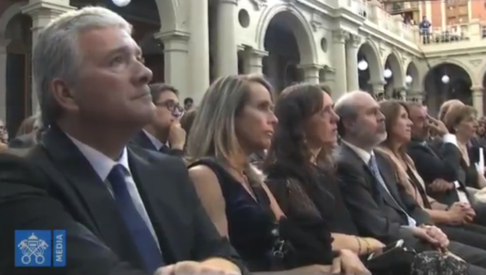 Peaceful
coexistence as a nation is possible, not least to the extent that we can
generate educational processes that are also transformative, inclusive and
meant to favor such coexistence. Educating for peaceful coexistence does not
mean simply attaching values to the work of education, but rather
establishing a dynamic of coexistence internal to the very system of
education itself. It is not so much a question of content but of teaching
how to think and reason in an integrated way. What was traditionally called
forma mentis.
Peaceful
coexistence as a nation is possible, not least to the extent that we can
generate educational processes that are also transformative, inclusive and
meant to favor such coexistence. Educating for peaceful coexistence does not
mean simply attaching values to the work of education, but rather
establishing a dynamic of coexistence internal to the very system of
education itself. It is not so much a question of content but of teaching
how to think and reason in an integrated way. What was traditionally called
forma mentis.
To achieve this, it is necessary to develop what might be called an “integrating literacy” capable of encompassing the processes of change now taking place in our societies. This literacy process requires working simultaneously to integrate the different languages that constitute us as persons. That is to say, an education (literacy) that integrates and harmonizes intellect (the head), affections (the heart) and activity (the hands). This will offer students a growth that is harmonious not only at the personal level but also at the level of society. We urgently need to create spaces where fragmentation is not the guiding principle, even for thinking. To do this, it is necessary to teach how to reflect on what we are feeling and doing; to feel what we are thinking and doing; to do what we are thinking and feeling. An interplay of capacities at the service of the person and society.
Literacy, based on the integration of the distinct languages that shape us, will engage students in their own educational process, a process that will prepare them to face the challenges of the immediate future. The “divorce” of fields of learning from languages, and illiteracy with regard to integrating the distinct dimensions of life, bring only fragmentation and social breakdown. In this “liquid” society [3] or “society of lightness”, [4] as various thinkers have termed it, those points of reference that people use to build themselves individually and socially are disappearing. It seems that the new meeting place of today is the “cloud”, which is characterized by instability since everything evaporates and thus loses consistency.
This lack of consistency may be one of the reasons for the loss of a consciousness of the importance of public life, which requires a minimum ability to transcend private interests (living longer and better) in order to build upon foundations that reveal that crucial dimension of our life which is “us”.
Without that consciousness, but especially without that feeling and consequently without that experience, it is very difficult to build the nation. As a result, the only thing that appears to be important and valid is what pertains to the individual, and all else becomes irrelevant. A culture of this sort has lost its memory, lost the bonds that support it and make its life possible. Without the “us” of a people, of a family and of a nation, but also the “us” of the future, of our children and of tomorrow, without the “us” of a city that transcends “me” and is richer than individual interests, life will be not only increasingly fragmented, but also more conflictual and violent.
The university, in this context, is challenged to generate within its own precincts new processes that can overcome every fragmentation of knowledge and stimulate true universities.
Hence, the second key element for this House of Studies: the ability to progress as a community.
I was pleased to learn of the evangelizing outreach and the joyful vitality of your university chaplaincy, which is a sign of a young, lively Church that “goes forth”. The missions that take place each year in different parts of the country are an impressive and enriching reality. With these, you are able to broaden your outlook and encounter different situations that, along with regular events, keep you on the move. “Missionaries” are never equal to the mission; they learn to be sensitive to God’s pace through their encounter with all sorts of people.
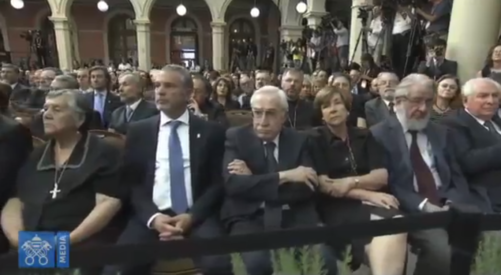 Such
experiences cannot remain isolated from the life of the university. The
classic methods of research are experiencing certain limits, more so when it
is a question of a culture such as ours, which stimulates direct and
immediate participation by all. Present-day culture demands new forms that
are more inclusive of all those who make up social and hence educational
realities. We see, then, the importance of broadening the concept of the
educating community.
Such
experiences cannot remain isolated from the life of the university. The
classic methods of research are experiencing certain limits, more so when it
is a question of a culture such as ours, which stimulates direct and
immediate participation by all. Present-day culture demands new forms that
are more inclusive of all those who make up social and hence educational
realities. We see, then, the importance of broadening the concept of the
educating community.
The challenge for this community is to not isolate itself from modes of knowledge, or, for that matter, to develop a body of knowledge with minimal concern about those for whom it is intended. It is vital that the acquisition of knowledge lead to an interplay between the university classroom and the wisdom of the peoples who make up this richly blessed land. That wisdom is full of intuitions and perceptions that cannot be overlooked when we think of Chile. An enriching synergy will thus come about between scientific rigor and popular insight; the close interplay of these two parts will prevent a divorce between reason and action, between thinking and feeling, between knowing and living, between profession and service. Knowledge must always sense that it is at the service of life, and must confront it directly in order to keep progressing. Hence, the educational community cannot be reduced to classrooms and libraries but must be continually challenged to participation. This dialogue can only take place on the basis of an episteme capable of “thinking in the plural”, that is, conscious of the interdisciplinary and interdependent nature of learning. “In this sense, it is essential to show special care for indigenous communities and their cultural traditions. They are not merely one minority among others, but should be the principal dialogue partners, especially when large projects affecting their land are proposed”. [5]
The educational community can enjoy an endless number of possibilities and potentialities if it allows itself to be enriched and challenged by all who are part of the educational enterprise. This requires an increased concern for quality and integration. The service that the university offers must always aim for quality and excellence in the service of national coexistence. In this way, we could say that the university becomes a laboratory for the future of the country, insofar as it succeeds in embodying the life and progress of the people, and can overcome every antagonistic and elitist approach to learning.
An ancient cabalistic tradition says that evil originates in the rift produced in the human being by eating from the tree of the knowledge of good and evil. Knowledge thus gained the upper hand over creation, subjecting it to its own designs and desires.[6] This will always be a subtle temptation in every academic setting: to reduce creation to certain interpretative models that deprive it of the very Mystery that has moved whole generations to seek what is just, good, beautiful and true. Whenever a “professor”, by virtue of his wisdom, becomes a “teacher”, he is then capable of awakening wonderment in our students. Wonderment at the world and at an entire universe waiting to be discovered!
In our day, the mission entrusted to you is prophetic. You are challenged to generate processes that enlighten contemporary culture by proposing a renewed humanism that eschews every form of reductionism. This prophetic role demanded of us prompts us to seek out ever new spaces for dialogue rather than confrontation, spaces of encounter rather than division, paths of friendly disagreement that allow for respectful differences between persons joined in a sincere effort to advance as a community towards a renewed national coexistence.
If you ask for this, I have no doubt that the Holy Spirit will guide your steps, so that this House will continue to bear fruit for the good of the Chilean people and for the glory of God.
I thank you once again for this meeting, and I ask you to remember to pray for me.
_____________________
[1] Address to the Plenary of the Congregation for Catholic Education (9 February 2017).
NGÀY 16/1 THỨ BA
(xin bấm vào các cái links mầu xanh để xem hình ảnh, hình quay / video và văn tự bài nói bằng tiếng Anh)
8:20 - Gặp gỡ Quan Chức Chính Quyền, Xã Hội Dân Sự và Ngoại Giao Đoàn ở Dinh La Moneda
| Meeting with Authorities, the Civil Society and the Diplomatic Corps |
(xin xem bản dịch bài giảng của ngài ở dưới cuối ngày)
9:00 - Thăm Tổng Thống tại "Phòng Xanh" ở Dinh La Moneda
10:30 - Dâng Thánh Lễ ở Công Viên O'Higgins
(xin xem bản dịch bài giảng của ngài ở dưới cuối ngày)
16:00 - Ghé Thăm Trung Tâm Hoán Cải Nữ Giới ở Santiago
| Short visit to the Female Central Penitentiary |
17:15 - Gặp gỡ các Vị Linh Mục, Tu Sĩ Nam Nữ và Chủng Sinh ở Vương Cung Thánh Đường Santiago
| Meeting with Priests, Religious Men and Women, Consecrated and Seminarians |
18:15 - Gặp gỡ các vị Giám Mục tại Phòng Áo Vương Cung Thánh Đường Santiago
| Meeting with the Bishops |
19:15 - Viếng Thăm riêng tư Đền Thánh được cung hiến cho Thánh Alberto Hurtado Dòng Tên và gặp gỡ các linh mục Dòng Tên
Gặp gỡ Quan Chức Chính Quyền, Xã Hội Dân Sự và Ngoại Giao Đoàn

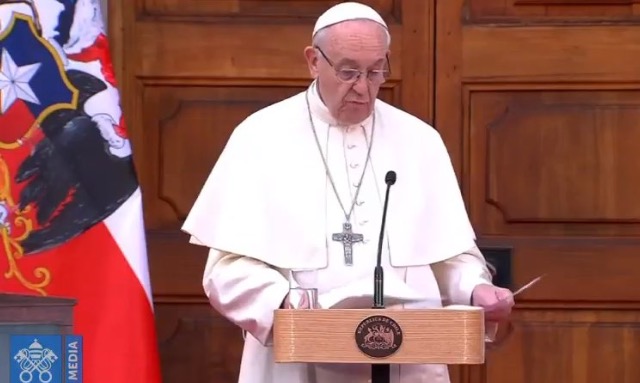
........
Chí Lợi trở thành nổi bật trong các thập niên gần đây, nhờ ở tình trạng tăng trưởng về một nền dân chủ giúp cho nó có thể vững vàng tiến bộ. Các cuộc chọn bầu chính trị gần đây đã chứng tỏ cho thấy tình đoàn kết và tình trạng trưởng thành về dân sự mà quí vị đã đạt được, một chứng tỏ có một ý nghĩa đặc biệt trong năm đánh dấu 200 năm việc tuyên ngôn độc lập của nó. Đó là một thời khắc đặc biệt quan trọng, vì nó hình thành định mệnh của quí vị như là một dân tộc được đặt nền móng trên tự do và luật pháp, một dân tộc đã từng đương đầu với những giây phút hỗn loạn, có những lúc đau thương, nhưng đã thắng vượt được chúng. Nhờ đó quí vị đã có thể củng cố và khẳng định giấc mơ của thành phần cha ông gầy dựng của quí vị.........
Thách đố của quí vị là một thứ thách đố cao cả và hào hứng: đó là tiếp tục hoạt động để làm nên nền dân chủ ấy, như các vị tiền bối của quí vị đã mơ ước, vượt ra ngoài những chiều kích chính thức của nó, về một nơi chốn hội ngộ thực sự cho tất cả mọi người. Đó là làm cho nó thành một nơi cho hết mọi người không trừ ai đều cảm thấy được kêu gọi để liên kết trong việc xây dựng một ngôi nhà, một gia đình và một quốc gia. Một nơi chốn, một ngôi nhà và một gia đình được gọi là Chí Lợi: quảng đại và đón nhận, được yêu thích nơi lịch sử của nó, dấn thân cho mối hòa hợp xã hội hiện nay, và hy vọng hướng về tương lai. Đến đây chúng ta cần nhắc lại những lời của Thánh Alberto Hurtado: "Một quốc gia là một sứ vụ cần phải được hoàn thành, hơn cả biên cương bờ cõi của nó, hơn cả đất nước của nó, hơn cả các rặng núi non, biển cả của nó, hơn cả ngôn ngữ hay các truyền thống của nó" (Cf. Te Deum [September 1948]). Nó là một thứ tương lai. Và tương lai đó phần lớn lệ thuộc vào khả năng của dân tộc và của các nhà lãnh đạo của nó trong việc lắng nghe.
Khả năng lắng nghe là những gì quan trọng nhất ở quốc gia này, một quốc gia đa dạng về chủng tộc, văn hóa và lịch sử là những gì cần phải được bảo trì cho khỏi tất cả mọi thứ tinh thần bè phái hay các nỗ lực thống trị, trái lại nó tác động khả năng bẩm sinh của chúng ta trong việc thay thế những thứ ý hệ hẹp hòi bằng một mối quan tâm lành mạnh cho công ích (thứ công ích không có tính cách cộng đồng không bao giờ là một sự thiện). Cần phải lắng nghe.... Lắng nghe trẻ em là thành phần đang nhìn thế giới này bằng những cặp mắt đầy bỡ ngỡ lạ lùng và ngây thơ vô tội, và mong đợi từ chúng ta những câu trả lời cụ thể cho một tương lai xứng đáng. Đến đây tôi cảm thấy buộc phải bày tỏ nỗi đớn đau và niềm tủi hổ của tôi về việc tác hại bất khả cứu vãn đã gây ra cho trẻ em bởi một số thừa tác viên của Giáo Hội. Tôi xin hợp với chư huynh giám mục của tôi trong việc cần phải xin tha thứ và làm hết sức hỗ trợ các nạn nhân, đang khi chúng tôi quyết tâm bảo đảm là những điều ấy không tái diễn nữa.....
https://zenit.org/articles/popes-address-to-chilean-authorities-diplomatic-corps/
Đaminh Maria Cao Tấn Tĩnh, BVL, tuyển dịch
Giảng Lễ
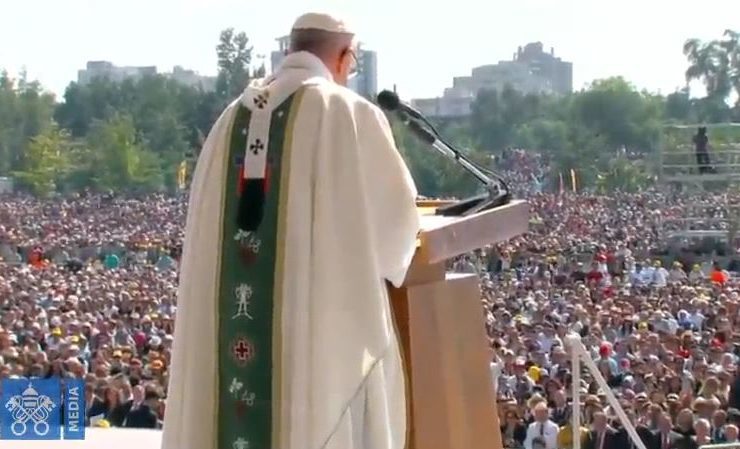
"Khi Chúa Giêsu trông thấy đám đông" (Mathêu 5:1). Nơi những lời đầu tiên này của Bài Phúc Âm hôm nay, chúng ta khám phá ra cách thức Chúa Giêsu muốn gặp gỡ chúng ta, cách thức Thiên Chúa luôn gây cho dân của Ngài ngạc nhiên (xem Xuất Hành 3:7). Điều đầu tiên Chúa Giêsu làm đó là nhìn ra và nhìn vào gương mặt của dân Người. Những gương mặt ấy được tình yêu sâu xa của Thiên Chúa tác động. Tâm can của Chúa Giêsu không bị tác động bởi các ý nghĩ hay quan niệm, mà là bởi các bộ mặt, bởi các con người. Bởi sự sống kêu gọi thứ Sự Sống Thiên Chúa muốn ban cho chúng ta.
Khi Chúa Giêsu trông thấy đám đông là Người trông thấy các khuôn mặt của những ai theo Người, và điều đáng kể nhất đó là về phần mình họ gặp được nơi ánh mắt của Chúa Giêsu cái âm vang của những gì họ trông mong và khao khát. Cuộc gặp gỡ này làm nẩy sinh một bộ các thứ Phúc Đức, một chân trời chúng ta được kêu gọi hướng tới và thách đố chúng ta lên đường. Các Phúc Đức này không phải là hoa trái của tính cách thụ động khi chạm trán với thực tại, cũng không phải là hoa trái của một kẻ thuần túy ngó xem trong việc thâu thập những thứ thống kê nghiệt ngã về các biến cố đương đại. Chúng không phải là sản phẩm của những tay tiên tri mờ ám chỉ tìm cách gây chán nản. Chúng cũng không xuất phát từ những thứ ảo tưởng hứa hẹn hạnh phúc bằng duy một "tiếng cạch", bằng một chớp mắt. Trái lại, các thứ Phúc Đức này được phát xuất từ tấm lòng cảm thương của Chúa Giêsu, một tấm lòng gặp gỡ tâm can của con người nam nữ đang tìm kiếm và thao thức một cuộc đời hạnh phúc.....
Các Phúc Đức ấy không phải là hoa trái của một thái độ phê bình quá khắt khe hay là "những lời lẽ rẻ tiền" của những ai nghĩ rằng họ biết hết tất cả nhưng lại không muốn dấn thân cho bất cứ sự gì hay cho bất cứ một ai, và tiến đến chỗ tránh né bất cứ cơ hội nào gây ra các tiến trình thay đổi và tái cấu trúc trong cộng đồng của chúng ta cũng như trong đời sống của chúng ta. Các Phúc Đức ấy được xuất phát từ một cõi lòng nhân ái không bao giờ thôi hy vọng. Một cõi lòng cảm thấy niềm hy vọng như là "một ngày mới, một thứ tẩy chay những gì là ù lì, một thứ lay chuyển những gì là tiêu tàn và tiêu cực" (Pablo Neruda, El habitante y su esperanza, 5).
Chúa Giêsu, khi tuyên bố phúc cho kẻ nghèo khó, kẻ buồn thương, kẻ khốn khổ, kẻ hiền lành, kẻ xót thương... đến để loại trừ đi những gì là ù lì làm tê liệt những ai không còn tin tưởng vào quyền năng biến đổi của Thiên Chúa là Cha của chúng ta, cũng như vào anh chị em của chúng ta, nhất là những người bị tổn thương nhất và bị tẩy chay loại trừ. Chúa Giêsu, trong việc loan báo các Phúc Đức, đang lay chuyển chúng ta cho khỏi những gì là tiêu cực, thứ tiêu cực theo chiều hướng thoái lui làm cho chúng ta nghĩ rằng chúng ta có thể sống một cuộc đời khá hơn nếu chúng ta thoát ly khỏi các vấn đề của chúng ta, xa tránh kẻ khác, thu mình vào cuộc sống thoải mái của mình, không còn biết gì khác ngoài hưởng thụ (cf. Apostolic Exhortation Evangelii Gaudium, 2). Cái cảm quan thoái lui này có khuynh hướng cô lập hóa chúng ta khỏi người khác, chia rẽ và phân cách chúng ta, bịt mắt chúng ta lại trước đời sống chung quanh chúng ta cũng như trước nỗi đớn đau của người khác....
Hãy gieo rắc hòa bình bằng việc gần gũi, cận kề! Bằng việc ra khỏi nhà của chúng ta và nhìn vào khuôn mặt của con người ta, bằng việc lên đường gặp gỡ những ai đang gặp lúc khó khăn, những ai đang bị đối xử không như là một con người, không như là một người con nam nữ của đất nước này. Đó là cách thức duy nhất chúng ta cần phải sử dụng để làm nên một tương lai hòa bình, để cấu tạo một cơ cấu vững chắc. Một con người đi xây dựng hòa bình thì biết rằng không đủ khi chỉ nói rằng: "Tôi không gây tổn thương cho bất cứ người nào". Như Thánh Alberto Hurtado thường nói: "Rất tốt khi không làm sai, nhưng rất xấu khi không làm tốt" (Meditación radial, April 1944)...
https://zenit.org/articles/popes-homily-during-mass-in-santiago-chile-full-text/
Đaminh Maria Cao Tấn Tĩnh, BVL, tuyển dịch
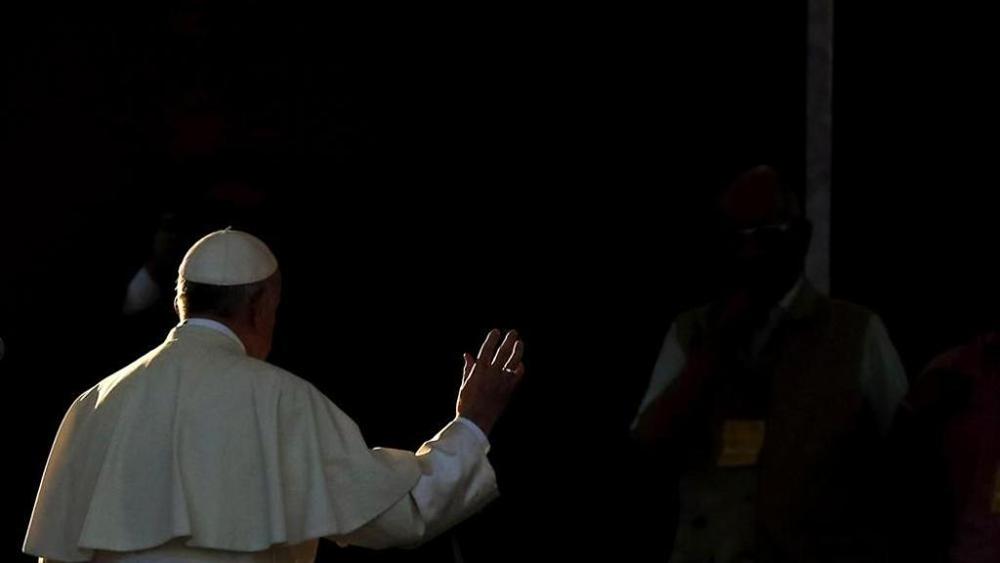
On the day in which he expressed his shame at the sexual abuse of minors committed by members of the clergy and religious, asking for forgiveness and assuring that the Church will do everything to ensure that these facts do not happen again, Francis met and embraced some victims in a strictly private form. We do not know how many they were (it was a small group), nor do we know their names.
The meeting took place on Tuesday 16 January, after lunch, in the apostolic nunciature of Santiago de Chile. The paedophilia scandal, which involves dozens of priests, some influential such as Fernando Karadima, the formator of many priests some of whom have become bishops, has deeply marked the attitude of many people towards the Catholic Church in the country. Recently, in August 2017, new cases have emerged concerning a Marist religious.
Director of the Holy See Press Office, Greg Burke, said that "the meeting took place in a strictly private form and no one else was present, only the Pope and the victims". In this way, the spokesman continued, "they could speak of their suffering to Pope Francis, who listened to them and prayed and cried with them". Burke declined to give details about each individual case and said that the meeting lasted just over half an hour.
Pope Francis, following the example of his predecessor Benedict XVI had already met with victims in September 2015, in Philadelphia. On that occasion he said to them, "Words cannot fully express my grief at the abuse you have suffered. You are precious children of God and you should always expect our protection, care and love. I am deeply sorry that your innocence has been violated by those you trusted”.
For those "who have been abused by a clergy member, I am deeply sorry every time you or your families have reported abuse and have not been heard or believed. Please believe that the Holy Father listens to you and believes you. I deeply regret that some bishops have failed in their responsibility to protect children. It is very worrying to know that in some cases it was the bishops themselves who committed the abuses. I promise you that we will follow the path of truth wherever it may take us."
http://www.lastampa.it/2018/01/17/vaticaninsider/eng/the-vatican/chile-the-pope-meets-some-victims-of-abuse-and-cries-with-them-tC1565oAI6MP6RNmVmFRDL/pagina.html
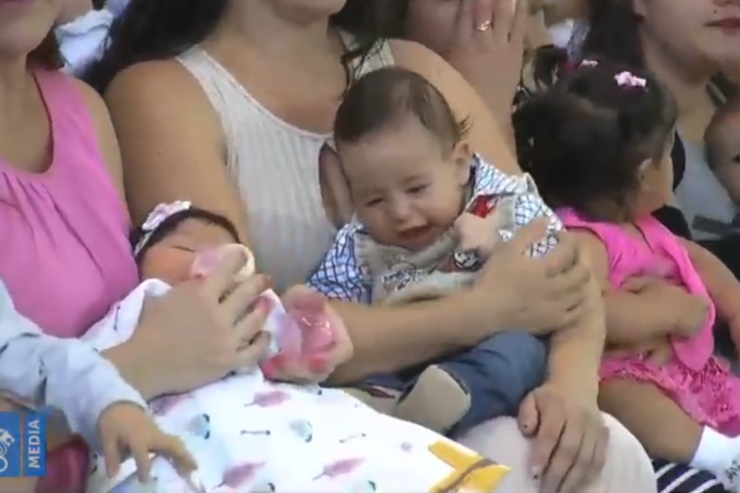
SHORT VISIT TO THE WOMEN´S PENITENTIARY OF SANTIAGO
Dear Sisters and Brothers:
Thankyou, thankyou, thankyou for what you have done and thank you for giving me this opportunity to visit you. For me it is important to share this time with you and draw closer to our many brothers and sisters presently deprived of their freedom. Thank you, Sister Nelly, for your kind words and especially for testifying that life always triumphs over death, always. Thank you, Janeth, for coming forward and sharing your hurt with all of us, and for your courageous request for forgiveness. How much we all have to learn from your act of courage and humility! I quote your words: “We ask forgiveness from all those whom we have harmed by our misdeeds”. I thank you for reminding us that without this attitude we lose our humanity, all of us need to ask forgiveness, me first of all, all of us, that is what makes us human. Without this attitude of asking forgiveness, we forget that we did wrong and that we can make mistakes and that every day is an invitation to start over, one way or another.
I also think of the words of Jesus: “Let him who is without sin among you be the first to throw a stone” (Jn 8:7). And do you know what I tend to do in my homilies when I speak about all of us having something inside either due to weakness or because we fall or because we hide it well? I tell the people: Let’s see, we are all sinners, we all have sins. I don’t know, is there anyone here without sin? Raise you hand. No one dares raise their hand. Jesus asks us to leave behind the simplistic way of thinking that divides reality into good and bad, and to enter into that other mindset that recognizes our weaknesses, limitations and even sins, and thus helps us to keep moving forward.
As I came in, some mothers met me with their children. They welcomed me, and their welcome can nicely be expressed in two words: mother and children.
Mother. Many of you are mothers and you know what it means to bring a new life into the world. You were able to “take upon yourself” a new life and bring it to birth. Motherhood is not, and never will be a problem. It is a gift, and one of the most wonderful gifts you can ever have. Today you face a very real challenge: you also have to care for that life. You are asked to care for the future. To make it grow and to help it to develop. Not just for yourselves, but for your children and for society as a whole. As women, you have an incredible ability to adapt to new circumstances and move forward. Today I appeal to that ability to bring forth the future that is alive in each one of you. That ability enables you to resist everything that might rob you of your identity and end up by killing your hope. None of us are things, we are all persons and as such we have the dimension of hope. Let us not be robbed of our identity. I am not a number, I am not prisoner with a given number, I have a name and I have the ability to bring forth hope, because I want to give birth to hope.
Janeth was right: losing our freedom does not mean losing our dreams and hopes. This is true, it is very painful, but this does not mean losing hope, nor losing the ability to dream. Losing our freedom is not the same thing as losing our dignity, it is not the same thing. Dignity must not be touched, it must be cared for, protected, and shown tenderness. No one must be deprived of dignity. You are deprived of freedom. That is why we need to reject all those petty clichés that tell us we can’t change, that it’s not worth trying, that nothing will make a difference. As the Argentinean Tango says: “Go ahead, keep it up, we’ll all meet there in hell”. It’s not true that we cannot make a difference. No, dear sisters! Some things do make a difference! All those efforts we make to build for a better future – even if often it seems they just go down the drain – all of them will surely bear fruit and be rewarded.
The second word is children. Children are our strength, our future, our incentive. They are a living reminder that life has to be lived for the future, not remain in the past. Today your freedom has been taken away, but that is not the last word. Not at all! Keep looking forward. Look ahead to the day when you will return to life in society. A prison sentence without a future is not a human sentence, it is a torture. Every sentence being lived out to pay a debt to society must have a perspective, that is it must have the horizon of reintegration and preparation for being reintegrated. This is something you must demand of society. Always have this outlook, look forwards, towards reintegration into today’s society. For this reason, I applaud and encourage every effort to spread and support projects like Espacio Mandela and the Fundación Mujer levántate.
The name of that Foundation makes me think of the Gospel passage where people laughed at Jesus because he said that the daughter of the synagogue leader wasn’t dead, but only asleep. They laughed at him. Jesus showed us how to meet that kind of derision: he went straight to her room, took her by the hand and said: “Little girl, get up!” (Mk 5:41). For all, the girl was dead, but for Jesus, not so. Projects like those I mentioned are a living sign of this Jesus, who enters into each of our homes, pays no attention to ridicule and never gives up. He takes us by the hand and tells us to “get up”. It is wonderful that so many Christians and people of good will, that there are people of different beliefs in life or who have no religion but show good will, who follow in the footsteps of Jesus and decide to come here to be a sign of that outstretched hand us that lifts us up. I ask you: “Get up”. Always get up.
We all know that, sadly, a jail sentence can be thought of or reduced to the idea of a punishment, offering no opportunities for personal growth. This is what I was explaining about hope, about looking forwards, generating processes of reintegration. This must be your dream: reintegration. If the path is long, do your best to make it shorter, but always with the idea of reintegration. Society has an obligation to provide for your reintegration, for all of you. When I say this, I mean to reintegrate each of you in your own personal way. One will do it one way, another will do it in a different way. One will take more time, another less. But it is always a person who is being reintegrated. Please have this firmly in your minds and demand it. This is what it means to generate a process. On the contrary, those initiatives that offer job training and help to rebuild relationships are signs of hope for the future. Let us help them to grow. Public order must not be reduced to stronger security measures, but should be concerned primarily with preventive measures, such as work, education, and greater community involvement.
With these thought I want to bless all of you and also greet the pastoral workers, volunteers and professional personnel, especially the police officers and their families. I pray for you. Your work is sensitive and complex, and so I ask you, the authorities, to try to provide the conditions needed to carry out your work with dignity. A dignity that engenders dignity. Dignity is contagious, more so than the flu. Dignity is contagious, dignity engenders dignity.
Mary is our Mother and we are her children, you are her daughters. We ask her to intercede for you, for each of your children and your dear ones. May she cover you with her mantle. And I ask you, please, pray for me because I need it.
The flowers you have given me, I will bring to the Blessed Virgin in the name of all of you. Once again, many thanks!
Gặp gỡ các Vị Linh Mục, Tu Sĩ Nam Nữ và Chủng Sinh
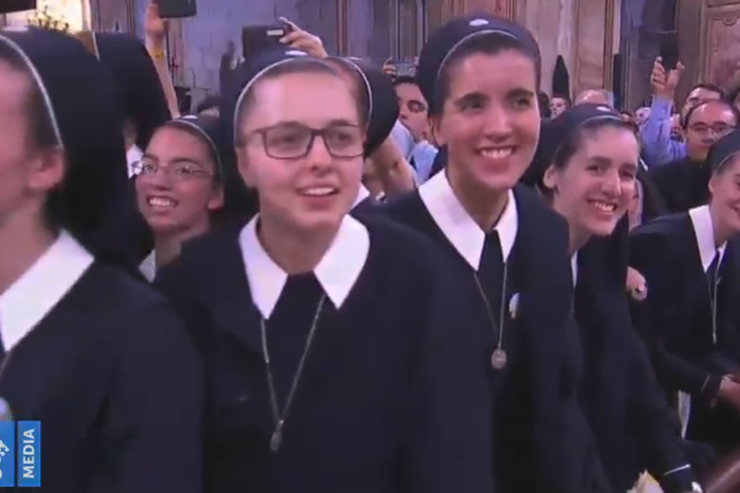
The Holy Father’s Prepared Remarks
Dear Brothers and Sisters,
I am happy to be meeting with you. I like the way that Cardinal Ezzati presented you: Here they are… consecrated women, consecrated men, priests, permanent deacons, and seminarians. It made me think of the day of our ordination or consecration when after being presented, each of us said: “Here I am, Lord, to do your will”. In this meeting, we want to tell the Lord: “Here we are”, and renew our “yes” to him. We want to renew together our response to the call that one day took our hearts by surprise.
I think that it can help us to start with the Gospel passage that we heard, and to share three moments experienced by Peter and the first community: Peter and the community disheartened, Peter and the community shown mercy, and Peter and the community transfigured. I play with this pairing of Peter and the community since the life of apostles always has this twofold dimension, the personal and the communitarian. They go hand-in-hand and we cannot separate them. We are called individually but always as part of a larger group. Where vocation is concerned, there is no such thing as a selfie! Vocation demands that somebody else take your picture, and that is what we are about to do!
1. Peter disheartened
I have always liked the way the Gospels do not adorn or soften things or paint them in nice colors. They show us life as it is and not as it should be. The Gospel is not afraid to show us the difficult, and even tense, moments experienced by the disciples.
Let us reconstruct the scene. Jesus had been killed, but some women said he was alive (Lk 24:22-24). Even after the disciples had seen the risen Jesus, the event was so powerful that they needed time to be able to understand what had happened. That understanding would come to them at Pentecost with the sending of the Holy Spirit. The encounter with the Risen Lord would require time to find a place in the hearts of his disciples.
The disciples go home. They go back to do what they knew how to do: to fish. Not all of them, but only some of them. Were they divided? Fragmented? We don’t know. The Scriptures tell us that those who were there caught nothing. Their nets were empty.
Yet another kind of emptiness unconsciously weighed upon them: dismay and confusion at the death of their Master. He was no more; he had been crucified. But not only was he crucified but so were they, since Jesus’s death raised a whirlwind of conflicts in the hearts of his friends. Peter had denied him; Judas had betrayed him; the others had fled and hid themselves. Only a handful of women and the beloved disciple remained. The rest took off. In a matter of days, everything had fallen apart. These are the hours of dismay and confusion in the life of the disciple. There are times “when the tempest of persecutions, tribulations, doubts, and so forth, is raised by cultural and historical events, it is not easy to find the path to follow. Those times have their own temptations: the temptation to debate ideas, to avoid the matter at hand, to be too concerned with our enemies… And I believe that the worst temptation of all is to keep dwelling on our own unhappiness”.[1] Yes, dwelling on our own unhappiness.
As Cardinal Ezzati told us, “the priesthood and consecrated life in Chile have endured and continue to endure difficult times of significant upheavals and challenges. Side by side with the fidelity of the immense majority, there have sprung up weeds of evil and their aftermath of scandal and desertion”.
Times of upheaval. I know the pain resulting from cases of abuse of minors and I am attentive to what you are doing to respond to this great and painful evil. Painful because of the harm and sufferings of the victims and their families, who saw the trust they had placed in the Church’s ministers betrayed. Painful too for the suffering of ecclesial communities, but also painful for you, brothers and sisters, who, after working so hard, have seen the harm that has led to suspicion and questioning; in some or many of you this has been a source of doubt, fear or a lack of confidence. I know that at times you have been insulted in the metro or walking on the street and that by going around in clerical attire in many places you pay a heavy price. For this reason, I suggest that we ask God to grant us the clear-sightedness to call reality by its name, the strength to seek forgiveness and the ability to listen to what he tells us.
There is something else I would like to mention. Our societies are changing. Chile today is quite different from what I knew in my youth, when I was at school. New and different cultural expressions are being born which do not fit into our familiar patterns. We have to realize that many times we do not know how to deal with these new situations. Sometimes we dream of the “fleshpots of Egypt” and we forget that the promised land lies ahead of us, that the promise is not about yesterday but about tomorrow. We can yield to the temptation of becoming closed, isolating ourselves and defending our ways of seeing things, which then turn out as nothing more than fine monologues. We can be tempted to think that everything is wrong, and in place of “good news”, the only thing we profess is apathy and disappointment. As a result, we shut our eyes to the pastoral challenges, thinking that the Spirit has nothing to say about them. In this way, we forget that the Gospel is a journey of conversion, not just for “others” but for ourselves as well.
Whether we like it or not, we are called to face reality as it is – our own personal reality and the reality of our communities and societies. The nets – the disciples say – are empty, and we can understand their feelings. They return home with no great tales to tell; they go back empty-handed; they return disheartened.
What became of those strong, enthusiastic and elegant disciples who felt themselves chosen and had left everything to us follow Jesus (cf. Mt 1:16-20)? What became of those disciples who were so sure of themselves that they would go to prison and even give their lives for the Master (cf. Lk 22:33), who to defend him would have liked to send fire upon the earth (cf. Lk 9:54). For whom they would unsheathe their swords and fight (cf. Lk 22:49-51)? What became of that Peter who reproached the Master about how he should live his life (cf. Mk 8:31-33)?
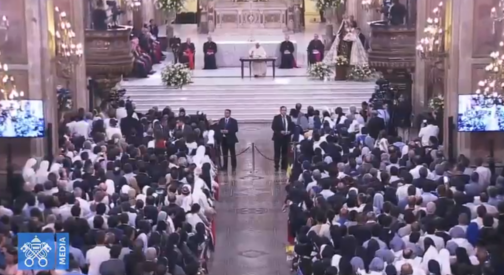 2.
Peter shown mercy
2.
Peter shown mercy
It is the hour of truth in the life of the first community. It is time for Peter to have to confront a part of himself. The part of him that many times he didn’t want to see. He experienced his limitation, his frailty, and his sinfulness. Peter, the temperamental, impulsive leader and savior, self-sufficient and over-confident in himself and in his possibilities, had to acknowledge his weakness and sin. He was a sinner like everyone else, as needy as the others, as frail as anyone else. Peter had failed the one he had promised to protect. It is a crucial moment in Peter’s life. As disciples, as Church, we can have the same experience: there are moments when we have to face not our success but our weakness. Crucial moments in the life of a disciple, but also the times when an apostle is born. Let us allow the text to guide us.
“When they had finished breakfast, Jesus said to Simon Peter, “Simon son of
John, do you
love me more than these?” (Jn 21:15).
After they ate, Jesus takes Peter aside and his only words are a question, a
question about love: Do you love me? Jesus neither reproaches nor condemns.
The only thing that he wants to do is to save Peter. He wants to save him
from the danger of remaining closed in on his sin, constantly dwelling with
remorse on his frailty, the danger of giving up, because of that frailty, on
all the goodness he had known with Jesus. Jesus wants to save him from
self-centeredness and isolation. He wants to save him from the destructive
attitude of becoming a victim or of thinking “what does it matter”, which
waters down any commitment and ends up in the worst sort of relativism.
Jesus wants to set him free from seeing his opponents as enemies and being
upset by opposition and criticism. He wants to free him from being downcast
and, above all, negative. By his question, Jesus asks Peter to listen to his
heart and to learn how to discern. Since “it was not God’s way to defend the
truth at the cost of charity, or charity at the cost of truth, or to smooth
things away at the cost of both. Jesus wants to avoid turning Peter into
someone who hurts others
by telling the truth, or is kind to others by telling lies, or simply
someone paralyzed by his own uncertainty”,[2] as can happen to us in these
situations.
Jesus questioned Peter about love and kept asking until Peter could give him a realistic response: “Lord, you know everything; you know that I love you” (Jn 21:17). In this way, Jesus confirms him in his mission. In this way, he now makes him definitively his apostle. What is it that confirms Peter as an apostle? What sustains us as apostles? One thing only: that we “received mercy” (1 Tim 1:12-16). “For all our sins, our limitations, our failings, for all the many times we have fallen, Jesus has looked upon us and drawn near to us. He has given us his hand and shown us mercy. All of us can think back and remember the many times the Lord looked upon us, drew near and showed us mercy”.[3] We are not here because we are better than others; we are not superheroes who stoop down from the heights to encounter mere mortals. Rather, we are sent as men and women conscious of having been forgiven. That is the source of our joy. We are consecrated, shepherds modelled on Jesus, who suffered died and rose. A consecrated man or woman sees his or her wounds as signs of the resurrection; who sees in the wounds of this world the power of the resurrection; who, like Jesus, does not meet his brothers and sisters with reproach and condemnation.
Jesus Christ does not appear to his disciples without his wounds; those very wounds enabled Thomas to profess his faith. We are not asked to ignore or hide our wounds. A Church with wounds can understand the wounds of today’s world and make them her own, suffering with them, accompanying them and seeking to heal them. A wounded Church does not make herself the centre of things, does not believe that she is perfect, but puts at the centre the one who can heal those wounds, whose name is Jesus Christ
The knowledge that we are wounded sets us free. Yes, it sets us free from becoming self-referential and thinking ourselves superior. It sets us free from the Promethean tendency of “those who ultimately trust only in their own powers and feel superior to others because they observe certain rules or remain intransigently faithful to a particular Catholic style of the past”.[4]
In Jesus, our wounds are risen.
They inspire solidarity; they help us to tear down the walls that
enclose us in elitism and they impel us to build bridges and to encounter
all those yearning for that merciful love which Christ alone can give. “How
often we dream up vast apostolic projects, meticulously planned, just like
defeated generals! But this is to deny our history as a Church, which is
glorious precisely because it is a history of sacrifice, of hopes and daily
struggles, of lives spent in service and fidelity to work, tiring as it may
be, for all work is ‘the sweat of our brow’”.[5] I am concerned when I see
communities more worried about their image, about occupying spaces, about
appearances and publicity, than about going out to touch the suffering of
our faithful people. How searching and insightful were the words of warning
issued by one Chilean saint: “All those methods will fail that are imposed
by uniformity, that try to bring us to God by making us forget about our
brothers and sisters, that make us close our eyes to the universe rather
than teaching us to open them and raise all things to the Creator of all,
that make us selfish and close us
in on ourselves”.[6]
God’s people neither expect nor need us to be superheroes. They expect pastors, consecrated persons, who know what it is to be compassionate, who can give a helping hand, who can spend time with those who have fallen and, like Jesus, help them to break out of that endless remorse that poisons the soul.
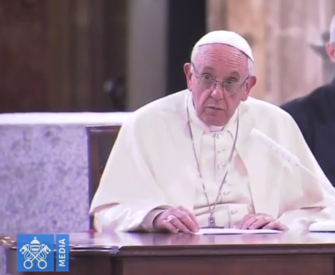 3.
Peter transfigured
3.
Peter transfigured
Jesus asks Peter to discern, and events in Peter’s life then begin to come
together, like the prophetic gesture of the washing of feet. Peter, who
resisted having his feet washed, now begins to understand that true
greatness comes from being lowly and a servant.[7] What a good teacher our
Lord is! The prophetic gesture of Jesus points to the prophetic
Church that, washed of her sin, is unafraid to go out to serve a wounded
humanity. Peter experienced in his flesh the wound of sin, but also of his
own limitations and weaknesses. Yet he learned from Jesus that
his wounds could be a path of
resurrection. To know both Peter disheartened and Peter
transfigured is an invitation to pass from being a Church of the unhappy and
disheartened to a Church that serves all those people who are unhappy and
disheartened in our midst. A Church capable of serving her Lord in those who
are hungry, imprisoned, thirsting, homeless, naked and infirm… (Mt 25:35). A
service that has nothing to do with a welfare mentality or an attitude of
paternalism, but rather with the conversion of hearts. The problem is not
feeding the poor, clothing the naked and visiting the sick, but rather
recognizing that the poor, the naked, the sick, prisoners and the homeless
have the dignity to sit at our table, to feel “at home” among us, to feel
part of a family. This is the sign that the kingdom of heaven is in our
midst. This is the sign of a Church
wounded by sin, shown mercy by the Lord, and made prophetic
by his call.
To renew prophecy is to renew our commitment not to expect an ideal world, an ideal community, or an ideal disciple in order to be able to live and evangelize, but rather to make it possible for every disheartened person to encounter Jesus. One does not love ideal situations or ideal communities; one loves persons. The frank, sorrowful and prayerful recognition of our limitations, far from distancing us from our Lord, enables us to return to Jesus in the knowledge that “with his newness, he is always able to renew our lives and our communities, and even if the Christian message has known periods of darkness and ecclesial weakness, it will never grow old… Whenever we make the effort to return to the source and to recover the original freshness of the Gospel, new avenues arise, new paths of creativity open up, with different forms of expression, more eloquent signs and words with new meaning for today’s world”.[8] How good it is for all of us to let Jesus renew our hearts. When this meeting began, I told you that we came to renew our “yes”, with enthusiasm, with passion. We want to renew our “yes”, but as a realistic “yes”, sustained by the gaze of Jesus. When you return to your homes, I ask you to draw up in your hearts a sort of spiritual testament, along the lines of Cardinal Raúl Silva Henríquez and his beautiful prayer that begins: “The Church that I love is the holy Church of each day… Yours, mine, the holy Church of each day… “Jesus Christ, the Gospel, the bread, the Eucharist, the humble Body of Christ of each day. With the faces of the poor, the faces of men and women who sing, who struggle, who suffer. The holy Church of each day.”
What sort of Church is it that you love?
Do you love this wounded Church that encounters life in the wounds of Jesus?
Thank you for this meeting. Thank you for the chance to say
“yes” once more with you. May Our Lady of Mount Carmel cover you with her
mantle. Please, do not forget to pray for me.
_______________________
[1] Jorge M. Bergoglio, Las Cartas de la tribulación, 9, ed. Diego de
Torres, Buenos Aires, 1987.
[2] Ibid.
[3] Video Message to CELAM for the Extraordinary Jubilee of Mercy on the
American Continent, 27 August 2016.
[4] Apostolic Exhortation Evangelii Gaudium, 94.
[5] Ibid., 96.
[6] SAINT ALBERTO HURTADO, Address to the Young People of Catholic Action,
1943.
[7] “Whoever wants to be first must be last of all and servant of all” (Mk
9:35).
BOLLETTINO N. 0033 – 16.01.2018 18
[8] Apostolic Exhortation Evangelii Gaudium, 11.
https://zenit.org/articles/pope-talks-of-peter-in-meeting-religious-consecrated-seminarians/
Gặp gỡ các vị Giám Mục
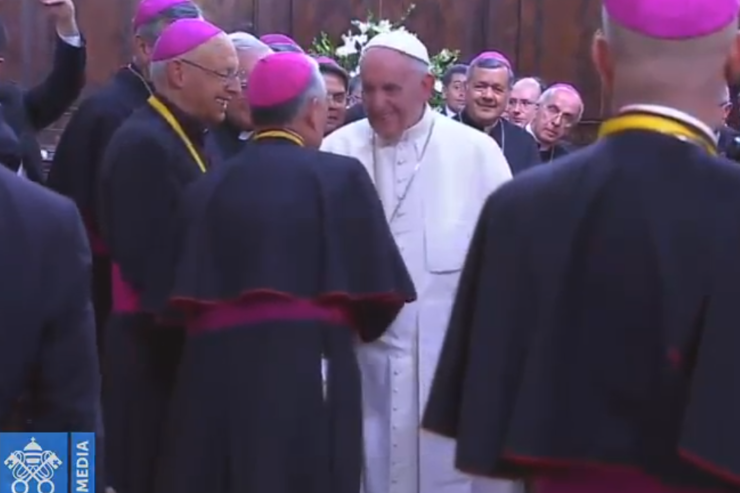
The Holy Father’s Prepared Remarks
Dear Brothers:
I thank you for the greeting that the President of the Conference has offered to me in the name of all present.
Before all else, I would like to greet Bishop Bernardino Piñero Carvallo, who this year celebrates his sixtieth anniversary of episcopal ordination – he is the oldest bishop in the world, not only in age but also in years of episcopate – who was present for four sessions of the Second Vatican Council. A marvelous living memory. Soon a year will have passed since your ad limina visit. Now it is my turn to come and visit you. I am pleased that our meeting follows that with our consecrated men and women, for one of our principal tasks is precisely to be close to consecrated life and to our priests. If the shepherd wanders off, the sheep too will stray and fall prey to any wolf that comes along. The fatherhood of the bishop with his presbyterate! A fatherhood that neither paternalism nor authoritarianism, but a gift to be sought. Stay close to your priests, like Saint Joseph, with a fatherhood that helps them to grow and to develop the charisms that the Holy Spirit has wished to pour out upon your respective presbyterates.
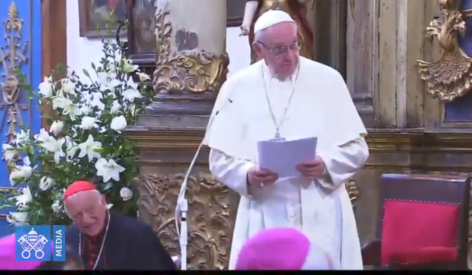 I
know that ours is a brief meeting, but I
would like to reiterate some of the points I made during our meeting in Rome.
I can sum them up in the following phrase:
the consciousness of being a people.
I
know that ours is a brief meeting, but I
would like to reiterate some of the points I made during our meeting in Rome.
I can sum them up in the following phrase:
the consciousness of being a people.
One of the problems facing our societies today is the sense of being orphaned, the feeling of not belonging to anyone. This “postmodern” feeling can seep into us and into our clergy. We begin to think that we belong to no one; we forget that we are part of God’s holy and faithful people and that the Church is not, nor will it ever be, an élite of consecrated men and women, priests, and bishops. Without this consciousness of being a people, we will not be able to sustain our life, our vocation and our ministry. To forget this – as I said to the Commission for Latin America – “carries many risks and distortions in our own experience, as individuals and in community, of the ministry that the Church has entrusted to us”.[1] The lack of consciousness of belonging to God’s people as servants, and not masters, can lead us to one of the temptations that is most damaging to the missionary outreach that we are called to promote: clericalism, which ends up as a caricature of the vocation we have received.
A failure to realize that the mission belongs to the entire Church, and not to the individual priest or bishop, limits the horizon, and even worse, stifles all the initiatives that the Spirit may be awakening in our midst. Let us be clear about this. The laypersons are not our peons, or our employees. They don’t have to parrot back whatever we say.
“Clericalism, far from giving impetus to various contributions and proposals, gradually extinguishes the prophetic flame to which the entire Church is called to bear witness. Clericalism forgets that the visibility and the sacramentality of the Church belong to all the people of God (cf. Lumen Gentium, 9-14), not only to the few chosen and enlightened”.[2]
Let us be on guard, please, against this temptation, especially in seminaries and throughout the process of formation. Seminaries must stress that future priests be capable of serving God’s holy and faithful people, acknowledging the diversity of cultures and renouncing the temptation to any form of clericalism. The priest is a minister of Jesus Christ: Jesus is the protagonist who makes himself present in the entire people of God. Tomorrow’s priests must be trained with a view to the future, since their ministry will be carried out in a secularized world. This in turn demands that we pastors discern how best to prepare them for carrying out their mission in these concrete circumstances and not in our “ideal worlds or situations”. Their mission is carried out in fraternal unity with the whole People of God. Side by side, supporting and encouraging the laity in a climate of discernment and synodality, two of the essential features of the priest of tomorrow. Let us say no to clericalism and to ideal worlds that are only part of our thinking, but touch the life of no one.
And in this regard, to beg, to implore from the Holy Spirit the gift of dreaming and working for a missionary and prophetic option capable of transforming everything, so that our customs, ways of doing things, times and schedules, language and ecclesial structures can be suitably channelled for the evangelization of Chile rather than for ecclesiastical self-preservation. Let us not be afraid to strip ourselves of everything that separates us from the missionary mandate.[3]
Dear brothers, let us commend ourselves to loving protection of Mary, Mother
of Chile. Let us pray together for our presbyterates and for our consecrated
men and women. Let us pray for God’s holy and faithful people.
______________________
[1] Letter to Cardinal Marc Ouellet, President of the Pontifical Commission
for Latin America (21 March 2016).
[2] Ibid.
BOLLETTINO N. 0034- 16.01.2018 7
[3] Cf. Apostolic Exhortation Evangelii Gaudium, 27.
https://zenit.org/articles/chile-pope-reminds-bishops-they-are-part-of-gods-people/
NGÀY 15/1 THỨ HAI
08:00 Rời Roma trên chiếc phản lực cơ Boeing B777
http://www.vaticannews.va/en/pope/news/2018-01/chile-journey-video-pope-departure-rome.html#play
(đoạn video clip ĐTC ra phi trường và lên máy bay)
|
Greeting to journalists on the flight to Chile
(Cái link này bao gồm cả hình chụp, hình quay và bài nói bằng văn tự của ĐTC)
|
20:10 Đến Phi Trường Santiago Chile sau gần 16 tiếng bay
(Cái link này bao gồm cả hình chụp và hình quay về ĐTC)
21:00 Về Tòa Khâm Sứ Tòa Thánh nghỉ đêm
-k7B-U11011923542863UkC-1024x576@LaStampa.it.jpg)
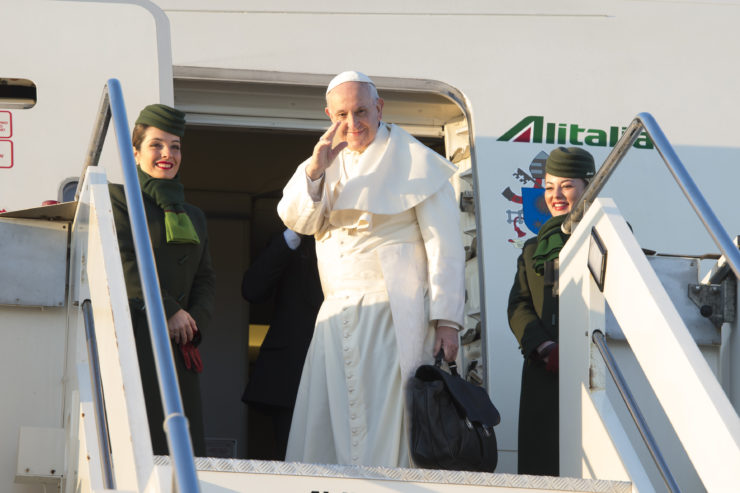
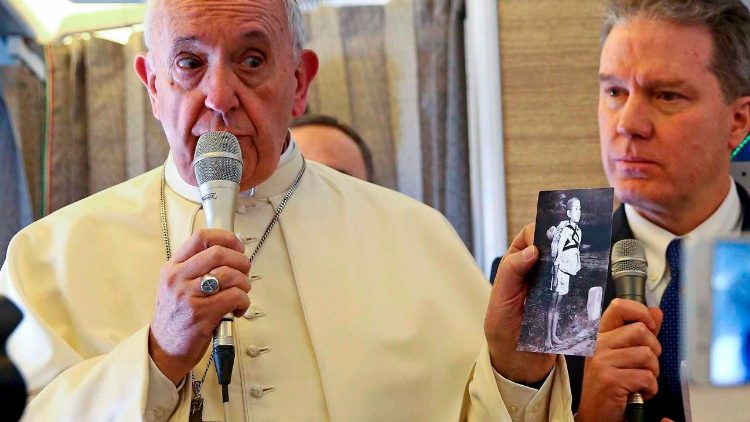
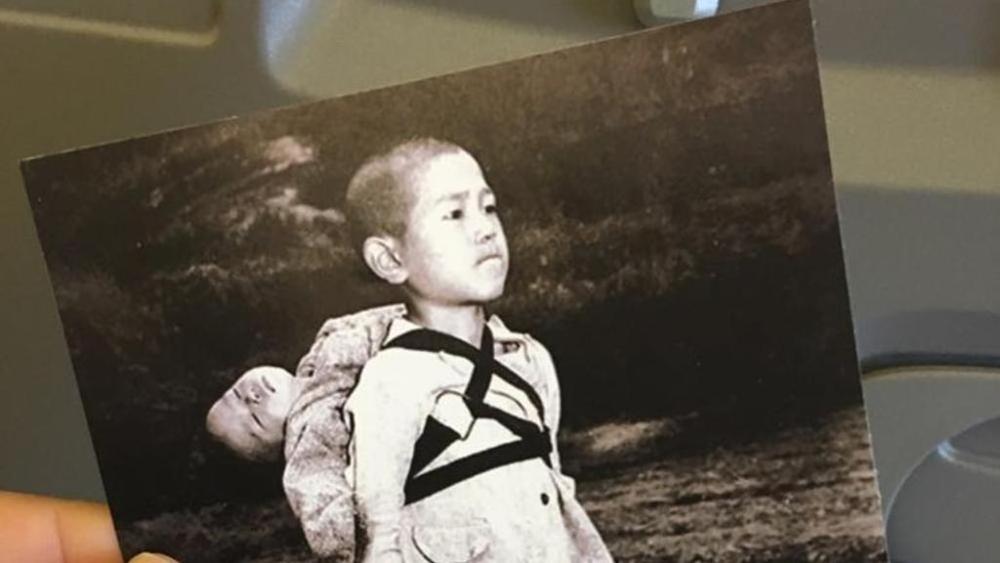
Sau khi được vị giám đốc văn phòng báo chí của Tòa Thánh giới thiệu, ĐTC Phanxicô đã ngỏ lời cùng phái đoàn 70 phóng viên truyền thông tháp tùng trên cùng chuyến máy bay với ngài.
Trước hết, ngài cho biết về chuyến bay: "Họ nói với tôi ở phi trường Alitalia rằng chuyến bay từ Roma đến Santiago là chuyến bay thẳng dài nhất của họ: 15 tiếng 40 hay 20 phút gì đó... tôi không rõ. Chúng ta sẽ có giờ để nghỉ ngơi, làm việc, rất là nhiều chuyện để làm".
Sau đó, ngài cho biết về mối liên hệ của ngài với hai quốc gia của chuyến tông du: "Cám ơn các bạn sẽ phải gay go làm việc: 3 ngày ở nước này và 3 ngày ở nước kia... Đối với tôi thì ở Chile không có gì là khó khăn lắm, bởi tôi đã học ở đó 1 năm, tôi có nhiều bạn hữu và tôi biết rõ - tức là tôi biết nhiều hơn... Còn ở Peru thì tôi biết ít, vì tôi đã đến đó 2-3 lần để tham dự hội nghị, hội họp ..."
Sau hết về chính tấm hình của nhiếp ảnh gia Hoa Kỳ Joseph Roger O'Donnell được phân phối cho họ: "Tôi tình cờ thấy được tấm hình này. Nó được chụp vào năm 1945; ở phần sau là chi tiết vế nó. Đó là một em trai đang đeo tên lưng của mình đứa em đã chết, đứng xếp hàng trước lò hỏa táng ở Nagasaki, sau khi bom nguyên tử nổ. Tôi cảm thấy xúc động khi nhìn tấm hình này, bởi vậy tôi chỉ dám viết rằng 'Hậu quả của chiến tranh'. Tôi nghĩ nên in nó ra và trao tặng nó, vì một tấm hình như thế này hơn muôn ngàn lời nói. Bởi vậy mà tôi muốn chia sẻ nó với anh chị em".
Sau cùng ngài đi chào từng người phóng viên truyền thông (70 người, trong đó có 12 người mới từ Chile và Peru), và khi có người hỏi ngài rằng ngài có sớ chiến tranh nguyên tử hay chăng thì ngài đáp: "Có chứ, tôi thật sự là lo sợ. Chúng ta đang ở vào tận điểm của nó, chỉ cần xẩy ra một rủi ro nào đó là xong. Chúng ta không thể nào để cho tình trạng này rơi xuống đầu mình. Chúng ta cần phải hủy hoại các thứ vũ khí nguyên tử".
APOSTOLIC JOURNEY OF HIS
HOLINESS POPE FRANCIS
TO CHILE AND PERU
15-22 JANUARY 2018
 |
 |
CHILE
Monday, 15 January 2018
ROME - SANTIAGO
| 8.00 | Departure by plane from Rome/Fiumicino Airport for Santiago |
| 20.10 | Arrival at Santiago International Airport |
| Welcome ceremony | |
| 21.00 | Arrival of the Holy Father at the Apostolic Nunciature |
Tuesday, 16 January 2018
SANTIAGO
| 8.20 | Meeting with Authorities, the Civil Society and the Diplomatic Corps in La Moneda Palace |
| 9.00 | Courtesy visit to the President in the "Blue room" of La Moneda Palace |
| 10.30 | Holy Mass in OʼHiggins Park |
| 16.00 | Short visit to the Female Central Penitentiary of Santiago |
| 17.15 | Meeting with Priests, Religious Men and Women, Consecrated and Seminarians in the Cathedral of Santiago |
| 18.15 | Meeting with the Bishops in the Sacristy of the Cathedral |
| 19.15 | Private Visit to the Shrine dedicated to Saint Alberto Hurtado, S.J. |
| Private Meeting with the priests of the Society of Jesus |
Wednesday, 17 January 2018
SANTIAGO-TEMUCO-SANTIAGO
| 8.00 | Departure from Santiago Airport for Temuco |
| 10.30 | Holy Mass at Maquehue Airport |
| 12.45 | Lunch with inhabitants of the Araucanìa Region in the house “Madre de la Santa Cruz” |
| 15.30 | Departure from Temuco Airport for Santiago |
| 17.00 | Arrival at Santiago Airport |
| 17.30 | Meeting with the youth in the Shrine of Maipù |
| 18.30 | Transfer in closed vehicle to the Pontifical Catholic University of Chile |
| 19.00 | Visit to the Pontifical Catholic University of Chile |
Thursday, 18 January 2018
SANTIAGO-IQUIQUE-LIMA
| 8.05 | Departure from Santiago Airport for Iquique |
| 10.35 | Arrival at Iquique International Airport |
| 11.30 | Holy Mass in Lobito Campus |
| 14.00 | Lunch with the Papal Entourage at the “Casa de retiros del Santuario Nuestra Señora de Lourdes” of the Oblates of the Virgin Mary |
| 16.45 | Arrival at Iquique International Airport |
| Farewell ceremony | |
| 17.05 | Departure from Iquique International Airport for Lima |
PERU
| 17.20 | Arrival at Lima Airport |
| Welcome ceremony |
Friday, 19 January 2018
LIMA-PUERTO MALDONADO-LIMA
| 8.30 | Departure from Lima Airport for Puerto Maldonado |
| 10.15 | Arrival at Puerto Maldonado Airport |
| 10.30 | Meeting with indigenous people of the Amazon region in the "Coliseo Regional Madre de Dios" |
| 11.30 | Meeting with the population at Jorge-Basadre-Institute |
| 12.15 | Visit to "Hogar Principito" Childrenʼs Home |
| 13.15 | Lunch with representatives of the peoples of Amazonia in the Pastoral Centre "Apaktone" |
| 14.35 | Departure by plane for Lima |
| 16.10 | Arrival at Lima Airport |
| 16.20 | Visit to the Airbase Chapel |
| 16.45 | Meeting with Authorities, the Civil Society and the Diplomatic Corps in the Government Palaceʼs Honour Yard |
| 17.15 | Courtesy visit to the President in the Ambassadorsʼ Salon of the Government Palace |
| 17.55 | Private meeting with members of the Society of Jesus in "San Pedro" Church |
Saturday, 20 January 2018
LIMA-TRUJILLO-LIMA
| 7.40 | Departure by plane for Trujillo |
| 9.10 | Arrival at Trujillo Airport |
| 10.00 | Holy Mass at the waterfront esplanade of Huanchaco |
| 12.15 | Transfer by Popemobile across Limaʼs “Buenos Aires” district |
| 15.00 | Short visit to the Cathedral |
| 15.30 | Meeting with the Priests, Religious Men and Women and Seminarians of the Ecclesiastical Provinces of Northern Peru in the "Colegio Seminario SS. Carlos y Marcelo" |
| 16.45 | Marian Celebration – Virgen de la Puerta in "Plaza de Armas" square |
| 18.15 | Departure by plane for Lima |
| 19.40 | Arrival at Lima Airport |
Sunday, 21 January 2018
LIMA- ROME
| 9.15 | Terce Prayer with Contemplative Sisters at Limaʼs Lord of the Miracles Shrine |
| 10.30 | Prayer in front of the relics of the Peruvian Saints in the Cathedral of Lima |
| 10.50 | Meeting with the Bishops in the Archbishop’s Palace |
| 12.00 | Angelus Prayer in “Plaza de Armas” square |
| 12.30 | Lunch with the Papal Entourage in the Apostolic Nunciature |
| 16.15 | Holy Mass at Las Palmas Air Base |
| 18.30 | Arrival at the airport |
| Farewell ceremony | |
| 18.45 | Departure by plane for Rome/Ciampino |
Monday, 22 January 2018
ROME
| 14.15 | Arrival at Rome/Ciampino Airport |
__________________
| Time zones | |
| Rome: | + 1h UTC |
| Santiago (CHILE): | -3h UTC |
| Temuco (CHILE): | -3h UTC |
| Iquique (CHILE): | -3h UTC |
| Lima (PERU): | -5h UTC |
| Puerto Maldonado (PERU): | -5h UTC |
| Trujillo (PERU): | -5h UTC |